THE HARVARD CRIMSON
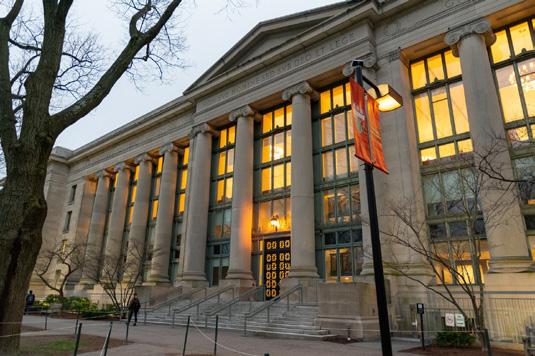
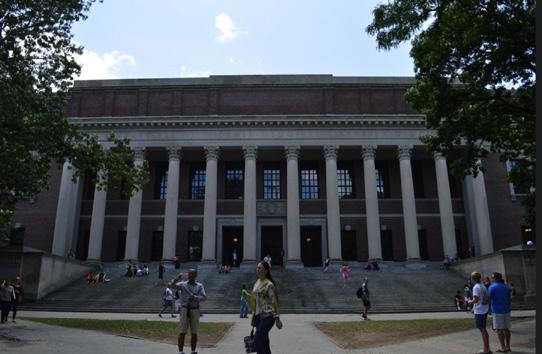
The Editorial Board’s Overseer Endorsements
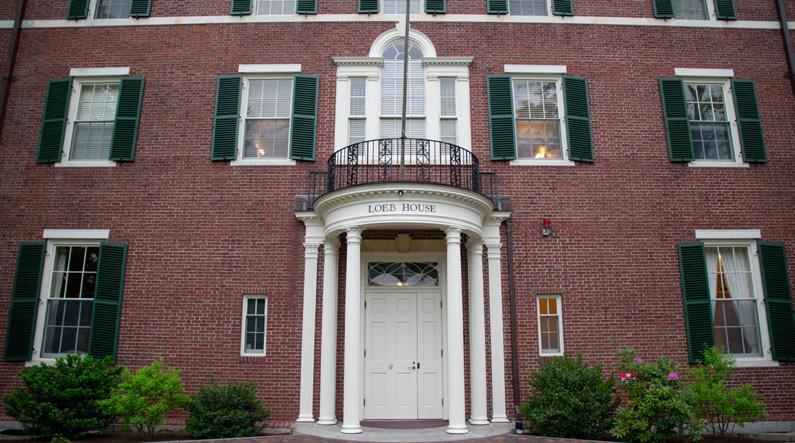
Former Harvard Fencer Heads to 2024 Paris Olympics
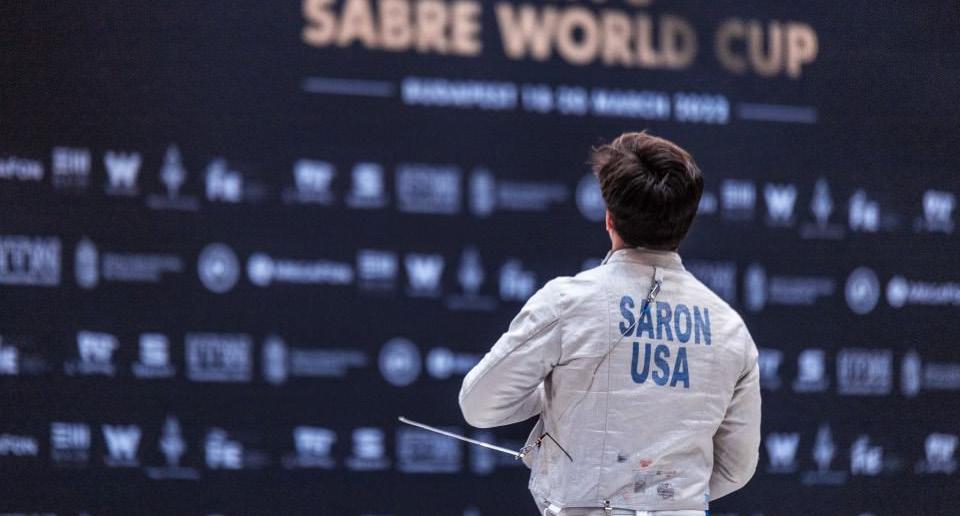

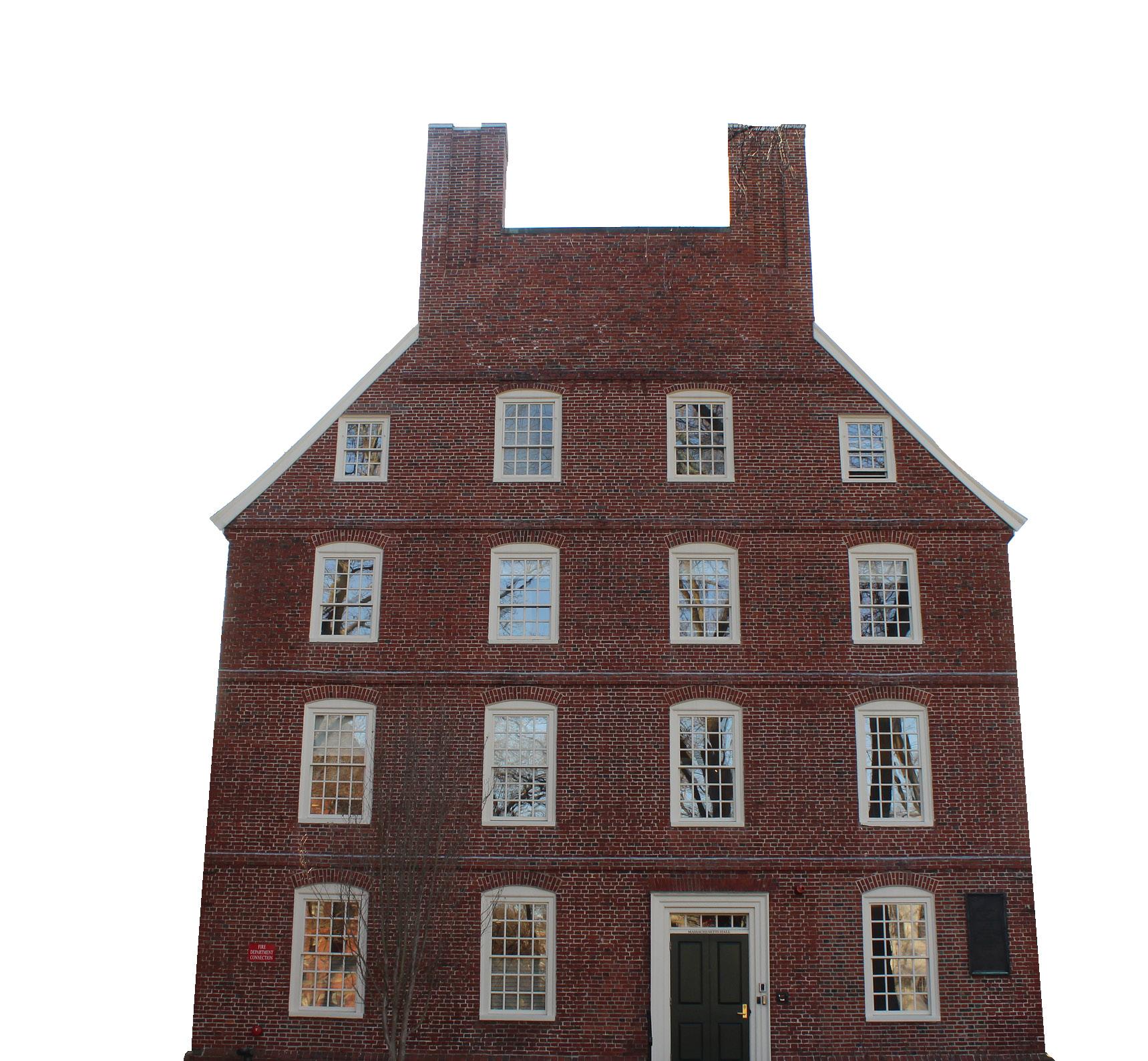
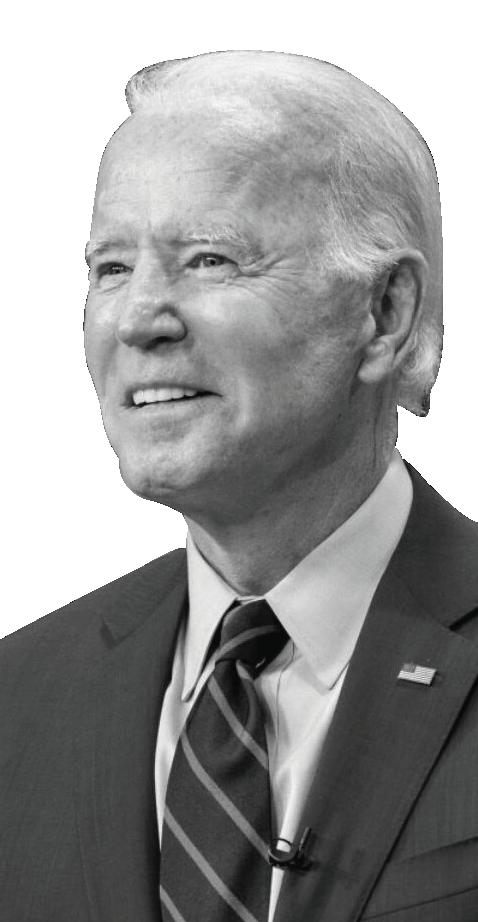

Interim Harvard President Alan M. Garber ’76 has publicly pushed back against suggestions that the University is facing a fundraising crisis.
But in private, Garber has struck a different tone with alumni and donors, acknowledging during a spring break trip to London and Miami that donations have fallen substantially in the months since Oct. 7.
While Harvard will not release its total donations until October, six people with knowledge of its fundraising efforts said donations are expected to considerably drop this year. The decline comes as some of the University’s top donors have cut ties
over its response to the Israel-Hamas war and allegations of antisemitism on campus. Harvard spokesperson Jason A. Newton wrote in a statement that “this has been a challenging time and a period of transition for the Harvard community.” Garber and other administrators have addressed campus tensions and University initiatives with alumni in regularly scheduled events and meetings over the last three months, according to Newton. Eduardo J. Dominguez ’01, who met with Garber in Miami, said that while he is optimistic for a “strong rebound” in fundraising, longer-term enthusiasm for donating is likely an area of concern. Dominguez, a Harvard club director in Florida and Harvard Alumni Association board member, said Garber discussed the fundraising concerns but also maintained
that disillusioned donors had not forever turned their back on Harvard.
“He kind of shared the same sentiment that he was getting as far as input from major donors basically turning their back on Harvard,” Dominguez said. “There is just a general sense of maybe a lower commitment level on a long term basis.”
“It makes engagement a little bit more challenging,” he added.
But one donor who serves on the Harvard College Fund said reunion gifts are also expected to be impacted by recent controversy.
Class committees started planning for reunion gifts in September and began to approach potential donors in January and February, all while Harvard’s leadership crisis dominated national headlines and remained the focus of public scrutiny.
Another donor said she halted dona-
tions to the University over its response to the Oct. 7 attack on Israel and told her representative in Harvard’s development office to not contact her until she feels ready to resume donations. “He tried to reach me once and I told him: ‘Do not,’” the donor said.
But even as many of Harvard’s longtime supporters are hesitant to resume donations, several people with knowledge of the University’s fundraising efforts said it will take years to see the full impact of last fall’s donor revolt.
The prevalence of multi-year pledges will likely soften immediate sharp dives in donations, as donors fulfill past commitments, according to one donor. Newton, the Harvard spokesperson, wrote in a statement that the University
“Generally, people left
Six months after Harvard’s slow response to Hamas’ attack on Israel sparked an onslaught of criticism, interim President Alan M. Garber ’76 formed a working group to explore whether the University should have spoken out in the first place. Garber announced the creation of an “Institutional Voice Working Group” and an “Open Inquiry and Constructive Dialogue Working Group” in an email to affiliates Thursday afternoon.
Both groups will be overseen by interim Harvard Provost John F. Manning ’82, who has received praise from faculty at Harvard Law School for his policy as dean to avoid taking official stances on public issues and for his efforts to enhance free speech protections. The twin working groups mark Garber’s latest effort to protect free speech and avoid a repeat of last fall, when the University’s administration was widely condemned for its initial response to the Israel-Hamas war that struggled to strike the right tone in its messaging to a campus deeply divided by the conflict.
“In recent months and years, we have heard clearly that many in our community feel constrained in their ability to express their views on critically important questions,” Garber and Manning wrote in a joint email. “More and more members of our community have also asked whether and when the University should use its official voice to address matters of social and political significance.” “We are convening two working groups to examine these issues and recommend how the University can most effectively nurture and reinforce a culture of open inquiry, constructive dialogue, and academic freedom,” he added. The announcement is also the latest
Interim President Alan M. Garber ’76 planned to briefly address Harvard Muslim affiliates during a Friday iftar event. Instead, he faced a grilling. Tough questions from Harvard students about a perceived lack of support from the University’s administration for Muslim and Arab affiliates turned Garber’s 15-minute appearance into an impromptu interrogation. The students asked Garber about the University’s stance on the Israel-Hamas war and the University’s handling of doxxing attacks against Muslim and Arab students. They also criticized what they saw as a repression of pro-Palestinian speech by Garber’s administration. Asmer A. Safi ’24, who attended the event, described Garber’s responses as “non-answers.”
THE UNIVERSITY DAILY, EST. 1873 | VOLUME CLI, NO. 10 | CAMBRIDGE, MASSACHUSETTS | FRIDAY, APRIL 5, 2024
PAGE 17 PAGE 10 SPORTS OPINION
the session frustrated with his ability to go without having answered any of the questions directly,” Safi wrote in a statement. At iftar, a meal Muslims eat after sunset to break their fast during Ramadan, Garber asked attendees to “work
co-chairs,
Ijaz Khwaja
professor Ali S.A. Asani ’77, who moderated the discussion. “At times like these, when we confront ignorance and hate in a university dedicated to their opposites, when we see division in the world reflected in conflict on our own campus — when, indeed, so many in our community endure indescribable suffering, pain, and loss — now more than ever, we must redouble our commitments to embracing one another and to making In Public, Garber Maintains Harvard’s Financial Strength. In Private, He Strikes a Different Tone. SEE PAGE 4 UNIVERSITY FINANCES INSTITUTIONAL NEUTRALITY CENTRAL ADMIN SEE PAGE 4 SEE PAGE 5 Students Targeted by Doxxing Truck ATTACKS. Harvard Law School students and student government leaders faced doxxing attacks after the passage of a resolution calling on Harvard to divest from “illegal Israeli settlements.” LETTER. Harvard accepted 1,937 students to the College Class of 2028. New admits reacted with a mixure of shock and joy to the news, celebrating the news with family and friends. SEE PAGE 4 SEE PAGE 5 Class of 2028 Reacts to Harvard Acceptance LAW SCHOOL ADMISSIONS 24 College Juniors Inducted to PBK Society SELECTION. Phi Beta Kappa, the nation’s oldest academic honor society, invited 24 Harvard College juniors to join its ranks. Tapped students reacted with surprise and excitement to the news. SEE PAGE 6 ACADEMICS LEADERSHIP. As Harvard faced turmoil in the top ranks of its administration, its lesser known Cambridge neighbor slid into a leadership crisis of its own, with faculty layoffs and criticism of its president. SEE PAGE 8 Crisis at Lesley University CAMBRIDGE Garber Forms Groups to Explore Open Inquiry Garber Grilled by Students at Iftar Event BY EMMA H. HAIDAR AND CAM E. KETTLES CRIMSON STAFF WRITERS BY EMMA H. HAIDAR AND CAM E. KETTLES CRIMSON STAFF WRITERS BY EMMA H. HAIDAR AND CAM E. KETTLES CRIMSON STAFF WRITERS PRESIDENTIAL ELECTION The Politics of Harvard’s 31st Presidential Search ELECTION. As the U.S. presidential election approaches, Harvard insiders and experts said another four years of former U.S. President Donald Trump would sway the Harvard presidential search and inflame political attacks on the University. SEE PAGE 7 SAMI E. TURNER — CRIMSON DESIGNER
together” to combat division. The event was attended by more than 100 people, including two of the task force’s
Harvard Kennedy School professor Asim
and Middle Eastern Studies
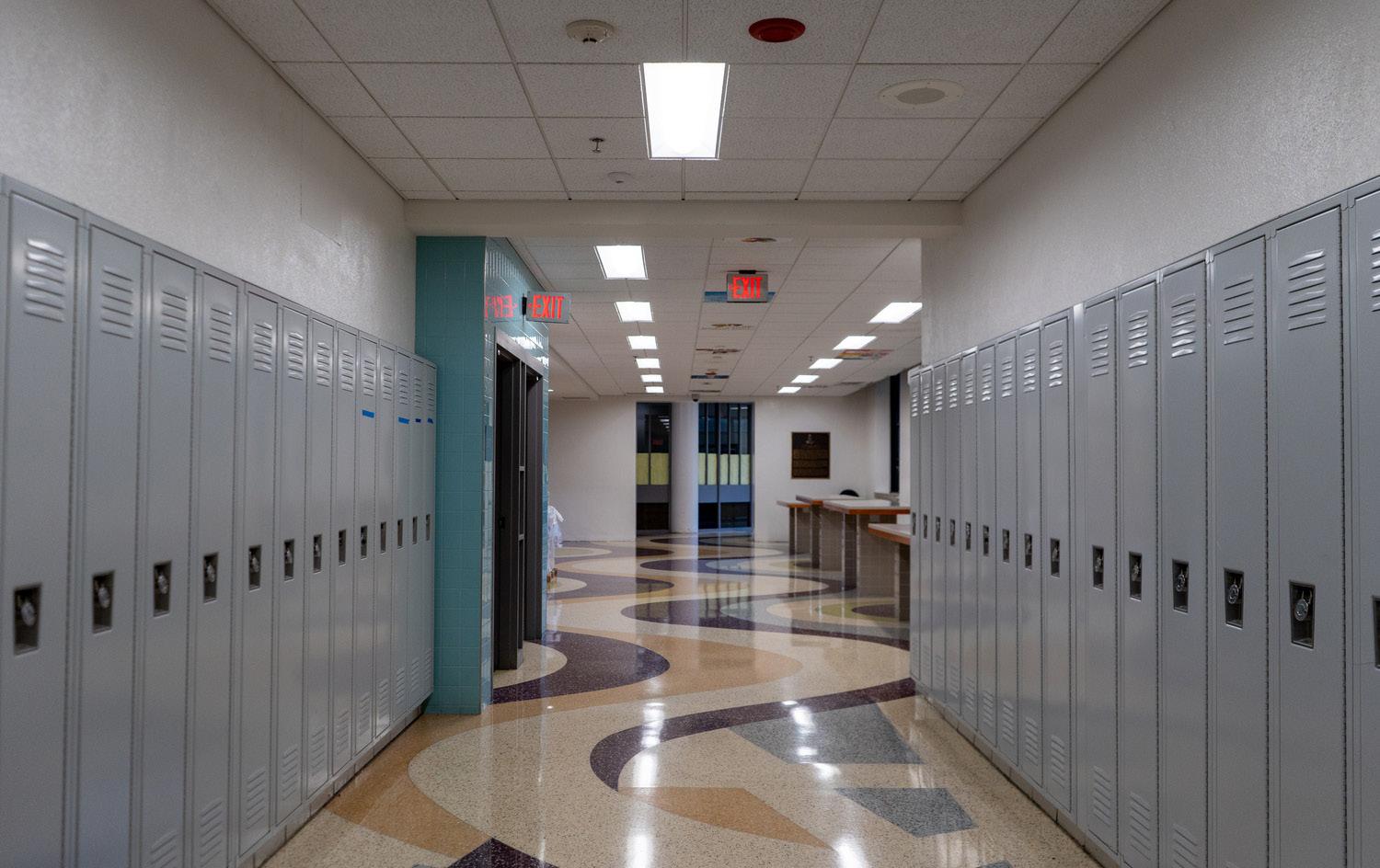

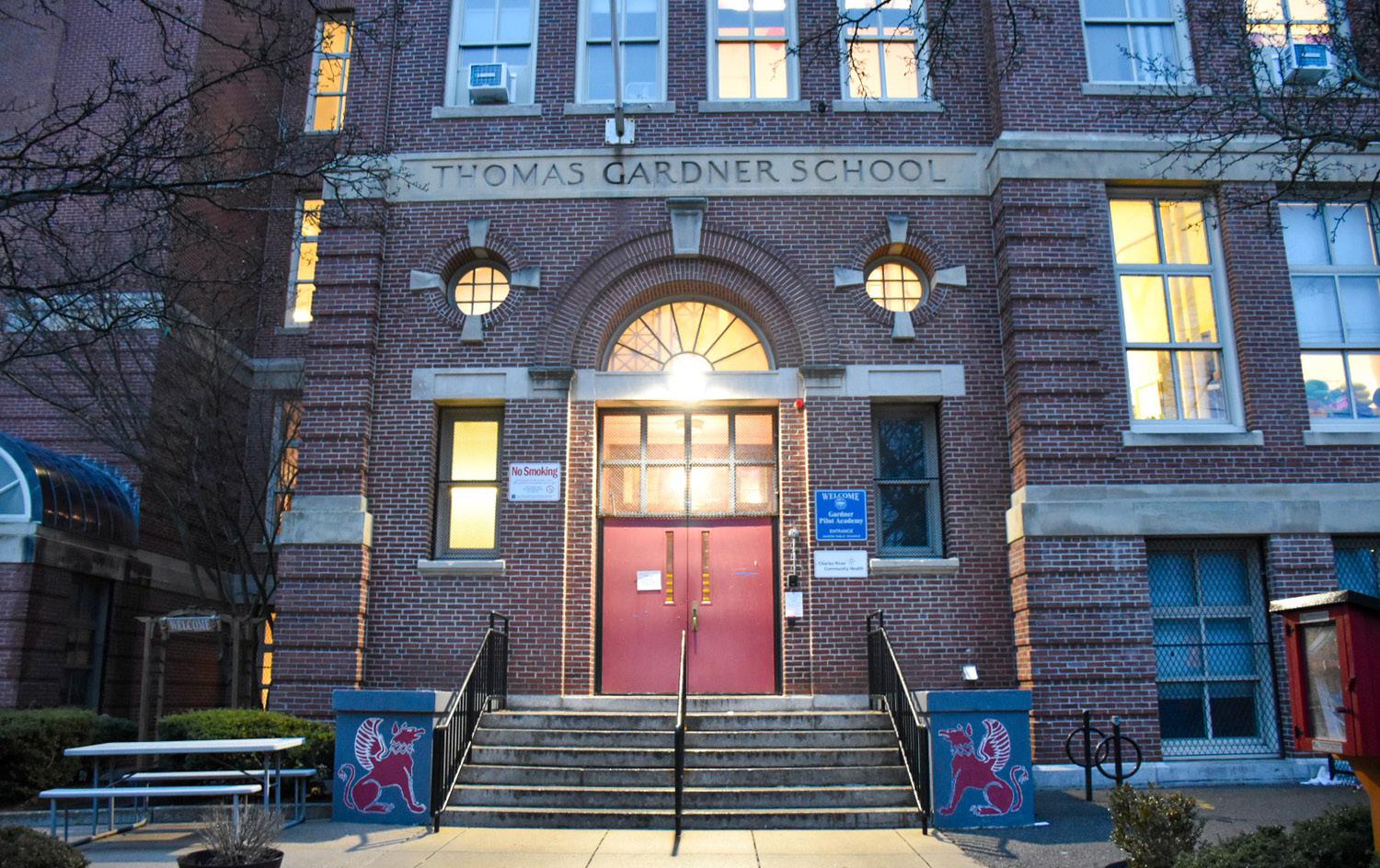


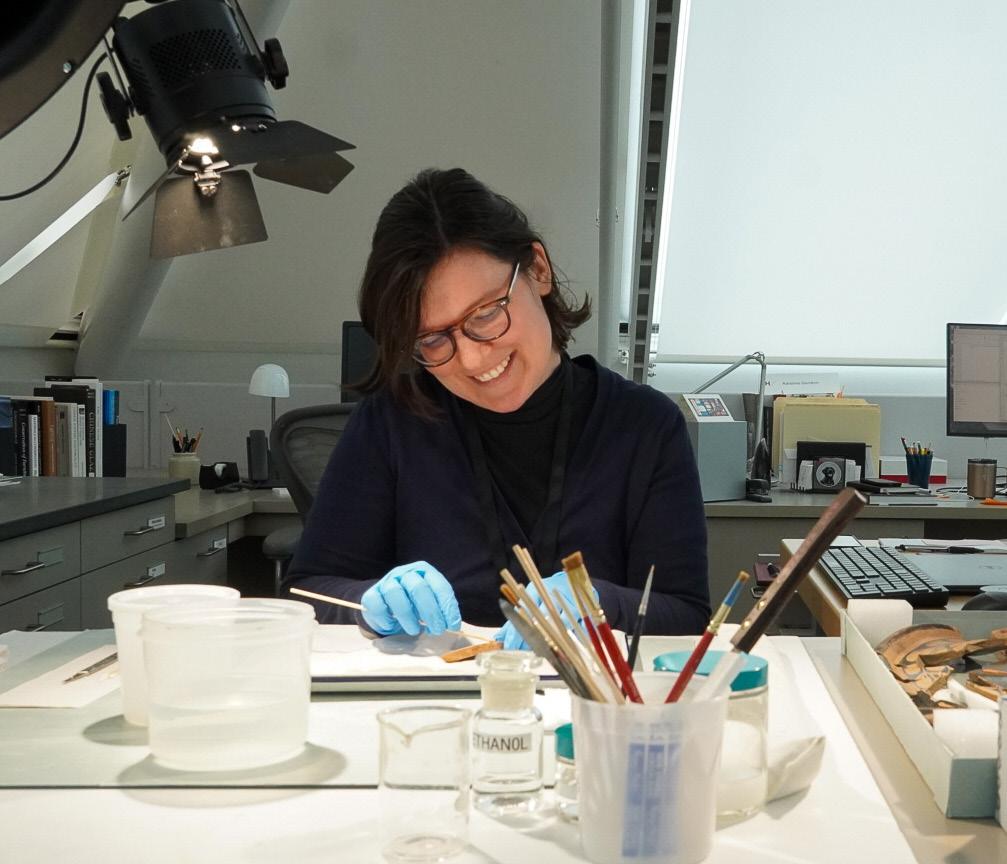
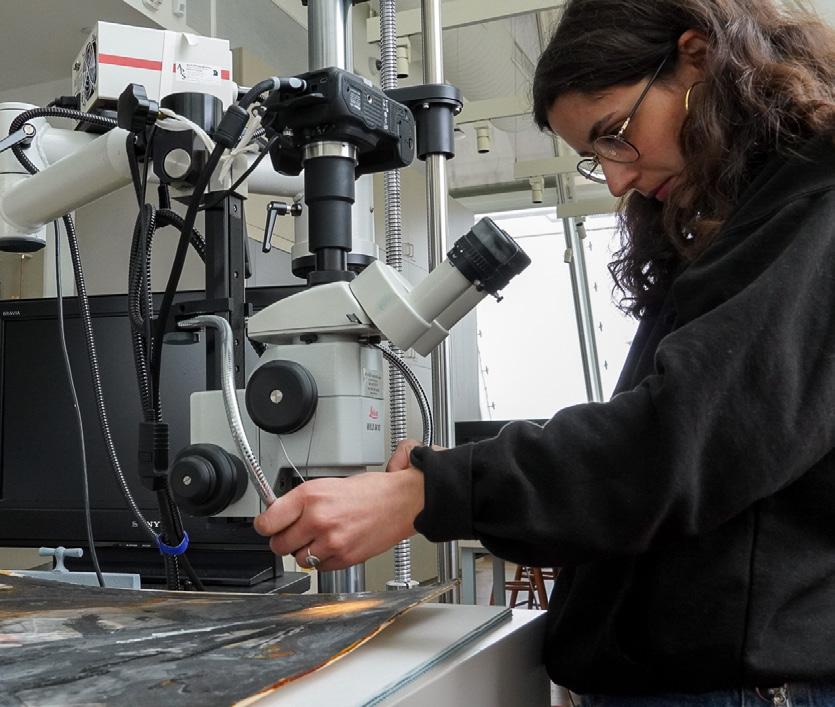
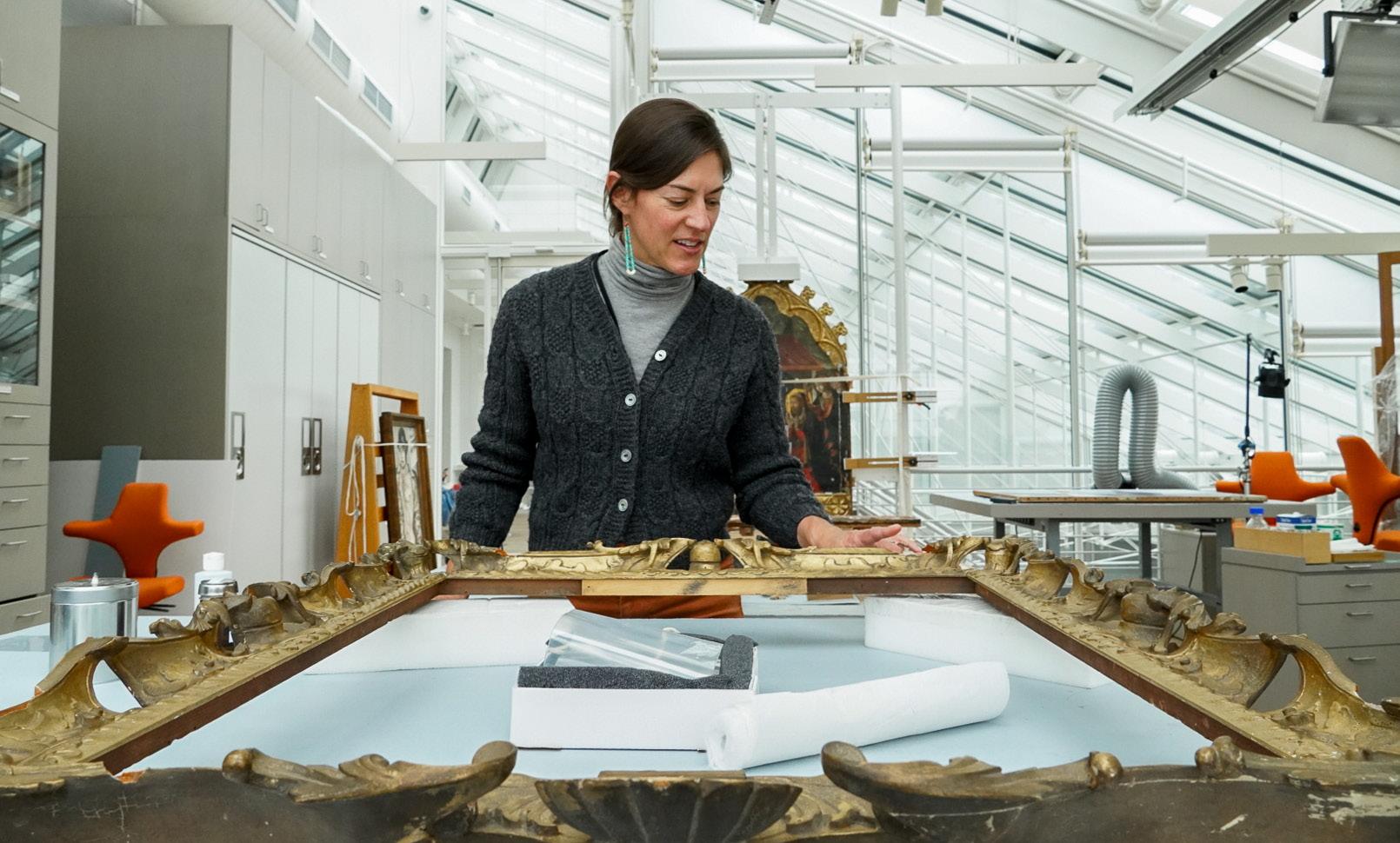
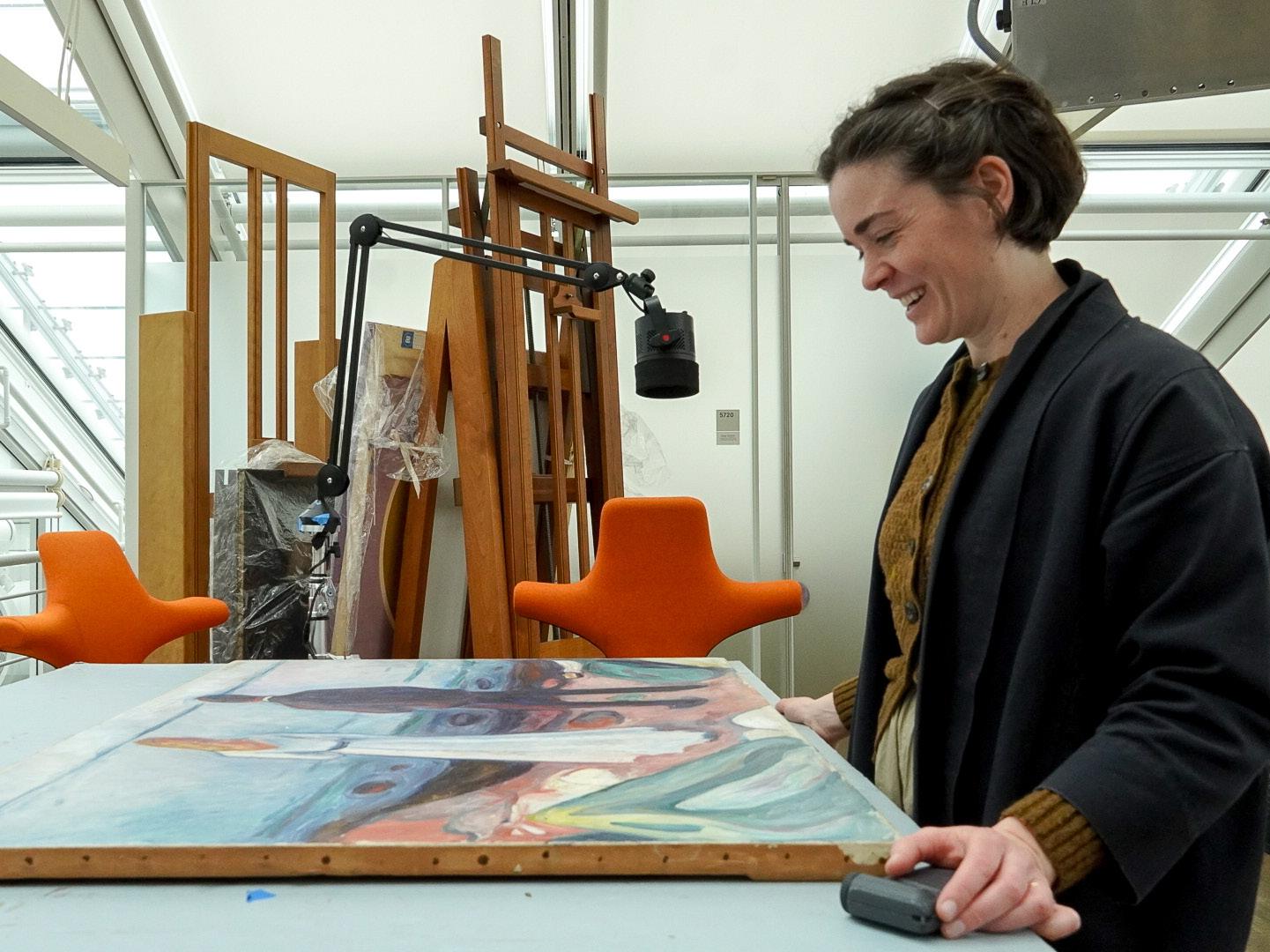


In Photos: The Art of Conservation at the Straus Center Objects conservation fellow Adrienne M. Gendron treats a Greek amphora. She remarks on the difficulty of color-matching the black glaze on the piece, which was used as a storage jar around 570–550 B.C.E. CONSERVATION IN ACTION On the top floors of the Harvard Art Museums at the Straus Center for Conservation and Technical Studies, a dedicated team of conservators care for approximately 250,000 pieces in the museum’s collections. In this photo essay, Crimson photographer Lotem L. Loeb goes behind the scenes at the conservation labs, documenting the meticulous preservation work and the stories of the staff specialists. BY LOTEM L. LOEB — CRIMSON PHOTOGRAPHER LAST WEEK 2 APRIL 5, 2024 THE HARVARD CRIMSON Principal Loss Leaves School Reeling Councilor Stages Billboard Prank Accidental Firearm Discharge at CRLS BOSTON SCHOOLS CAMBRIDGE CITY COUNCIL CAMBRIDGE PUBLIC SCHOOLS STILL REELING. Gardner Pilot Academy’s longtime principal, Erica Herman, was forced out in December for allegedly violating Boston Public School reporting policy. Since then, parents and some staff have maintained that the former principal transformed Gardner for the better, commending her emphasis on restorative justice practices and mediating rather than punishing student conflict. Many of Gardner’s teachers have kept quiet support for the change of leadership. BY JINA H. CHOE AND JACK R. TRAPANICK —CRIMSON STAFF WRITERS, PHOTO BY A. SKYE SCHMIEGELOW — CRIMSON PHOTOGRAPHER APRIL FOOLS’. Cambridge City Councilor Burhan Azeem has a “400-year-old grudge against Boston” — and it’s no laughing matter. Azeem rolled out his proposal for a “MegaCambridge” on Monday, spending $5,000 of his own campaign money to erect 77 billboards calling for Cambridge to annex Boston. To spread the word about his next big proposal — a hoax in honor of April Fools’ Day — Azeem blasted messages across billboards. BY AYUMI NAGATOMI AND AVANI B. RAI — CRIMSON STAFF WRITERS, PHOTO BY ERICK CONTRERAS-RODRIGUEZ — CRIMSON PHOTOGRAPHER FIREARM DISCHARGE. A member of the Cambridge Police Department accidentally discharged his firearm at the Cambridge Rindge and Latin High School at approximately 1:45 p.m. on Tuesday afternoon, city officials said. The CPD Youth Resource Officer discharged the firearm in a staff bathroom on the first floor of the high school, according to a joint press release from CPD and Cambridge Public Schools. No individuals were injured in the incident. BY SALLY E. EDWARDS AND ASHER J. MONTGOMERY —CRIMSON STAFF WRITERS, PHOTO BY JOEY HUANG — CRIMSON PHOTOGRAPHER AROUND THE IVIES Princeton’s board of trustees adopted the budget for the 2024-25 school year on March 29. They school allocated $3.1 billion for the operational budget, a 6.2 percent increase from the previous year, the Daily Princetonian reported Wednesday. The financial aid allocation increased from $268 million to $279 million. The new aid budget follows a plan to increase the undergraduate student population receiving need-based financial aid to 70 percent. THE DAILY PRINCETONIAN Yale and nine other universities settled in a class action lawsuit on alleged price-fixing behavior to limit student’s need-based financial aid, the Yale Daily News reported Sunday. The U.S. District Court for the Northern District of Illinois announced that any student who received need-based financial aid over the past 20 years is eligible to receive a partial payment from a $284 million settlement. Yale settled for $18.5 million in January but denied allegations of wrongdoing. THE YALE DAILY NEWS Brown Faculty voted in favor of converting the Watson Institute for International and Public Affairs into a school, with a 72 percent approval rate. After receiving approval from the University’s highest governing board, the school will be officially established on July 1, 2025. Still, Faculty Executive Committee raised concerns over diversion of resources from the existing departments for funding the new school. THE BROWN DAILY HERALD Dartmouth Hitchcock Medical Center’s nurses began organizing for unionization, according to the Dartmouth. Nurses cited experiences of “burnout,” “lack of respect” and “lack of support,” as well as high turnover rates for the unionization launch. A group of nurses began distributing fliers in early March. Now, they are holding meetings four times per week to gather signatures in support of unionization, which will be submitted to the National Labor Relations Board. THE DARTMOUTH Marylyn Ritchie, director of Penn’s Institute for Biomedical Informatics and Division of Informatics and a genetics professor, will serve as the inaugural vice dean of Artificial Intelligence and Computing for the Perelman School of Medicine, the Daily Pennsylvanian reported Tuesday. The new vice dean role will be charged with developing and implementing AI strategies across the institute’s research, education, and healthcare delivery. Ritchie will also serve as an ambassador for AI connections across Penn’s schools, hospitals, and centers. THE DAILY PENNSYLVANIAN PRINCETON INCREASES FINANCIAL AID BUDGET FORMER YALE FINANCIAL AID RECIPIENTS MAY RECEIVE SETTLEMENT POST LAWSUIT FACULTY VOTE TO ESTABLISH SCHOOL OF INTERNATIONAL AND PUBLIC AFFAIRS AT BROWN NURSES AT DARTMOUTH HITCHCOCK MEDICAL CENTER BEGIN UNIONIZATION EFFORTS UPENN MEDICAL SCHOOL APPOINTS FIRST VICE DEAN OF AI AND COMPUTING In the Objects Lab, conservation junior fellow Madison A. Conliffe uses acetone to clean Jean Baptiste Carpeaux’s painted plaster sculpture from 1870, “Why Born a Slave!” Associate conservator of objects and sculpture Nicole D. Ledoux treats a disassembled Greek bell krater, cleaning each piece individually in preparation for reassembly. Lucille Bonnier, an intern in photograph conservation from France, begins to inspect an Anselm Kiefer mixed media on gelatin silver photograph from 1981 under the microscope. In the luminous Paintings Lab, associate frames conservator Allison Jackson stands beside a historically accurate frame for a Jankel Adler painting, seen tied to a shelf in the back left. As acquisitions often change hands and frames, Jackson’s role is to decipher what the original framing may have been and find something akin. Pivoting to the back of the lab, associate paintings conservator Ellen Davis brings out an elegant Edvard Munch painting, “The Lonely Ones.” This painting is the eighth of the Harvard Art Museum’s Munch collection — the largest outside Oslo. Celia S. Chari, a fellow in conservation science, explains the microscopy and digital report of paint and varnish analysis. Nearly 100 years after it was founded in 1928, the methods and technology of the Straus Center have evolved, but its mission of conservation remains the same.
Start every week with a preview of what’s on the agenda around Harvard University
complex. Iranian officials said the airstrike caused at least four Syrian citizen death. Despite records of repeatedly targeting Iranian officers in Syria and in Lebanon, Israel declined to comment on the strike.
EARTHQUAKE IN TAIWAN KILLS 9, INJURES MORE THAN 1,000 ISRAELI
A magnitude 7.4 earthquake rocked Taiwan on Wednesday morning, trapping dozens of people, killing nine, and injuring more than 1,000 others as of Thursday. The quake’s epicenter
Friday 4/5
SCREENING: LONG WAY FROM HEAVEN: THE RAINBOW Y STORY
Swartz Hall 117, 45 Francis Ave. 6:30 p.m.
Harvard Divinity School Mormonisms and HDS
Queer Rites clubs will screen Long Way From Heaven: The Rainbow Y Story, a documentary exploring the history and experiences of LGBTQ+ students at Brigham Young University.
Saturday
SCREENING AND TALK: SILVIA PRIETO
Harvard Film Archive, 7-9 p.m.
Join the Harvard Film Archive for a screening of Silvia Prieto (1999), an Argentine drama and comedy film directed by Martín Rejtman. The story explores a 27-year-old woman who decides to change her life and ends up having an identity crisis. The screening will follow a talk.
Sunday
YARDFEST Tercentenary Theatre, 4-8 p.m.
The annual spring concert features musical guest Tinashe as the headliner this year. NOTD, a Swedish musical duo, will be the opener to Tinashe, in addtion to Harvard College student performers. Dinner and dessert will be served at the event. The event is sponsored by the College Events Board.
Monday 4/8
ETHICS MONDAY: “FORGIVENESS”
Dennis F. Thompson Seminar Room, 12 p.m.
Join Matthew Ichihashi Potts, the Plummer Professor of Christian Morals at Harvard Divinity School, for a Ethic Monday presentation. He is the author of Forgiveness: An Alternative Account (Yale University Press, 2022). The event will discuss how forgiveness can be morally useful.
Tuesday 4/9
FILM SCREENING + DISCUSSION: BATTLEGROUND
Malkin Penthouse, 5p.m.
Join the Carr Center at Harvard Kennedy School for a film screening of “Battleground,” a documentary film that tells a story of three women who lead the charge in their single-minded quest to overturn Roe v. Wade.
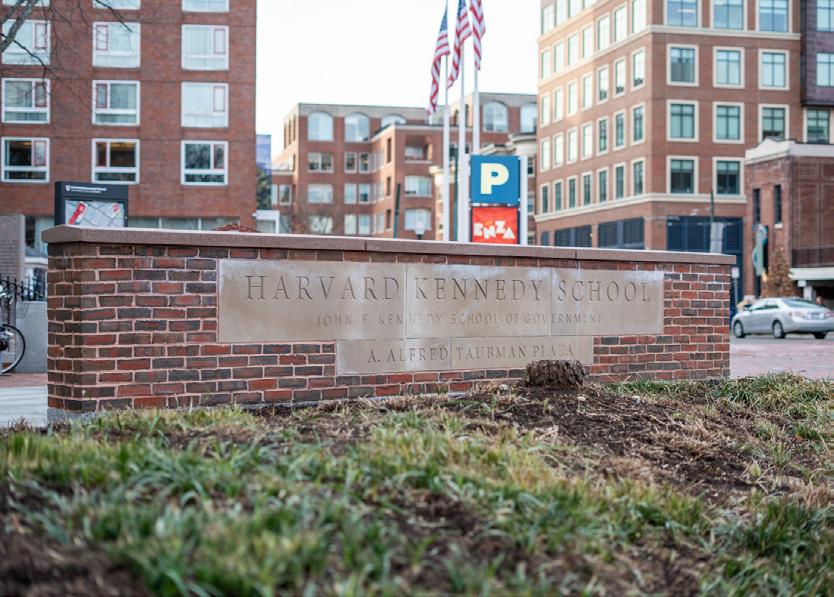
Wednesday 4/10
Thursday 4/11
Friday 4/12
CONCERT: HARVARD JAZZ COMBO
Jill Brown-Rhone Park, 12 p.m.
Gather at Lafayette Square at noon for a Cambridge Arts lunchtime concert. The concert will feature the Harvard Jazz Combo Initiative, directed by saxophonist Don Braden. Performers include Mai Nguyen, flute; Jack Meyer, drums; Hyuntae Choi, piano; Will Kissinger, piano; Noah Kassis, violin; Carolyn Hao, voice; and Leo Weisskoff,
foreign ministers in Brussels on April 3, according to the Associated Press. The new proposal suggests NATO take charge of the Ukraine Defense Contact Group, a forum consisting of about 50 countries that support weapons and ammunition for Ukraine, which is currently led by the U.S. NATO CONSIDERS PLAN TO PROVIDE LONG-TERM MILITARY AID TO
SUN ON THE STEPS
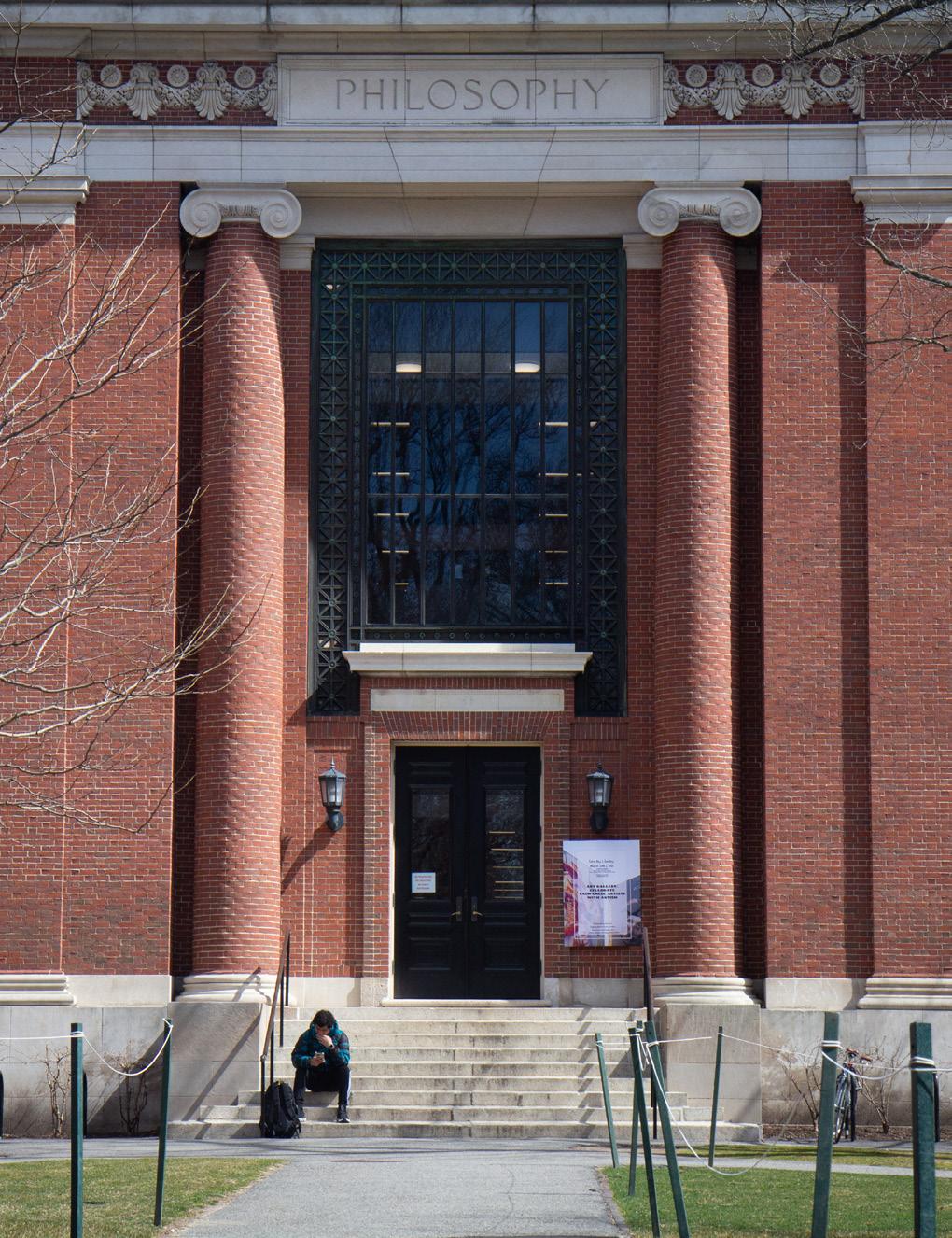
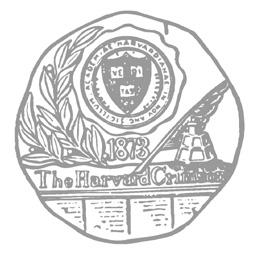
What’s Next
Salata
Join
an award-winning senior
mate reporter for Bloomberg News, for a book talk on his new book “Climate Capitalism: Winning the Race to Zero Emissions and Solving the Crisis of Our Age.”
BOOK TALK: CLIMATE CAPITALISM BY BLOOMBERG’S AKSHAT RATHI
Institute Lounge, 4 p.m.
Akshat Rathi,
cli-
bass. RECITAL: AN EVENING WITH TWINKIE CLARK James Room, Swartz Hall 6-7 p.m. Grammy Lifetime Achievement Award recipient and gospel artist Twinkie Clark will discuss her musical journey and give a performance from her catalog of over 350 songs. Harvard Professor Charrise Barron will moderate. IN THE REAL WORLD Federal Research Chair Jerome Powell said Wednesday that the Reserve’s interest rate will likely be reduced later this year. This comes despite recent reports showing a strong U.S. economy with inflation picking up in January and February, according to the Associated Press. Powell said in a speech at Stanford University that most Fed officials find it appropriate to cut their rate “at some point this year.” Seven aid workers for the World Central Kitchen were killed by Israeli airstrikes in Gaza on Monday evening, threatening to set back efforts by charities and countries to provide food to Palestinians in northern Gaza. World Central Kitchen ships with around 240 tons of aid left from Gaza one day after arriving, per Cyprus. The Associated Press reported that additional aid organizations suspended operations in Gaza, citing danger. FED CHAIR SAYS RATE CUTS LIKELY THIS YEAR AID GROUP HALTS FOOD DELIVERY IN GAZA AFTER FATAL ISRAELI STRIKE
NATO discussed plans to take more control over U.S.-led military support to Ukraine at a meeting of the alliance’s
NEXT WEEK 3
UKRAINE
was off the coast of rural Hualien County, where 93 people remained stranded as of Thursday morning, according to the New York Times. Across the country, 40 flights were canceled or delayed, around 14,000 households were left without water, and around 1,000 households were without power. At least seven Iranian officers overseeing Iran’s covert operations in the Middle East were killed in Damascus on April 1, according to the New York Times. Iran’s Revolutionary Guards issued a statement that the Israeli military conducted an airstrike on part of the Iranian Embassy
STRIKES IRAN’S CONSULATE IN SYRIA, KILL 7 SENIOR COMMANDERS APRIL 5, 2024 THE HARVARD CRIMSON
4/7
4/6 SAMUEL A. HA — CRIMSON PHOTOGRAPHER STAFF FOR THIS ISSUE Night Editors Paton D. Roberts ’25 Yusuf S. Mian ’25 Assistant Night Editors Julian J. Giordano ’25 Ayumi Nagatomi ’26 Sami E. Turner ’25 Story Editors Ryan H. Doan-Nguyen ’25 Miles J. Herszenhorn ’25 Yusuf S. Mian ’25 John N. Peña ’25 Rohan Rajeev ’25 Paton D. Roberts ’25 Elias J. Schisgall ’25 Claire Yuan ’25 Design Editors Sami E. Turner ’25 Laurinne Jamie P. Eugenio ’26 Hannah S. Lee ’26 Tomisin M. Sobande ’26 Angel Zhang ’26 Catherine H. Feng ’27 Nicole M. Hernández ’27 Xinyi C. Zhang ‘27 Photo Editors Julian J. Giordano ’25 Addison Y. Liu ’25 Marina Qu ’25 Jack R. Trapanick ’26 Kevin I. Cho ’26 Lara R. Berliner ’27 Arts Editors Samantha H. Chung ’25 Editorial Editors J. Sellers Hill ’25 Ian D. Svetkey ’25 Sports Editors Katharine A. Forst ’25 Jack K. Silvers ’25 Emma S. de Jong ’26 Nghia L. Nguyen ’26 CORRECTIONS The Harvard Crimson is committed to accuracy in its reporting. Factual errors are corrected promptly on this page. Readers with information about errors are asked to e-mail the managing editor at managingeditor@thecrimson.com. Has Spring Sprung??? Associate Managing Editors Elias J. Schisgall ’25 Claire Yuan ’25 Editorial Chairs Tommy Barone 25 Jacob M. Miller ’25 Arts Chairs Anna Moiseieva ’25 Allison S. Park ’25 D&I Chairs Lauren A. Kirkpatrick ’26 Hailey E. Krasnikov ’25 Associate Business Manager Mathias Melucci ’26 Meredith W.B. Zielonka ’25 Magazine Chairs Hewson Duffy ’25 Kaitlyn Tsai ’25 Blog Chairs Eve S. Jones ’25 Hayeon Ok ’25 Sports Chairs Katharine A. Forst ’25 Jack K. Silvers ’25 Design Chairs Laurinne Jamie P. Eugenio ’26 Sami E. Turner ’25 Multimedia Chairs Julian J. Giordano ’25 Addison Y. Liu ’25 Technology Chairs Dennis S. Eum ’26 Neil H. Shah ’26 THE HARVARD CRIMSON Copyright 2024, The Harvard Crimson (USPS 236-560). No articles, editorials, cartoons or any part thereof appearing in The Crimson may be reproduced in any form without the express written permission of the President. The Associated Press holds the right to reprint any materials published in The Crimson. The Crimson is a non-profit, independent corporation, founded in 1873 and incorporated in 1967. Second-class postage paid in Boston, Massachusetts. Published Monday through Friday except holidays and during vacations, three times weekly during reading and exam periods by The Harvard Crimson Inc., 14 Plympton St., Cambridge, Mass. 02138 J. Sellers Hill ’25 President Miles J. Herszenhorn ’25 Managing Editor Matthew M. Doctoroff ’25 Business Manager ADDISON Y. LIU — CRIMSON PHOTOGRAPHER
LAW SCHOOL
HLS Students Targeted by Doxxing, Billboard Truck
DOXXING ATTACKS.
Several Harvard Law School students were doxxed after the student government passed a resolutionlast week calling on Harvard to divest from “illegal Israeli settlements.”
BY S. MAC HEALEY AND SAKETH SUNDAR CRIMSON STAFF WRITERS HARVARD
Harvard Law School students and several leaders in its student government faced doxxing attacks after the passage of a resolution on Friday calling on the University to divest from “illegal Israeli settlements.”
The attacks escalated when a billboard truck drove around campus on Tuesday displaying the names of the HLS student government co-presidents with the text “Why Does HLS Student Government Hate Jews?”
The doxxing campaign comes after the HLS student government called on the Harvard Management Company — which stewards the University’s $50.7 billion endowment — to “divest completely from weapons manufacturers, firms, academic programs, corporations, and all other institutions that aid the ongoing illegal occupation of Palestine and the genocide of Palestinians.”
The truck, which was paid for by the Jewish Leadership Project, drove around Harvard Square for several hours on Tuesday. It was the most vivid example of a doxxing campaign that began on Friday with several social media accounts posting photographs and names of students who allegedly supported the resolution calling on Harvard to divest.
Aaron A. Nytes, a member of the HLS student government, said in an interview on Tuesday that the doxxing attacks have left students “feeling not safe to speak out, not safe to voice their opinions.” “They feel that anything they say
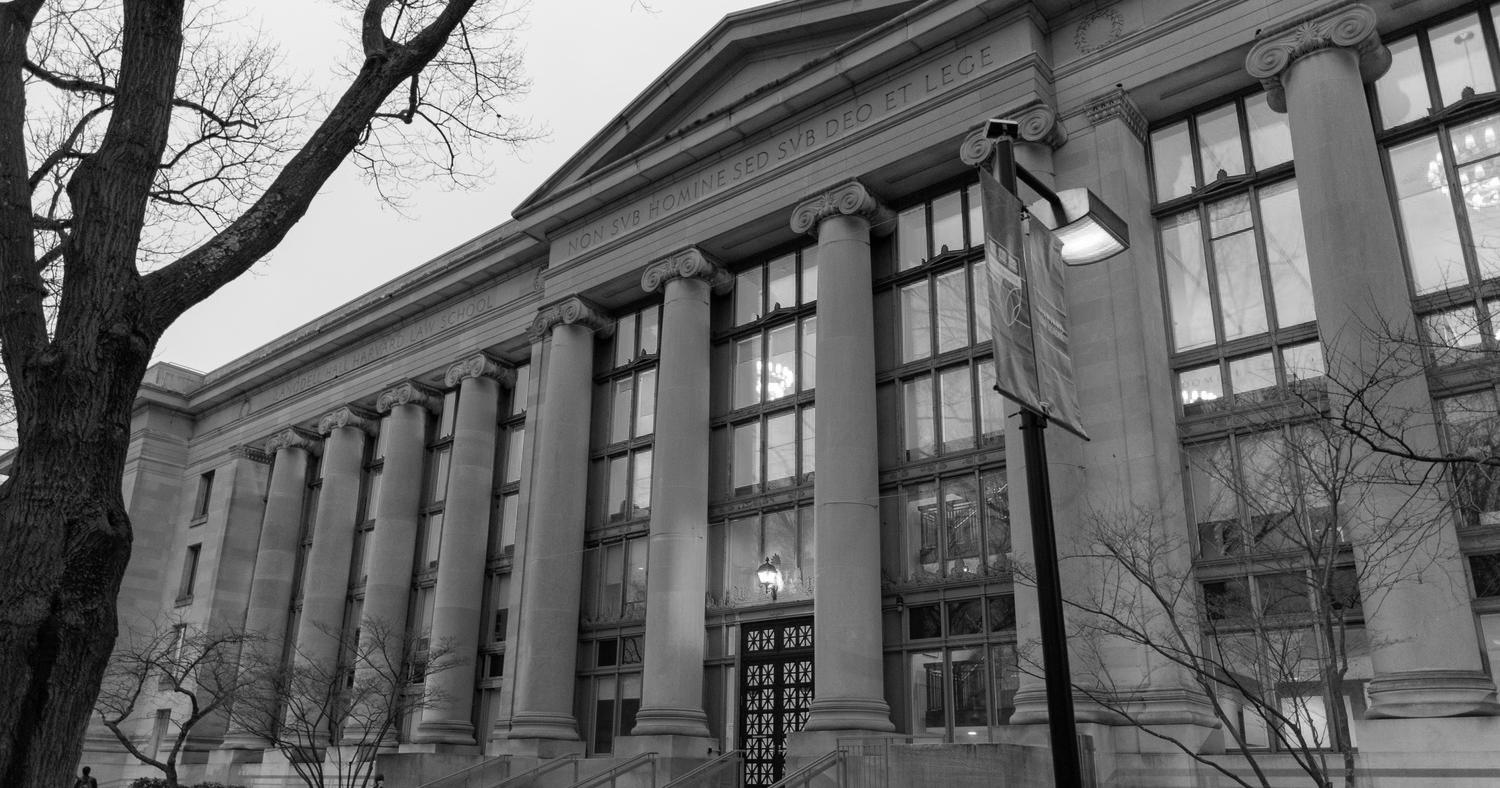
is going to be misconstrued or published in a negative light and that it can pose risks to any sort of livelihood in the future or anything they want to do in the future — and really just a general feeling of anxiety that their words are going to be used against them,” Nytes added. HLS spokesperson Jeff Neal wrote in a statement on Tuesday that the “safety and wellbeing of members of our community continues to be our top priority, and the school is continuing to work to support our students, staff, and faculty.” “Members of our student services teams have reached out directly on an individual basis to offer assistance to students affected by events of recent days,” Neal added.
The doxxing attacks and the Tuesday reappearance of a billboard truck triggered memories of the fall semester, when similar trucks circled campus following Hamas’ Oct. 7 attack on Israel and former President Claudine Gay’s controversial congressional testimony. The Jewish Leadership Project, the organization that financed the truck that circled campus on Tuesday, also claimed responsibility for two billboard truck campaigns in December that targeted Gay and
the Harvard Corporation, the University’s highest governing body.
The Jewish Leadership Project did not respond to a request for comment on Tuesday.
Last semester, many undergraduate students faced doxxing attacks after public backlash to a widely criticized statement released by more than 30 student groups in October that held Israel “entirely responsible” for the violence stemming from Hamas’ attack.
The passage of the resolution on Friday was followed by an emergency meeting where the student government discussed procedural objections raised against the resolution’s passage. While the student government eventually passed a procedural motion affirming the validity of the resolution on a 9-5 vote, two first-year law students resigned over the passage of the resolution.
On Monday, HLS students staged a sit-in at the Law School’s Dean of Students office in response to the administration’s handling of the doxxing attacks against students.
“The sit-in was basically just showing the administration that we are aggrieved, that we are dissatisfied with the level of protection that they are offering us as students,” Ny-
tes said. “The doxxing and releasing of sensitive information is against Harvard policy,” he added. “The general feeling is frustration that Harvard isn’t willing to enforce that policy and they’re not willing to protect students.”
Students also sent a “high volume of inquiries” to the Office of Public Interest Advising asking to be removed from internal Harvard career lists.
In an email sent to HLS affiliates, the OPIA announced it had taken down spreadsheets with employment information in response to student concerns and a high volume of requests for the removal of students’ personal information.
HLS Lambda — the school’s LGBTQ+ student organization — wrote in a statement on Sunday that they condemned “in the strongest terms the doxxing campaign against HLS students conducted by numerous Twitter accounts.”
“We are deeply troubled that this doxxing campaign was instigated by HLS students,” they wrote, “(which is self-evident because the Zoom meeting was only made available to HLS students).”
mac.healey@thecrimson.com saketh.sundar@thecrimson.com
Newton, the Harvard spokesperson, wrote in a statement that the University has been “encouraged by the response” to its efforts to combat antisemitism and anti-Muslim and anti-Arab bias on campus.
According to Newton, “alumni are listening, sharing feedback, connecting with campus leaders and one another, as well as showing up for events and registering for programs in high numbers.”
“Many are asking questions to better understand what’s happening, and many are asking if there are ways they can help,” he added. “We are grateful for the ongoing conversation and engagement.”
James F. Hayden ’77, who has previously fundraised for the University, said he has appreciated the University’s communication with alumni about their response to campus tensions and leadership changes.
Hayden said that from those communications and from news reports, he thinks Garber has been successful at “getting his message across.”
Hayden said he has not noticed an increase in the number of donation solicitations from the University, and said the pitch to donors has remained consistent over decades.
Other donors noted that the campus climate and media spotlight on Harvard’s leadership is just one factor that influences donations.
Harvard donor Mitchell L. Dong ’75 said the strength of the stock market impacts how much money Harvard is able to raise, suggesting that the current stock market could serve as a potential counter to ongoing donor dissatisfaction.
“When the stock market is an all-time high, then usually fundraising is an all-time high because people give securities that have gone up and they don’t want to sell it because then they have to pay taxes,” Dong said.
“So given the stock market is an all time high, I think that’s going to offset any negative views
on the crisis at the University,” he added.
George H. Yeadon ’75, who received the HAA award for outstanding service in 2013, said that while there is widespread concern around how alumni and donors will react, many alumni he has spoken with do not plan to change the level or frequency of their donations.
Even as Harvard’s billionaire donors publicly announced they have paused donations, Yeadon said that “the rank and file hasn’t indicated to me in any of my conversations that they’re going to change their philanthropy towards the school.” Engagement, too, has increased over the past few months as alumni attempt to understand how Garber and other University leaders plan to move forward.
Informational webinars for alumni have been substantially better attended in recent months, and almost 9,500 alumni and guests registered for Harvard’s various March 13 Global Networking Night events. It was the second highest number in the program’s more than 10-year history, according to Newton. As the University looks to attract new donors and mend relationships with those on the fence, the upcoming class reunions in late May will center in their approach. As in past years, the most active period for fundraising takes place in between April and June. Edmund S. Tijerina ’87,
a difference in the world,” Garber said, according to a copy of his prepared remarks. “None of us can do that work alone,” he added. “We need one another, especially when darkness obscures light.” Safi also criticized the administration for suppressing pro-Palestinian voices on campus. “While I hope that the initiative for the task force is a genuine good faith effort, Harvard has failed our community unimaginably,” he said.
“These efforts cannot be decoupled from Harvard’s investments in Israel’s genocide, and its repression of pro-Palestine voices,” Safi added. “Harvard cannot claim to listen to its Muslim and Arab students while simultaneously silencing them when they speak out, and funding violence against their communities.”
While Garber was responding to students’ questions, he frequently referenced the ongoing work of the presidential task force he established to combat anti-Muslim and anti-Arab bias. After the task force was created in January, members held listening sessions last week alongside the task force to combat antisemitism. The group has not publicly released recommendations from their discussions or fully named the students who will serve on the task force, according to a Harvard website.
The Department of Education started an investigation into Harvard in Febuary after a complaint alleged the University failed to protect students from anti-Muslim and anti-Arab discrimination. The University also cut its Ramadan meal programming from
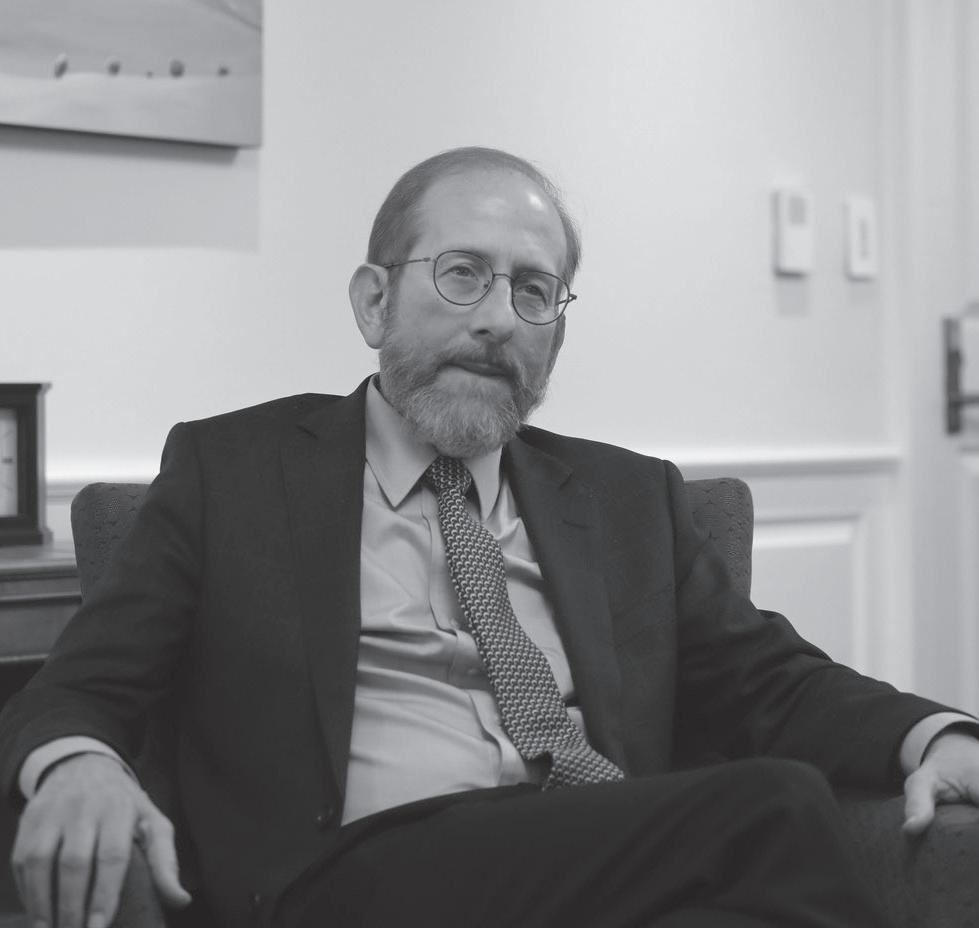
the entire month to two days a week, citing budget constraints. Neither the investigation nor the funding cut was addressed at the event Friday.
Samy Almshref ’26, another event attendee, said he believed Garber’s remarks “showcased a clear reluctance to mention Palestine and Gaza.” “When asked about Harvard’s role and moral position on Palestine, he expressed vagueness and ambiguity,” Almshref wrote in a statement.
A University spokesperson declined to comment for this article. Earlier on Friday, Harvard Law School Student Government passed a resolution that “formally calls upon HMC to divest completely from weapons manufacturers, firms, academic programs, corporations, and all other institutions that aid the ongoing illegal occupation of Palestine and the genocide of Palestinians.”
University spokesperson Jason A. Newton wrote in a statement Friday afternoon that “Harvard leadership has made clear that it opposes calls for a policy of boycotting Israel and its academic institutions.”
Garber, however, sidestepped the questions about calls for the University to divest from Israel at the iftar event. But the attendees decided to answer the question themselves. Toward the end of Garber’s appearance, a student asked the gathered crowd to raise their hand if they preferred the University divest from Israel instead of having a task force.
Many people raised their hands.
emma.haidar@thecrimson.com cam.kettles@thecrimson.com
fourth quarter of 2023, when former Harvard President Claudine Gay sparked national backlash during her testimony before the House Committee on Education and the Workforce.
University spokesperson Jason A. Newton wrote in a statement that “strong funding of the federal-university partnership has been a leading concern in recent years, as regular annual funding measures have been delayed and sidetracked by budget fights and larger politics.”
The sudden rise in the Ivy League’s lobbying expenditures was driven by Yale and Cornell. The two universities each spent $600,000 on their efforts, surpassing Harvard spending for the first
“Harvard is Harvard. It will come through this just fine,” he said. “But it probably is going to take some time,” Tijerina added.
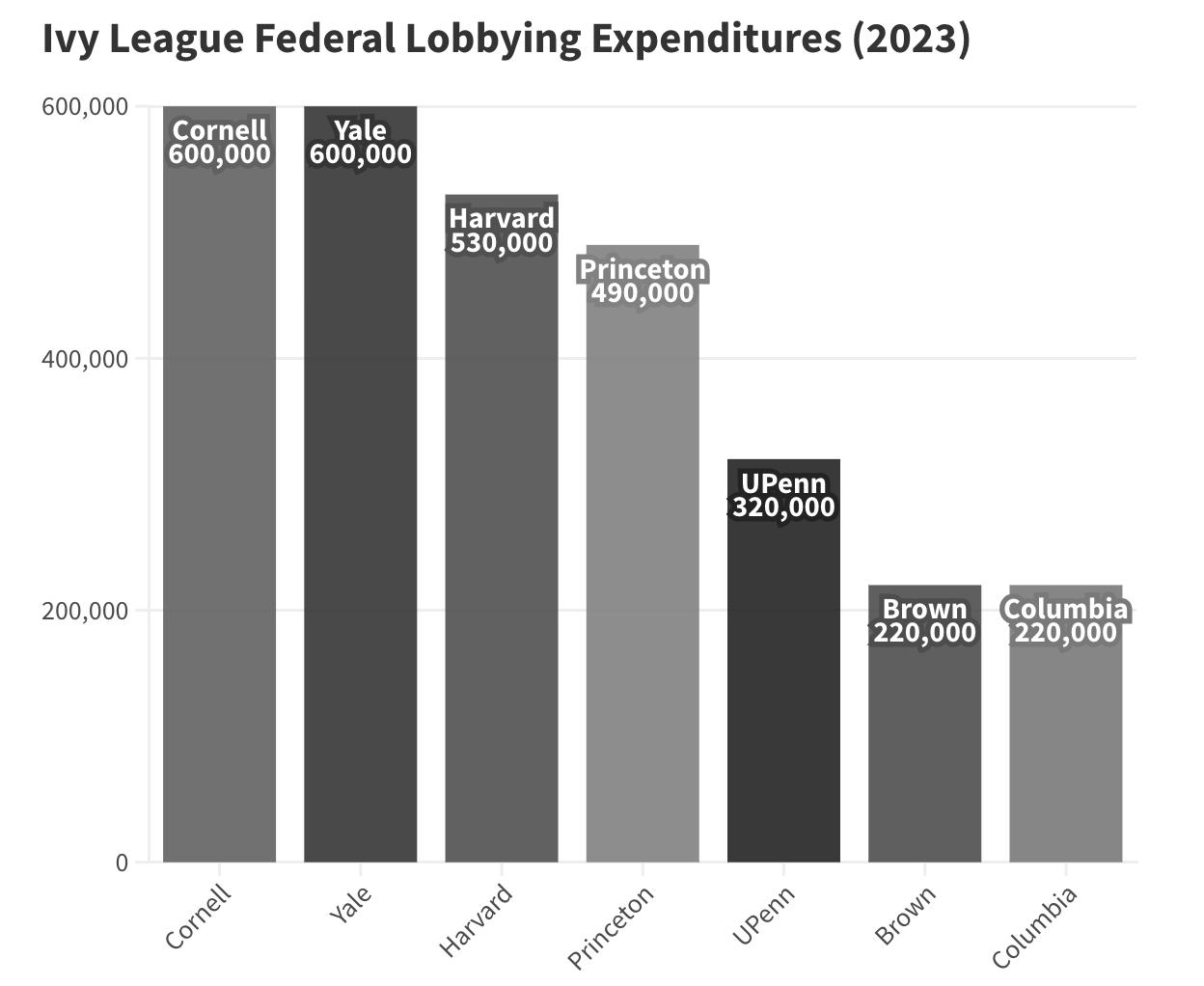
time since 2020.
Cornell lobbied heavily for an increase in agriculture and veterinary research funding. While Yale’s efforts were in line with Harvard’s — lobbying in favor of immigration reform, a national quantum initiative, and funding for STEM fields.
Harvard has consistently directed lobbying efforts toward issues related to science, such as research transparency and security, semiconductor research and development, and the commercialization of University-based discoveries. Harvard also lobbied for the implementation of the bipartisan CHIPS and Science Act, which aims to strengthen U.S. manufacturing and supply chains to counter China. Additional spending went towards targeted artificial intelligence research and potential legislation to establish a regulatory framework for AI, such as the Create AI Act. The bill would construct a cloud computing resource
NEWS 4 APRIL 5, 2024 THE HARVARD CRIMSON
the HAA director of Harvard’s Texas clubs, said that most of the alumni he speaks to have not changed their opinion on their alma mater because of the controversy. He said that, at least among smaller donors, willingness to contribute has not changed substantially.
Interim President Alan Garber Grilled by Students at Iftar Event Garber
Harvard Law School students and student government officials were doxxed. JULIAN J. GIORDANO — CRIMSON PHOTOGRAPHER Harvard spent $530,000 on lobbying the federal government in 2023, the lowest amount spent by the University in the past nine years. While collective Ivy League federal lobbying expenditures surged by 12.4 percent last year, reaching an all time high during the Biden administration, Harvard’s own lobbying levels dipped from past years. The University’s lobbying expenditures fell $40,000 from last year’s total to its lowest levels since the 2014 fiscal year. Harvard’s lobbying efforts peaked during the first three years of the Trump administration, when the University routinely spent roughly $600,000 annually on federal lobbying. Ivy League universities continued their lobbying efforts to increase funding for higher education, amid a tumultuous year for Harvard, which has faced congressional scrutiny over antisemitism on campus amid concerns the University might lose some of its federal funding. Harvard’s lobbying spending remained at prior levels during the
Admits Fundraising Problem
that democratizes the development and use of AI. The University resumed lobbying in immigration reform issues, including the Dream Act, as well as expedited pathways to citizenship for graduates of U.S. universities and those with advanced STEM degrees. Harvard lobbying efforts were also centered around protecting its 50.7 billion endowment from further federal taxes, which the University has long claimed would be a blow to higher education. Harvard alongside its peer institutions Princeton and Brown lobbied in favor of a bill to remove an excise tax on endowments under the condition the University provides a set amount of financial aid awards to its students. The Higher Education Endowment Tax Reform Act, introduced by Rep. Brendan F. Boyle (D-Pa.), a Harvard Kennedy School alumnus, stalled in the Republican-led Ways and Means Committee. Harvard is increasingly wary of a further tax on its endowment, despite successfully lobbying last quarter against a Senate bill that sought to raise taxes on investment income from 1.4 percent to 35 percent for endowments greater than $10 billion. The University is currently facing a proposed tax from the Massachusetts State House that would cost the endowment $1.2 billion annually. Ivy League Federal Lobbying Expenditure Rose 12% in 2023 BY SIDNEY K. LEE AND THOMAS J. METE CRIMSON STAFF WRITERS sidney.lee@thecrimson.com thomas.mete@thecrimson.com Source: U.S. House Office of the Clerk • Figures from Dartmouth are not available. THOMAS J. METE—CRIMSON STAFF WRITER emma.haidar@thecrimson.com cam.kettles@thecrimson.com UNIVERSITY FINANCE FROM PAGE 1 UNIVERSITY FINANCE FROM PAGE 1 Interim Harvard President Alan M. Garber ‘76 faced a grilling from Harvard students during a Friday iftar event. MARINA QU — CRIMSON PHOTOGRAPHER
Class of 2028 Reacts to Harvard Acceptance
BY ELYSE C. GONCALVES AND MATAN
When Eric Li, a senior at Deerfield Academy, opened his Harvard admissions decision, he jumped up, screamed with his friends – and, in the excitement, broke his glasses. Still, Li said, it was all worth it.
“I had to fix it myself with a wrench after, but it’s fine,” he said.
“It’s a small price to pay.” Li, a regular decision applicant originally from Shanghai, was one of 1,245 other applicants who got their acceptance letters from Harvard last Thursday. The new admits joined the 692 students previously accepted in the early admissions round in December. A total of 1,937 students were admitted to Harvard’s Class of 2028, representing 3.59 percent of the 54,008 applications the College received in this year’s admissions cycle. For Silas O. Nwaishienyi, a student from Regis High School
in New York City, waiting for his early action decision to come out — huddled over his computer in his room with his parents — “was like waiting for an eternity.” But opening the application portal to a welcome video felt “surreal,” he said. “My parents had been there by my side throughout the entirety of my years,” he said. “And so it was super, super emotional.”
James N. Pippin opened his decision 15 minutes late, just after a four-mile walk from work to his home in Berlin, Germany, where he is stationed for the U.S. Military. Pippin said he was shocked when he saw “congratulations” pop onto the screen. “I just collapsed on the ground,” Pippin said. “It was enough to make me cry, for sure.”
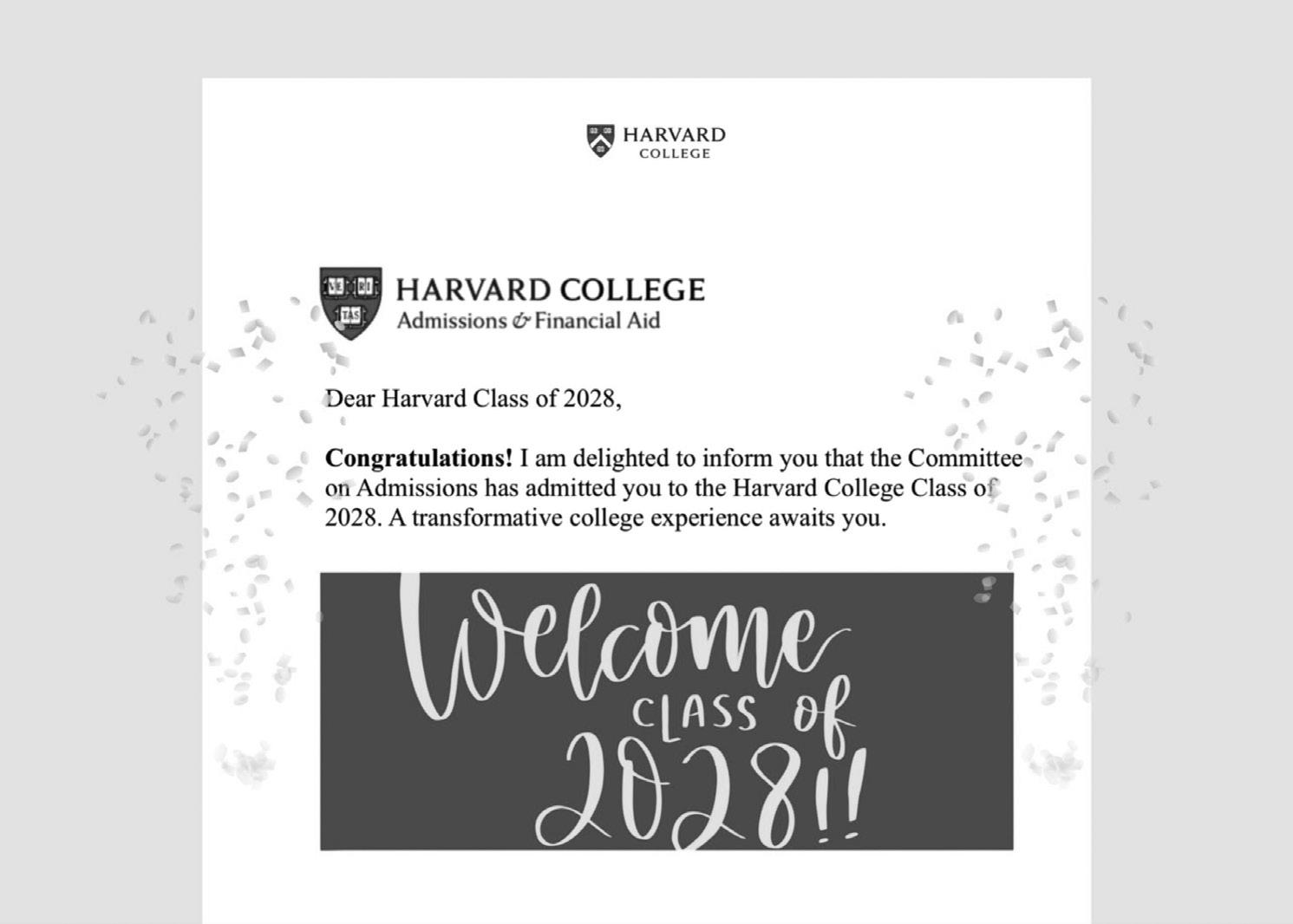
“I was just so shocked that
I started immediately crying,” Christofferson said. “I was just kind of in shock for a really long time. It didn’t sink in for like an hour after, because I really didn’t expect that.”
ly before opening his decision to calm him down.
“It was the most nervous I’ve ever been,” Pahlow said.
“I kind of just wanted it to be special in my memory, but it was one of the coolest feelings I’ve ever had.” Mason J. Holmes, a student from Haverhill, Massachusetts, waited for his parents to get home before opening his Harvard decision.
“I don’t think I even read the letter, all I saw was the confetti,” he said. “I jumped up and ran away, because I was so freaked out.” “My mom was the one who read it,” Holmes added.
Pahlow said. “He said he never doubted me, so I guess he wasn’t really shocked.” “He was over the moon with me,” he added.
Annika N. Krovi,
Skylar A. Christoffersen, a student from San Francisco, was also emotional when opening her decision on a FaceTime call with her parents.
Henry D. Pahlow, a newly admitted student from Maribel, Wisconsin, said his dad took him to get ice cream immediate -
But when he opened the letter and saw digital confetti flying across his screen, he and his parents jumped out of their chairs, screaming with excitement. “I didn’t film it,” Pahlow said.
After getting in, Holmes called several of his friends to tell them the good news. “They all knew that I was receiving my decision that night, so they were like, you need to let me know right away,” he said. Pahlow said he felt a similar level of elation and support from his mentor, a current Harvard student in the Class of 2025 who was also an army infantryman. “I called him immediately,”
“I’m excited to go and see the campus for the first time, and see some of my other admitted students,” he said.
Even several days after opening the acceptance letter on Ivy Day, Li said he still felt shocked that he got in.
“It just felt really, really, really sweet inside,” he said. “I still can’t believe that it happened.”
Garber Forms Working Groups
Seven pairs of candidates vying for the Harvard Undergraduate Association co-presidency answered questions and pledged campaign promises during a debate hosted by the Harvard Political Review on Tuesday evening.
During the debate, two current HUA officers running for the co-presidency disavowed the leadership of outgoing HUA co-presidents John S. Cooke ’25 and Shikoh M. Hirabayashi ’24, both of whom face ongoing efforts to be recalled from office. The move suggests that Cooke and Hirabayashi may be facing waning support from HUA members in the last days of their term.
The HUA’s leadership turmoil heightened last week after the Fox Club expelled Cooke from the social organization over allegations of misconduct. Members of the HUA’s executive team subsequently met with the Dean of Students’ Office on Wednesday and Thursday to discuss the possibility of Cooke’s resignation from the presidency. Days later, a petition circulated calling for a vote to remove
Cooke from office, receiving enough signatures to trigger a recall election. Cooke’s co-president, Hirabayashi, also faced a petition on Sunday similarly calling for a vote to remove him from office. It is unclear whether the petition against Hirabayashi will obtain the requisite votes for a recall election.
HUA Social Life Team Officer Jonathan Haileselassie ’26 and Inclusion Team Officer Ashley C. Adirika ’26 said during the debate that they “support the student-led initiative to recall” Cooke. “We do not stand by the leadership of John or Shikoh,” Haileselassie said. “When we ran to be the Inclusion and Social Life Officers last year, we ran with only one reason in mind: like I said, it was to improve the overall experience for students on campus.”
Haileselassie’s rebuke of the HUA’s current co-presidents points to the growing fractures within the organization’s executive team, which has internally discussed the possibility of Cooke’s resignation. With less than one month left in their presidential terms, Cooke and Hirabayashi seem to be facing dwindling officer support.
During the debate, undergraduate students were allowed to submit questions to the mod -
erators in real time, which were then screened and asked to the candidates. Every candidate pair received 45 seconds to answer each question. After the candidates delivered their opening remarks, each pair was asked — in an apparent reference to the current HUA leadership turmoil — to discuss “ethics and accountability issues within members of its leadership” and explain how they would “ensure that such issues do not arise in the future.”
In addition to denouncing the leadership of Cooke and Hirabayashi, Adirika and Haileselassie also emphasized their distance from the two.
“Our mission has always been independent of J.C. and Shikoh,” he added. “It has been about the student body.”
Despite the pointed question about criticisms against the HUA leadership, debate moderators then told candidates not to name current members of the HUA in their responses.
During the event, Institute of Politics President Pratyush Mallick ’25 and Kevin A. Bokoum ’26 said they seek to eliminate the HUA co-presidency position altogether. “We’re running in the simple idea that there’s no fucking role for a co-presidency,” Mal -
lick said. “We want to eliminate it altogether.”
“There’s only two reasons why people run for president: to put it on their resume, to tout power,” he added.
Mallick and Bokoum’s calls to eliminate the HUA’s top position echoes previous efforts by Michael Y. Cheng ’22, who served as the last president of the College’s previous student government, the Undergraduate Council. Cheng resigned just days after being elected to the UC presidency, leading to its dissolution and replacement by the HUA.
Eunice S. Chon ’25-’26 — a current member of the HUA — opened her answer in a somber tone.
Holding back tears, she said that “the way that my story has been exploited, misrepresented, invalidated because of HUA politics in the past few days has been hard.”
“Regarding accountability, my brother has done what he has done to protect his team, and the way our colleagues have been tried for complacency has been heartbreaking,” she added, referring to HUA Academic Team Officer and her running mate Peter E. Chon ’26.
indication that the University is looking to adopt a policy of institutional neutrality. The Open Inquiry and Constructive Dialogue Working Group will be led by Eric Beerbohm, the director of the Safra Center for Ethics, and Radcliffe Dean Tomiko Brown-Nagin.
The working group will look at how the University can “support constructive disagreement” and viewpoint diversity on campus.
It comes just over one month after the College announced its Intellectual Vitality Initiative, an effort to combat self-censorship on campus and four months after the Faculty of Arts and Sciences launched its own civil discourse initiative. Beerbohm also serves as a senior adviser on civil discourse to FAS Dean Hopi E. Hoekstra. The Institutional Voice Working Group will be led by HLS professor Noah R. Feldman ’92 and Philosophy professor Alison J. Simmons. Garber wrote that the group would consider when the University should issue “official, institutional declarations about matters of social and political significance” as well as who is “authorized” to speak on behalf of the University.
Garber and Manning asked affiliates to consider writing to the groups on institutional neutrality and free speech issues. Similar to listening sessions held by the task forces on antisemitism and anti-Muslim and anti-Arab bias, the two groups will meet with faculty, students, and staff in the coming months to hear their concerns and suggestions.
Garber and Manning wrote that the two groups will eventually submit recommendations to the university on their assigned topics, but did not specify a timeline for their work.
these exams, and the mice were going crazy,” Caughman said. “All the way throughout Mass. Hall.”
Though several freshmen said they have seen mice in their dorms since early last fall, many said they
noticed an increase in recent weeks. Soham Gupta ’27 said he found a rat upon returning to his Canaday Hall dorm after spring break. “I open the door to my bathroom, and then a rat comes out of there, basically scurrying out,” Gupta said. “I did not shower that night.” Hollis Hall resident Diane Sun ’27 awoke to “squeaking and the sound of crunching” just before making her first mouse sighting after spring break. Sun and her roommate took action, throwing away food, filling in holes with cardboard, and covering their room in peppermint oil. Their countermeasures were unsuccessful. “The next morning, my roommate — after we first saw the rat — the rat got into her zipped backpack, with a zipped pouch inside with snacks, and then shat in her backpack,” Sun said. Sun added that her rodent sighting was “horrifying.” “It is horrifying, it’s like a horror movie. My roommate tried to record the sound of the mouse munching, and all she got was the
sound of me crying,” she said. Danny T. Liu ’27 said having mice in his dorm put him “on edge.”
“You’re not sure if you’re gonna win, or if you’re gonna make it out. But you’re always playing this game,” Liu said.
“Ensuring a clean and healthy living space for all students is always a priority,” College spokesperson Jonathan Palumbo wrote in a statement. “Several steps are being taken to mitigate the issues, including the assignment of pest control and custodial crews making regular visits and treating points of entry.”
Though students in affected dorms reported both mouse and rat sightings, The Crimson could not verify the presence of rats. Palumbo did not comment on possible rat sightings.
According to several students and an email to Canaday Hall residents obtained by The Crimson, Yard Operations laid traps and returned to check them over spring break “in an effort to more aggressively treat the mice problem.”
Despite an increase in traps
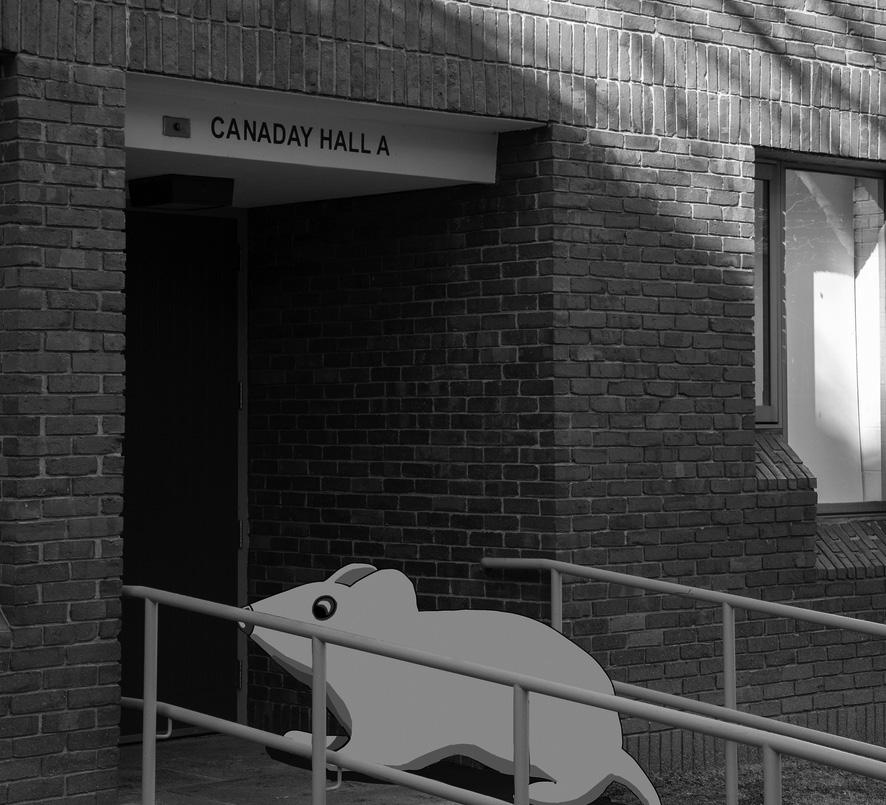
and student efforts to mitigate the issue, several freshmen said they continue to see rodents in their dorms.
Canaday resident Noah G. Plattner ’27 said none of the traps in his suite were effective, barring
one “traumatic” catch. “One of the traps worked partially, so it injured the mouse and she crawled under my roommate’s bed, and my roommate had to finish her off with a bottle of mouthwash and he just slapped her until
she exploded — disgusting, traumatic, actually just horrendous,” Plattner said. Plattner added that he has also seen mutilated mice in other students’ traps. “I came to my friend’s dorm, and she was like ‘Oh, do you want to see the half rat?’ because the trap had snapped the rat in half. I left that dorm and never came back,” he said. Several students said that Harvard’s high sticker price makes the problem more frustrating. “As Harvard students you pay so much money to come here,” Gupta said. “But I don’t understand why it’s so difficult to just seal everything off properly and get rid of this problem, because it seems like it’s been there for years.” Plattner said his peers are both “traumatized” and “accustomed to” dealing with rodents in their dorms. “It’s just a fact of life at this point,” he said.
NEWS 5 APRIL 5, 2024
HARVARD CRIMSON
THE
a student from Greenville, South Carolina, applied and was admitted to Harvard under its early action program. Krovi said she is excited to meet other admitted students at Visitas April 14-15, the two-day event held for admitted students every year. “Nothing replaces getting a chance to be on campus and speak to people in person,” Krovi said. Kaine A. Bivens, an admitted student from Fort Worth, Texas, said he is excited to get the chance to spend time in Cambridge during Visitas.
COLLEGE ADMISSIONS
H. JOSEPHY CRIMSON STAFF WRITERS ‘STILL DOESN’T
REAL.’ Harvard class of 2028 celebrates admission to the College. elyse.goncalves@thecrimson.com matan.josephy@thecrimson.com
FEEL
HUA Co-Presidency Candidates Rebuke Current Leaders, Debate Campaign Promises BY CAM N. SRIVASTAVA AND WILLIAM Y. TAN CRIMSON STAFF WRITERS
william.tan@thecrimson.com
cam.kettles@thecrimson.com ‘Like a Horror Movie’: Freshmen Complain About Mice in Dorms When Kaitlin M. Caughman ’27 woke up in her Massachusetts Hall dorm one morning last December, she found an unexpected visitor in her bed. “I roll over to go back to sleep, and it’s on my bed. I come face to face with the mouse,” Caughman said. “Less than a foot from my face.” Caughman immediately began to take preventative measures such as cleaning and discarding food — but has still seen “upwards of six or seven” mice in her room this semester. Ahead of midterm exams, she’s resorted to sleeping in friends’ dorms for several nights to avoid rodent-related disturbances. “I was studying for
cam.srivastava@thecrimson.com
emma.haidar@thecrimson.com
JO
STAFF
BY
B. LEMMAN AND AZUSA M. LIPPIT CRIMSON
WRITERS jo.lemann@thecrimson.com azusa.lippit@thecrimson.com
INSTITUTIONAL NEUTRALITY FROM PAGE 1
CATHERINE H. FENG — CRIMSON DESIGNER Stay Up to Date with our Newsletter, Subscribe at THECRIMSON.COM THC
NATALIE Y. ZHANG — CRIMSON DESIGNER
Phevos Paschalidis ’25, a Computer Science concentrator in Winthrop House, was on the phone with his older brother when he received an email announcing his election to Harvard College’s chapter of Phi Beta Kappa, the nation’s oldest academic honor society.
Paschalidis wrote in an email that he felt “surprise and delight” when he learned about receiving the honor while chatting with his brother. “Being able to share it with him right away was definitely special,” he added. Paschalidis and 23 other Harvard juniors learned they would be the first in their class to join the Alpha Iota chapter of Phi Beta Kappa last Friday.
The chapter has three cohorts of inductions each year: “Junior 24” in the spring semester, “Senior 48” in the fall semester, and “Final Seniors” who are elected right before Commencement. No more than 10 percent of any graduating class can be tapped for PBK. This year’s inductees represented 23 different concentrations and hailed from all the undergraduate Houses besides Cabot House, the second year in a row Cabot was the only House with no representation among the “Junior 24.”
Among concentrations, Mathematics took the lead in this cohort with four inductees, with Physics and Statistics following right be-

hind with three students each.
Katalina Toth ’25, a student in Mather House pursuing a joint concentration in Government and Romance Languages & Literatures, also said she was surprised to be elected to PBK as a member of the “Junior 24,” adding that she learned the news when a reporter from The Crimson reached out by email to request an interview. “My reaction to your email was, ‘Oh that’s so funny,’” Toth said. “‘I don’t know how The Crimson got this wrong.’” “And then I saw the email from Phi Beta Kappa and was like, ‘Oh,
this is so awesome,’” Toth added. “I was so excited and I called my mom immediately.”
Samuel P.N. Libenson ’25, a student in Eliot House, said he was “a lot calmer” than he expected to be when he read the email announcing his election. “It’s a very plainly written email that tells me something that’s a bit of a big deal,” he added. “I matched the energy of the email.”
Shu Yang Wei ’25, a student in Currier House who hails from Singapore, said he was “incredibly honored” to be elected as an international student. “As an international student,
Harvard really stands out as a global beacon of innovation and excellence,” said Wei, who studies Economics. “I’ve had the help of a lot of people, and I think this is a huge testament to all of that and also to the work that I’ve put into my academic journey.”
Some of the inductees discussed how they merged different fields — often from the sciences and the humanities — to enhance their education at the College. Libenson, who is pursuing a joint concentration in Social Studies and Philosophy, said he spent the beginning of his academic career at Harvard discov-
ering what he was intellectually interested in by exploring a wide range of fields.
“I shopped around a lot and tried out a lot of different things my first few semesters at Harvard,” he said. “The classes I found myself most pulled towards were classes that dealt with the history of ideas.”
Others said that this invitation came with a sense of validation in the oftentimes, high-achieving Harvard community.
Sam E. Meacham ’25, a student in Pforzheimer House studying Social Studies, said it felt “wonderful to be recognized for it.”
“It’s actually quite humbling,” he said. “Coming into Harvard — or at certain times at Harvard — I wasn’t entirely sure where I stacked up, and I feel like a lot of us have that kind of feeling a lot of the time.”
Lena Ashooh ’25, a student in Kirkland House pursuing a special concentration in Animal Studies, said her election made her feel grateful to be a student. “Very few people have the time, space, and stability to spend all their time studying,” Ashooh said. “It is such a gift. I think it makes us doubly responsible to the people who don’t have this freedom.” “I’m so excited about all that I can learn from the other inductees about how they’re making this world better,” she added.
Harvard College Class of 2025 PBK ‘Junior 24’
Jana Amin ’25, Near Eastern Languages and Civilizations and Anthropology, Mather House
Lena Ashooh ’25, Special Concentration in Animal Studies, Kirkland House
Arjun Batra ’25, Electrical Engineering, Adams House
Raul Bodrogean ’25, Chemistry and Statistics, Pforzheimer House
Sophie Cooper ’25, Comparative Literature, Adams House
Nico Domingeuz Carrero ’25, Environmental Science and Public Policy, Dunster House
Zach Halberstam ’25, Mathematics, Leverett House
Ethan Jasny ’25, Government and Statistics, Mather House
Andy Kim ’25, Applied Mathematics, Lowell House
Ryan Kim ’25, Human

Development and Regenerative Biology, Currier House Hana Lampson ’25, Physics and Mathematics, Lowell House Samuel Libenson ’25, Social Studies and Philosophy, Eliot House Addison Liu ’25, Mechanical Engineering, Leverett House Sam Meacham ’25, Social Studies, Pforzheimer House Tasuku Ono ’25, Physics and Mathematics, Quincy House Phevos Paschalidis ’25, Computer Sciences, Winthrop House Oliver Rancu ’25, Chemical and Physical Biology and Romance Languages and Literatures, Currier House Kay Rollins ’25, History and Government, Winthrop House Katalina Toth ’25, Government and Romance Languages and Literatures, Mather House Jieyan Wang ’25, English and East Asian Studies, Kirkland House Shu Yang Wei ’25, Economics, Currier House Ryan Xia ’25, Economics and Statistics, Quincy House Emma Yang ’25, Computer Science and Physics, Lowell House Jessica Zhang ’25, Mathematics, Eliot House Phi Beta Kappa Inducts 24 College Juniors ACADEMICS BY ANNABEL M. YU CRIMSON STAFF WRITER Twenty-four Harvard juniors were tapped for Harvard College’s chapter of Phi Beta Kappa last Friday. MICHAEL GRITZBACH — CRIMSON PHOTOGRAPHER annabel.yu@thecrimson.com NEWS 6 APRIL 5, 2024 THE HARVARD CRIMSON HONOR SOCIETY. Twenty-four Harvard College juniors were inducted into Phi Beta Kappa. C o n g r a t s t o t h e 2 0 2 4 P B K J u n i o r 2 4 i n d u c t e e s ! From all of us at QuantCo, congratulations to this year’s Phi Beta Kappa Junior 24 inductees on your distinguished academic achievement. We wish you the best of luck in all your future endeavors! Started in 2016 by four PhDs from Harvard and Stanford QuantCo is now a global organization of over 200 data scientists, economists, software engineers, and machine learning experts with offices in Berlin, Boston (HQ), Cologne London Munich San Francisco and Zurich
The Trump Factor in
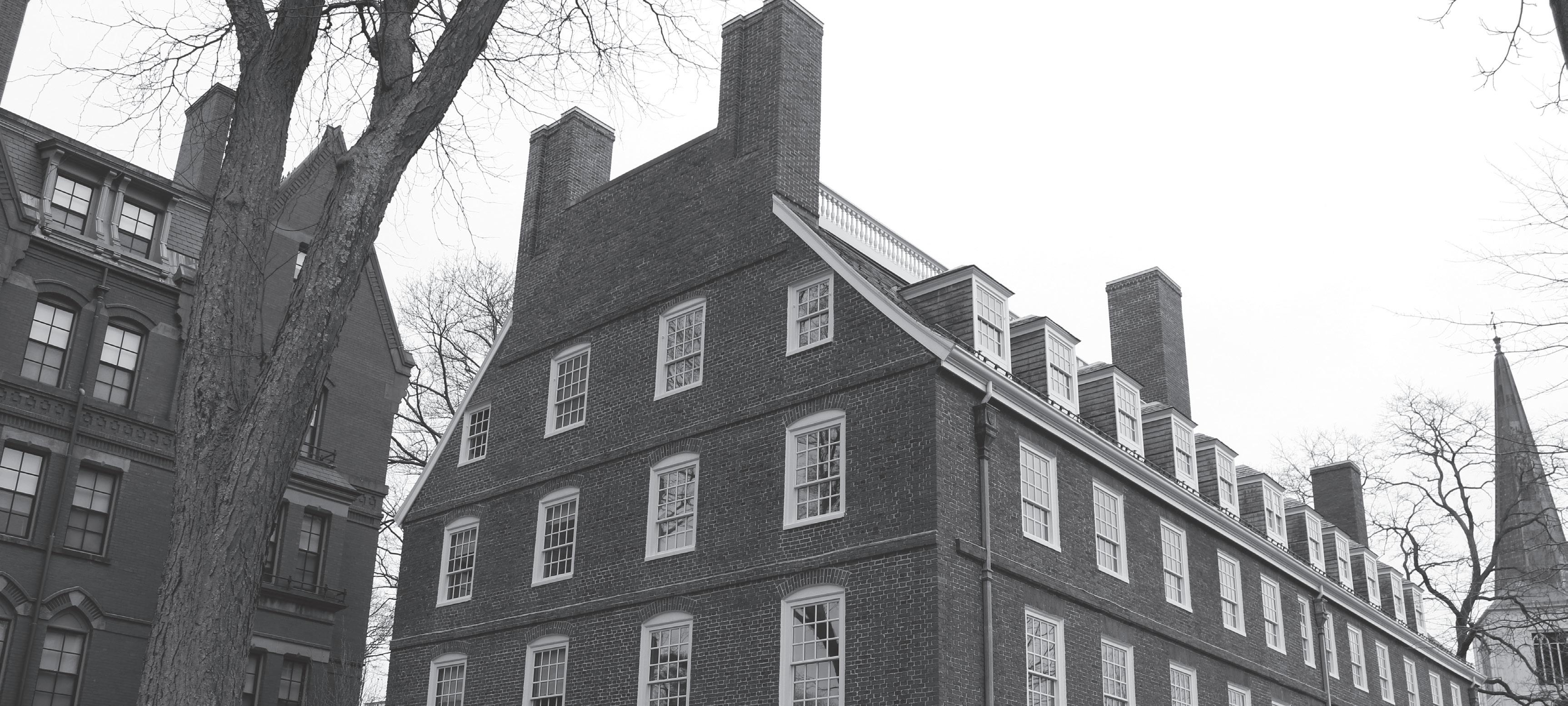
ninth year as Harvard’s 28th president, when her job description changed almost overnight.
The president of Harvard is often considered to be higher education’s chief spokesperson, but Trump’s 2016 presidential election victory compelled Faust to also become its defender-in-chief.
Former U.S. President Donald J. Trump was eating dinner in late December at Mar-a-Lago, his Florida resort, when he and his guests began to praise Rep. Elise M. Stefanik ’06 (R-N.Y.) and her grilling of former Harvard President Claudine Gay during the now-infamous Dec. 5 congressional hearing.
“She’s a killer,” Trump said.
Trump’s praise for Stefanik at the private dinner, which was first reported by NBC News, came during a conversation about potential running mates ahead of the 2024 election. It also served as a warning sign that a second Trump administration could be even more hostile to higher education.
A spokesperson for Trump’s reelection campaign did not respond to a request for comment Thursday.
Stefanik’s questioning of Gay during the House Committee of Education and the Workforce’s hearing about antisemitism on college campuses ultimately led to her resignation less than one month later and plunged Harvard into its worst leadership crisis in decades.
As the Harvard Corporation — the University’s highest governing body — embarks on a search for its 31st president, higher education experts and Harvard insiders said that the outcome of the U.S. presidential election will likely influence who is selected to lead the nation’s oldest academic institution.
Neil L. Rudenstine, who served as president of Harvard from 1991 to 2001, said that the congressional investigation launched by House Republicans represents a “very serious threat to not just Harvard, but to many institutions.” “And if the former President Trump were reelected, that would only make that more serious,” Rudenstine added.
‘Someone Who Can Defend the Fundamentals’
Drew Gilpin Faust was in her
Faust suddenly increased her lobbying trips to Washington and crisscrossed the country to rally opposition to a Republican bill in Congress to implement a 1.4 percent excise tax on the endowments of the nation’s wealthiest universities. But the changed political landscape for higher education also appeared to take its toll, and Faust announced in June 2017 that she would step down as president at the end of the 20172018 academic year.
Now, Harvard’s governing boards must determine who will throw their hat in the ring to succeed Gay after her resignation demonstrated that the University’s next president will continue to face attacks from Washington regardless of which political party controls the White House next year.
The prospect of a Trump presidency could further dwindle the limited pool of candidates who could succeed Gay and would raise the stakes for the governing boards to pick the right leader for Harvard.
Rudenstine said having a president who is committed to defending the research mission of the University is important in the face of threats from political actors.
“You have got to have someone who can defend the fundamentals of what the institution contributes
to — not only this society, but the societies around the world,” he said.
Government professor Steven Levitsky speculated that the Corporation will submit to the politics of the current moment, selecting a “moderate to conservative white male, and — quite frankly, probably — Jewish president” to lead the University after allegations of failing to fight campus antisemitism.
Even as the next U.S. presidential administration will have an outsized impact on the tenure of the University’s next president, Harvard Kennedy School professor David R. Gergen — who served as a White House adviser to three Republican presidents — said that it would be a mistake to consider politics too much during the search.
“I don’t think Harvard ought to make decisions about who will be the next president based upon a relationship with Donald Trump,” Gergen said.
“The people on the Corporation, the people in the search areas at Harvard — they know one hell of a lot more than Donald Trump will ever know about higher education,” he added.
‘If Trump Wins’
Still, the possibility of Trump returning to the White House almost certainly keeps senior Harvard administrators up at night. Stefanik has demonstrated to Trump and other leaders in the Republican Party that they can win support from their core conservative base by taking aim at elite colleges and universities.
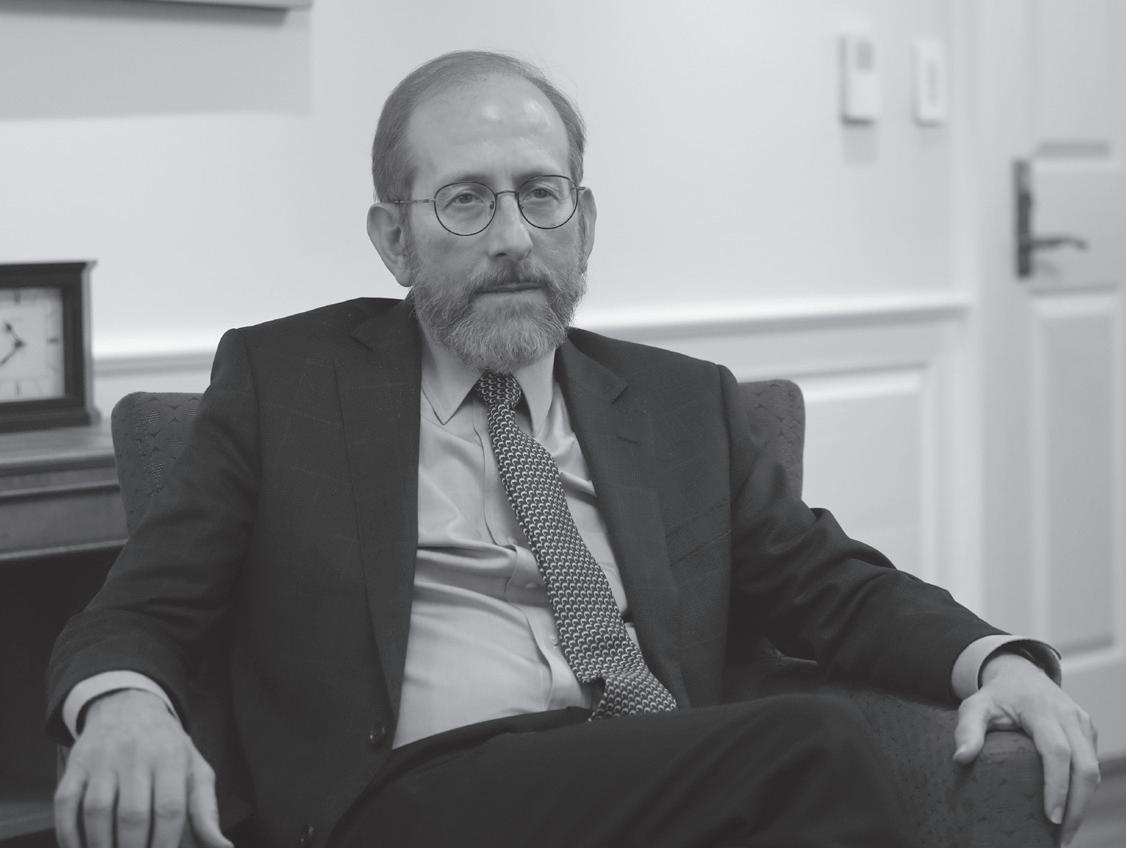
Team Elise, Stefanik’s political operation, announced she raised more than $7.1 million in the first quarter of 2024, with a significant number of donations coming in response to her tough questioning of Gay and the other university presidents over their response to campus antisemitism — the same that earned her praise from Trump. “Notably, Congresswoman Stefanik raised not only from traditional Republican donors, but also from Democrat donors who feel the Democrat Party has failed to combat and condemn antisemitism,” said Alex DeGrasse, the executive director for Team Elise. “She will continue to address the unacceptable rise of antisemitism at Harvard in addition to other higher ed institutions,” DeGrasse added.
Trump, himself, took direct aim at Harvard over its response to Hamas’ Oct. 7 attack on Israel last November in a post on Truth Social, Trump’s social media app.
“In recent weeks, Americans have been horrified to see students and faculty at Harvard and other once-respected universities expressing support for the savages and jihadists who attacked Israel,” Trump wrote.
Trump’s comments offer a window into how he might approach higher education — and Harvard — if he wins election in November.
In a Truth Social post, Trump said he will tax “excessively large private university endowments” to establish a national university called the “American Academy.” Higher education expert Thom-
as D. Parker said Trump’s proposal indicates that he does not just want to tax Harvard’s endowment, but use it to establish alternative institutions of higher education to promote right-wing policy agendas.
“It would be like a Liberty University, except nationally funded and supported,” Parker said. Levitsky said he expects political attacks on higher education to intensify if Trump wins in 2024.
“We are being targeted by a couple of congressional investigations, and we will come under further assault if Trump wins the White House,” Levitsky said, comparing the political assault on Harvard to how authoritarian governments attack higher education institutions.
“As we see elsewhere — from Turkey, to Hungary, to other authoritarian regimes — universities are independent centers of power that, particularly, right-wing populist forces tend to target,” Levitsky added. When House Committee on Education and the Workforce Chairwoman Virginia Foxx (R-N.C.) threatened Harvard with losing federal funding, Rudenstine said he was reminded of an effort to strip universities of federal funding by former President Ronald Reagan.
“After the Vietnam War protests of the late ’60s into the early ’70s, they tried to cut the federal budget for all kinds of grants and research initiatives, and so on,” Rudenstine said. “Fortunately, the Congress held out, and the cuts did not go through in spite of President Reagan’s efforts.” “We’ve seen this before, and I
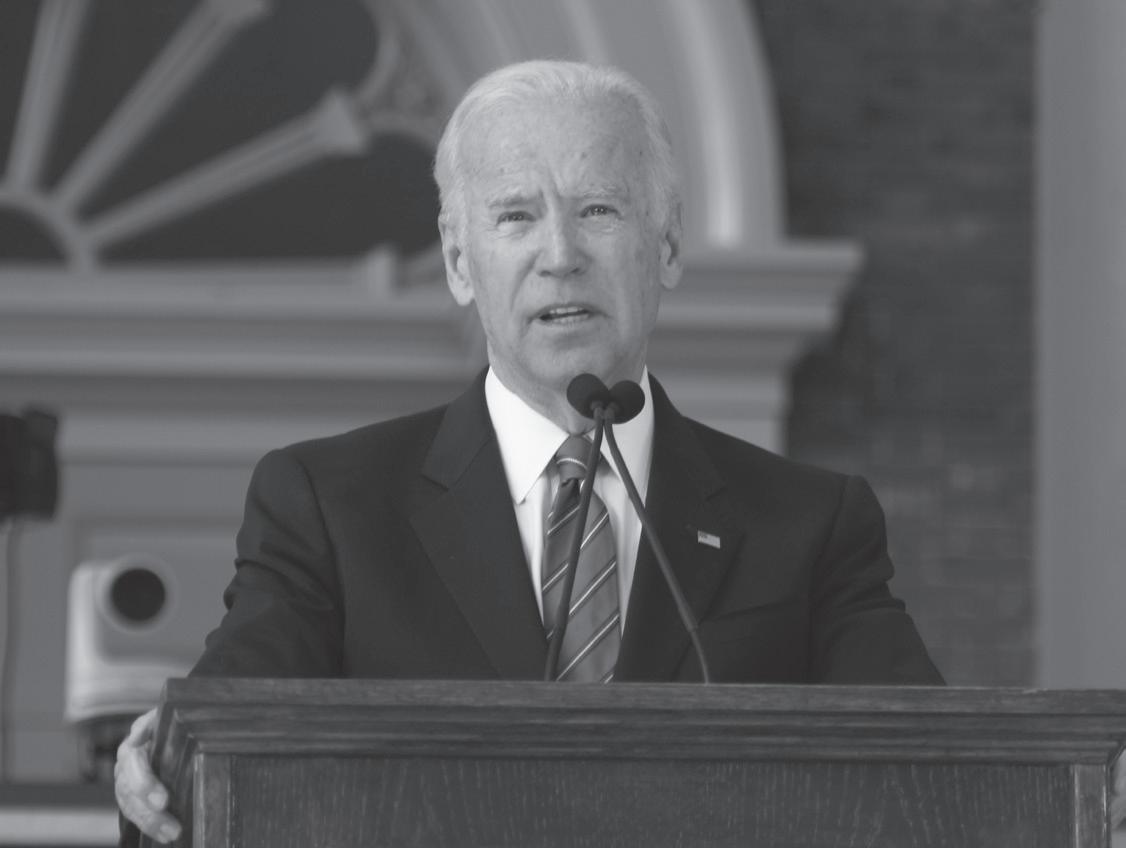
think we’re very likely to see it again if Trump is elected,” Rudenstine added.
How Harvard Should Respond to External Threats
Efforts are currently underway at Harvard to protect the school from repeating its mistakes last fall.
Interim Harvard President Alan M. Garber ’76 announced an “Institutional Voice Working Group” to explore when and whether Harvard should speak out publicly. Harvard has also engaged former U.S. Deputy Attorney General Sally Q. Yates to represent Harvard in the ongoing congressional investigation into campus antisemitism.
But while these efforts indicate Harvard is prepared to defend itself from external attacks, Levitsky said the next president’s must strengthen Harvard internally.
“It’s very important that institutions like Harvard not be bullied by outside forces — not by donors, not by powerful alums, not by people with big Twitter accounts, not by former presidents, and certainly not by right-wing politicians,” Levitsky added.
Regardless of what happens in the presidential election, Gergen said the University will persevere.
“Harvard is going to survive Trump,” Gergen added. “But it may well be damaged and it may be more difficult to run the institution and let things settle.”
“This is a University with 300 years behind it,” he added. “It’s not going to walk away easily.” While Rudenstine said Harvard remains “fundamentally strong” despite the events of the last six months, he believes the next president must defend free inquiry by reframing the role of universities through public statements.
The next president must also be “very strong in defending freedom of inquiry, freedom of speech, and also the research budgets of NIH, NSF, and other sources,” he said. Fundamentally, Levitsky said the University must protect itself and all of higher education from political attacks out of a responsibility to democracy at large.
and poor transparency at the Graham & Parks Elementary School.
In a statement Thursday morning, CPS spokesperson Sujata Wycoff wrote that there has been “no change in the status” of Greer’s contract, which lasts until through the end of the 2024-2025 academic year. “Superintendent Greer is committed to continuing the impactful work of serving Cambridge students and families alongside each member of CPS’s dedicated staff,” Wycoff wrote. Katherine Christo, executive secretary of the School Committee, did not immediately respond to multiple requests for comment Thursday morning.
Concerns about Greer were expected to come to a head at a March 19 School Committee meeting, when Greer would present her midpoint evaluation and committee members would have an opportunity to question her about her leadership.
But the evaluation never came. Instead, at the meeting’s onset, committee members unanimously voted to delay Greer’s evaluation to Tuesday’s meeting, while they met in two closed-door meetings to discuss whether to renew Greer’s contract. On Tuesday, the committee again postponed the evaluation.
“We expect to provide more information in the coming days,” Mayor E. Denise Simmons said at the meeting before hastily adjourning.
The first major indication of discontent with Greer among School Committee members came last summer, when she received a “needs improvement” rating on her annual evaluation from the committee. In individual comments, members had raised concerns about hiring processes at various elementary schools, particularly Graham & Parks. Committee member David J. Weinstein wrote in his comment that the principal hiring processes for Fletcher-Maynard Academy and Morse School “has been problematic” and that “caregivers reported that the process was rushed” at Graham & Parks. After parents raised allegations that Graham & Parks Principal Kathleen M. Smith fostered a toxic workplace environment, Greer hired an outside law firm to lead an investigation in January. Statistics from a climate survey shared with parents Monday and obtained by The Crimson revealed that only 14 percent of Graham & Parks teachers reported a positive work environment — the lowest among elementary schools in the district. Scrutiny toward Greer ramped
up following Cambridge’s lackluster climate survey results for the 2023-2024 school year. According to survey results, metrics for CPS’ environment fell below nationwide medians for parents and staff. Cambridge Public Schools was Greer’s
indepen-
he
BY AISLING A. MCLAUGHLIN AND MADELINE E. PROCTOR CRIMSON STAFF WRITERS
“Harvard’s got to grow a pair and stand up for university
dence,”
said.
Harvard’s Presidential Search JONATHAN G. YUAN — CRIMSON PHOTOGRAPHER ELECTION. In November, Donald Trump and Joe Biden will face off for the U.S. presidency. The result could impact Harvard’s own presidential search. Harvard President Alan M. Garber ’76 sits during an interview with The Crimson. MARINA QU — CRIMSON PHOTOGRAPHER aisling.mclaughlin@thecrimson.com madeline.proctor@thecrimson.com U.S. President Joe Biden speaks at Class Day in 2017. LAUREN A. SIERRA — CRIMSON PHOTOGRAPHER The Cambridge School Committee has asked Superintendent Victoria L. Greer to voluntarily resign at the end of the school year, according to a person familiar with the situation. The specific terms of the offer and whether Greer had accepted it were still unclear as of Thursday morning. The news caps off a tumultuous year for Greer, whose leadership had been viewed with increasing scrutiny from parents and Cambridge School Committee members alike, largely over hiring practices and her handling of allegations of toxicity
second superintendent position in Massachusetts following a four-year tenure in Sharon. After the Sharon School Committee decided in July 2020 not to renew her contract, Greer alleged that the decision came as retaliation for complaints of racial discrimination she had made against Sharon School Committee members. Greer filed a charge of racial discrimination against the Sharon School Committee after they placed her on administrative leave in September 2020, nine months before her contract was set to end. The two parties eventually settled, with Greer receiving a $750,000 settlement. Greer returned to Cambridge to serve as interim superintendent in July 2021, after serving as a CPS assistant superintendent from 2013 to 2017. In February 2022, she officially became CPS Superintendent. In her statement, Wycoff wrote that Greer “has demonstrated steadfast leadership and her tenure thus far has been marked with several key accomplishments.” She lauded Greer for improving MCAS test scores to pre-pandemic levels, overseeing a decline in “chronic absenteeism,” and aligning math and literacy curricula across Cambridge schools. Greer’s current contract is set to expire on June 30, 2025. Cambridge School Committee Asks Superintendent Greer to Resign BY DARCY G LIN AND EMILY T. SCHWARTZ CRIMSON STAFF WRITERS darcy.lin@thecrimson.com emily.schwartz@thecrimson.com COVER STORY 7 APRIL 5, 2024 THE HARVARD CRIMSON
When Janet L. Steinmayer was appointed president of Lesley University in 2019, she took the helm of a small liberal arts institution facing declining student enrollment, a $10 million budget deficit, and its fourth president in three years. Steinmayer was tasked with consolidating academic programs, reducing the budget deficit, and increasing enrollment on the eve of the pandemic and at a time when small colleges across the Northeast were already struggling with a decrease in applicants. Nearly five years later and 15 months into Steinmayer’s “Better Lesley” plan, low-enrollment programs have been cut, a $100 million campus renovation plan to consolidate and sell unused buildings is underway, and the university is on a plan to reach financial equilibrium by the 2026 fiscal year.
But in the process, the university has laid off nearly 20 percent of core faculty members, cut most of its social science programs, and seen enrollment drop by an additional 45 percent since 2019 — all while amassing more than $100 million in debt.
Now, faculty and students have revolted, saying in interviews and in three faculty votes of no confidence that Steinmayer is not the right person to lead the university through a time of peril.
While Harvard began to make international headlines over its handling of antisemitism on campus and Claudine Gay’s leadership in fall 2023, its lower-profile neighbor in Cambridge had spiraled into a full-blown crisis of its own. Steinmayer, with the backing of the university’s Board of Trustees, has held her ground, insisting that her administration will succeed at restoring stability to Lesley.
“Lesley is undergoing a series of changes that are designed to set it up for the future, avoid the fate of a growing number of small colleges and universities, and create a university that better serves its students and is more vibrant academically,” a university spokesperson wrote in a statement. Steinmayer declined to be interviewed for this article.
But more than a dozen faculty, students, and alumni interviewed by The Crimson said that the problem starts with Steinmayer herself. “The president is always saying that faculty don’t understand that change has to come. And we do understand,” said Steve Benson, the chief steward of Lesley’s faculty union. “We just don’t think the direction that’s going in is the direction that’s going to bring good change.” “We asked for the president to resign,” added Benson, a former chair of the faculty assembly. “That’s the change we want.”
‘Program Updates’
Senior and political science major Mia E. Dillon was sitting in class on Oct. 4 when she received an email from Lesley’s chief operations officer, Joanne Kossuth, with the subject line “Program updates.” The email stated that the political science program was being “sunset” as part of “university efforts to streamline programs and academic offerings” and would not be available to new, incoming students. The email assured Dillon that she would be able to graduate with her degree in political science. Dillon wasn’t aware of the faculty layoffs tied to the program changes until she spoke with her political science professor, Michael Illuzzi, later that day. “I could just see it on his face,” she said. “He looked sick, and I felt sick.” Illuzzi is one of 30 core Lesley faculty who learned on Oct. 4 and 5 that they were being laid off, though many were asked to continue teaching through the spring. The layoffs also included more than 20 staff members.
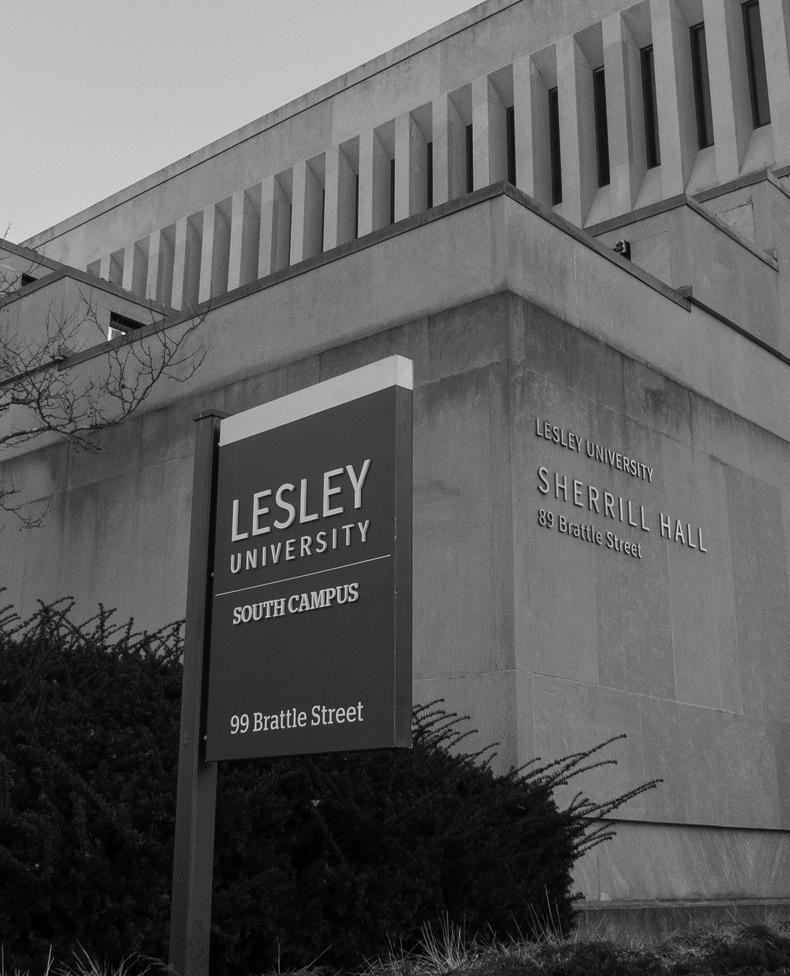
The news was accompanied by a video message from Steinmayer — her primary means of communicating with Lesley affiliates since 2023 — where she addressed the “difficult” choice to “let go of some valued colleagues.”
In a subsequent video released on Nov. 15, she made the reasons for the changes clearer. “Lesley had evolved over time to a structure that was only appropriate to a much larger university, not to the number of students we actually serve,” she said.
The president is always saying that faculty don’t understand that change has to come. And we do understand. We just don’t think the direction that’s going in is the direction that’s going to bring good change.
All told, the university cut four academic programs — political science, global studies, sociology, and a graduate program in photography — as part of a move to “re-focus on Lesley’s core strengths,” according to an Oct. 4
email from Steinmayer to the university.
Beyond the four majors to fully get the ax, the layoffs could effectively eliminate others.
Of the three faculty responsible for teaching classes in the English major, two were laid off, and a third was promoted to a non-teaching position in the administration.
“Supposedly, Lesley is not eliminating the English major,” said Mary Dockray-Miller, one of the English professors laid off in October. “But you’ve eliminated all the faculty who teach the English major. So how is that going to work?”
Lesley’s Science and Mathematics department went from around a dozen professors to just 2.5 full-time equivalent faculty, none of whom teach chemistry or physics classes required for certain majors. The university has not announced any programming changes.
“Students could be enrolling as first-year students at Lesley University, hoping to be health science majors or get a B.S. in biology or a B.S. in environmental science. And I do not know what that looks like, or how that’s pos-
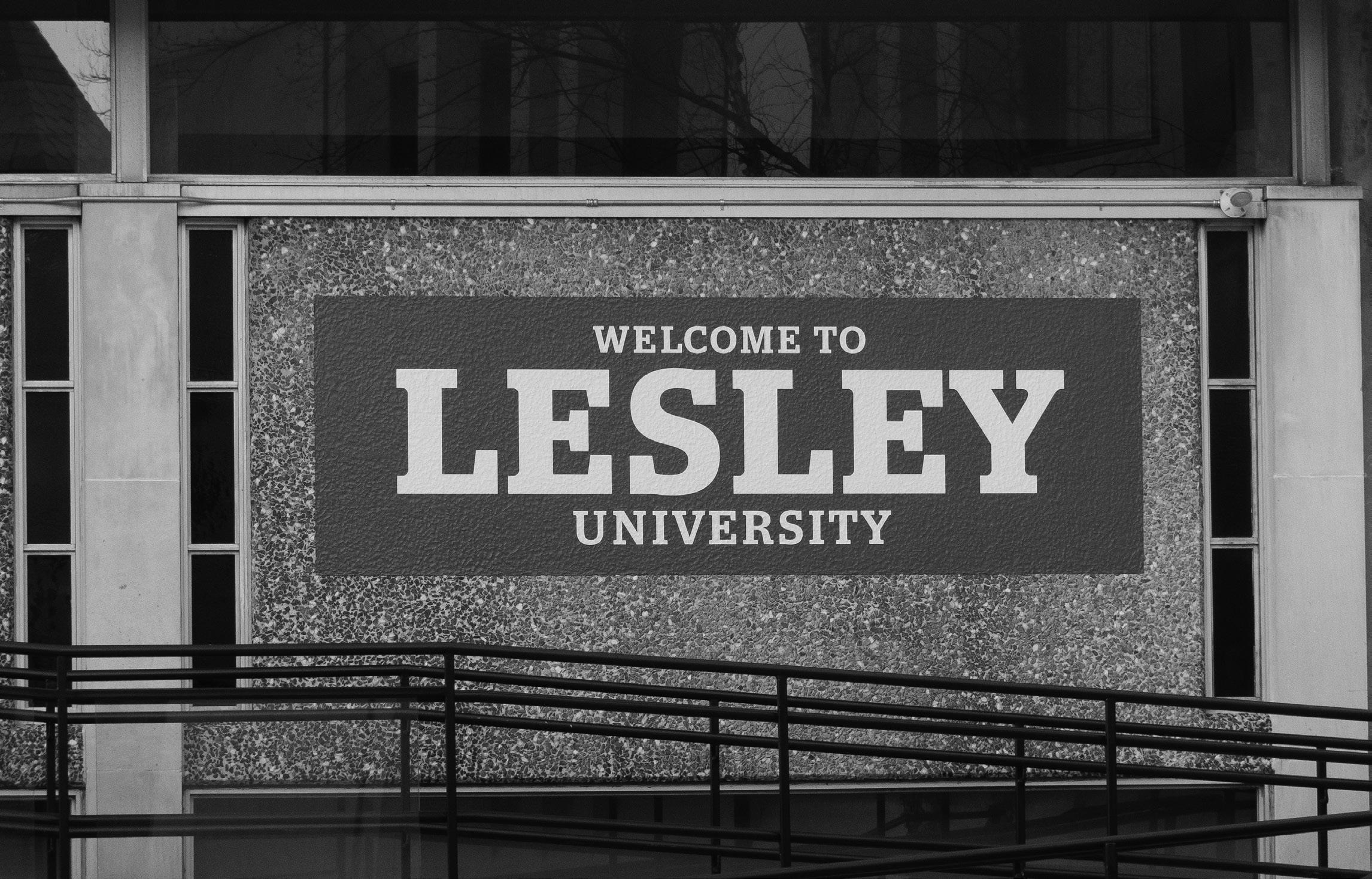
sible,” said Julie Shoemaker, an associate professor of earth science. The belt-tightening has also threatened what many see as a key feature of Lesley’s academic offerings: the graduate school’s Expressive Therapies program, the only in the world to offer degrees in all five expressive therapies: music, dance, drama, art, and expressive art.
Of the program’s fewer than 30 core faculty positions, 10 are currently filled by temporary faculty. The music therapy program has lacked a single permanent core faculty member for the past three years, endangering its accreditation with the American Music Therapy Association. A job listing for the position was only posted in February following sustained student activism. The news of the layoffs came as a surprise to faculty and students, including Illuzzi’s own department chair.
“It’s just strange,” Illuzzi said in an interview. “Why would you fire 20 percent of the faculty mid-semester?”
In the October video, Steinmayer seemed to anticipate the reaction they would elicit among students and professors.
“That may sound like we’re taking a pair of scissors to Lesley, but that’s not it,” she said.
In three subsequent videos released over the next six weeks, Steinmayer continued defending the university’s handling of the program changes and layoffs.
“There has been speculation that Lesley is moving away from the liberal arts and humanities. That is not true,” she said in an Oct. 19 video.
“We hear that people are worried and sometimes angry,” she said in a Nov. 2 video, adding that “another word I keep hearing over and over is heartbroken. It is hard for our university to undergo the essential changes that the new demographics and changes in higher education in general are demanding that we make.”
“At its heart, Better Lesley is a promise for the future,” she said.
“We all need to work together to keep it.”
Since the October announcement, the university has announced that five of the faculty members initially identified for layoff will remain at the university in other positions and an additional faculty member will have a revised contract. Lesley faculty do not have tenure, and are instead hired on contracts with three, five, or eightyear terms. According to Benson, more than a dozen impacted faculty members — whose median age is 63 — have filed lawsuits with the Massachusetts Commission Against Discrimination, specifically about age and race discrimination. Many laid-off faculty members expressed concerns about finding other jobs, citing their age and the timeline for academic job applications, which typically begins around August. “I’m 76 years old,” said Donna Halper, an associate professor at the university. “You think realistically speaking, that the average place is going to hire me?” Miller, who has been teaching at Lesley for 23 years, said that she thinks the chances of her getting another job in the fall are “practically zero.” “No one is hiring senior humanities faculty,” she said. A ‘Better Lesley’ The ire toward Steinmayer began well before she announced Lesley’s restructuring. Late in 2021, 100 students and faculty members gathered on campus to protest problems with clean water, dorm heating, food safety, transportation, and campus security — what they said was the administration’s refusal to meet “basic human needs.” The protest came as faculty and students began to feel increasingly
shut out of university governance. Faculty representatives on the Board of Trustees said they became sidelined from the body, asked only to stay for the beginning of the meetings and given almost no opportunities to provide feedback. The Board’s student advisory committee had also ceased meeting during the pandemic, according to current and former faculty representatives on the Board. Things came to a head later in December, when the faculty assembly issued its first vote of no confidence against Steinmayer. Only two years after her appointment and even before major program change announcements, Steinmayer was under fire from all directions. Steinmayer and the Board’s How Lesley University Descended
Crisis Lesley and its president have come under fire for program changes and layoffs as the university restructures. BRIANA HOWARD PAGÁN — CRIMSON PHOTOGRAPHER METRO 8 APRIL 5, 2024 THE HARVARD CRIMSON BY JULIAN J. GIORDANO CRIMSON STAFF WRITER CAMBRIDGE UNCERTAIN FUTURE. As Harvard began to make international headlines in fall 2023, its lower-profile neighbor in Cambridge had spiraled into a fullblown upheaval of its own. Lesley University has three small campuses in Cambridge between Harvard Square and Porter Square. BRIANA HOWARD PAGÁN — CRIMSON PHOTOGRAPHER
Into
Steve Benson Chief Steward of Lesley’s Faculty Union “
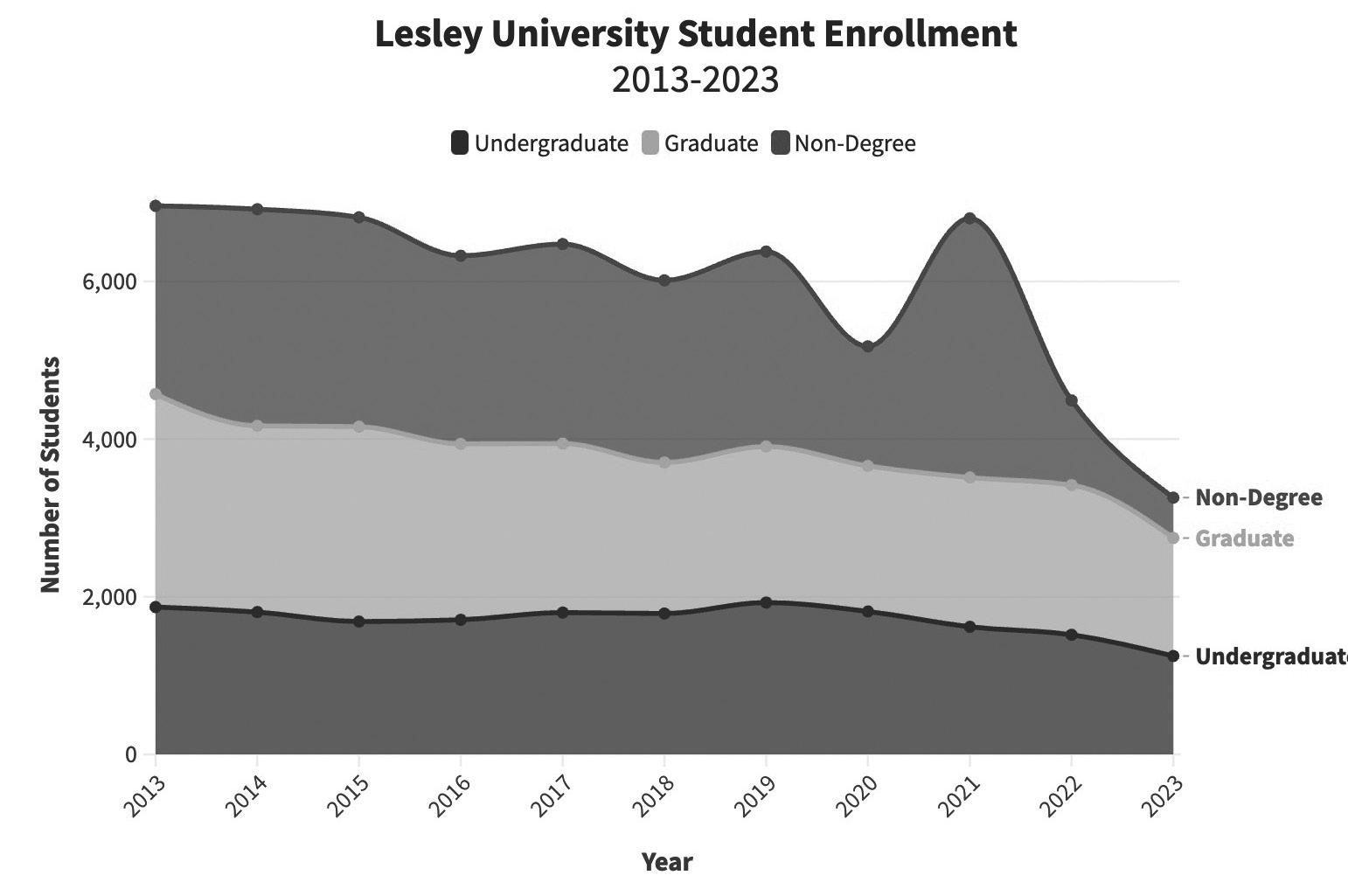
“Better Lesley” initiative, announced in January 2023, was supposed to restore trust in the university’s leadership and usher Lesley into a period of health and stability.
In early 2023, the university convened eight cross-university task forces to look at how the university could optimize enrollment, academic and non-academic initiatives, and its financial and campus plans.
In March, the administration presented its finding to the Board of Trustees, which charged Steinmayer with three goals: to refocus on Lesley’s strengths and move away from low-enrolled programs, to operate as “One University” by academically and administratively restructuring, and to continue the university’s pre-existing Strategic Framework campus renovation plan
“This may be the most difficult phase of rebuilding for Lesley, but necessary if we are to remain affordable and in demand,” Steinmayer said in a May update video.
But the restructuring only inflamed worries about the direction Lesley was taking under her leadership.
Grace Ferris, then the chair of the faculty assembly, pointed out that the plan was being undertaken while Lesley was without a permanent chief financial officer. The CFO position had been unfilled since 2021, and a new CFO was only announced in March.
The faculty as a whole responded as well, passing a second no confidence vote just a month after Steinmayer announced Better Lesley.
“Decisions made by the university’s leadership have eroded the student experience and endangered the long-term viability of some academic programs,” they wrote.
Steinmayer was undeterred.
“While we appreciate how stressful change can be,” a statement from a university spokesperson to the Cambridge Day after the vote read, “Lesley has the right leadership, and the board
union steward, adding that since Steimayer assumed office, he has noticed the “corporatization of Lesley.” The faculty also issued its second vote of no confidence against the Board of Trustees and its first vote of no confidence against interim Provost Deanna Yameen, calling for the immediate resignations of Steinmayer and Yameen.
Undergraduate student activists at Lesley joined the call for Steinmayer’s resignation in March.
Steinmayer has held her ground, and the Board of Trustees has continued to back her. A February statement from Steinmayer after the February no-confidence vote stated that the Board “remains steadfast in its support of our administration and in the Better Lesley initiative.” “We encourage all faculty members to collaborate in moving Lesley forward,” read the statement, “so it does not suffer the fate of a growing number of small colleges and universities nationwide.”
But faculty and students said they tried to communicate their concerns to Steinmayer and top leadership — to no avail. “There’s very controlled channels of information,” said Shoemaker, the associate professor. “You’re not allowed to talk to people higher up in the chain.”
Bailey Haines, the president of Lelsey’s student government from fall 2020 through spring 2022, said that she had difficulty communicating with Steinmayer and other administrators, from whom she said she experienced a “strong sense of apathy.” “I know how to inform someone, I’m happy to do that,” she said. “But how do I make someone care?”
Jason Butler, the former chair of the expressive therapies department, said he stepped down from his position at the end of 2023 because the Better Lesley reorganization and university leadership had made his job “impossible.”
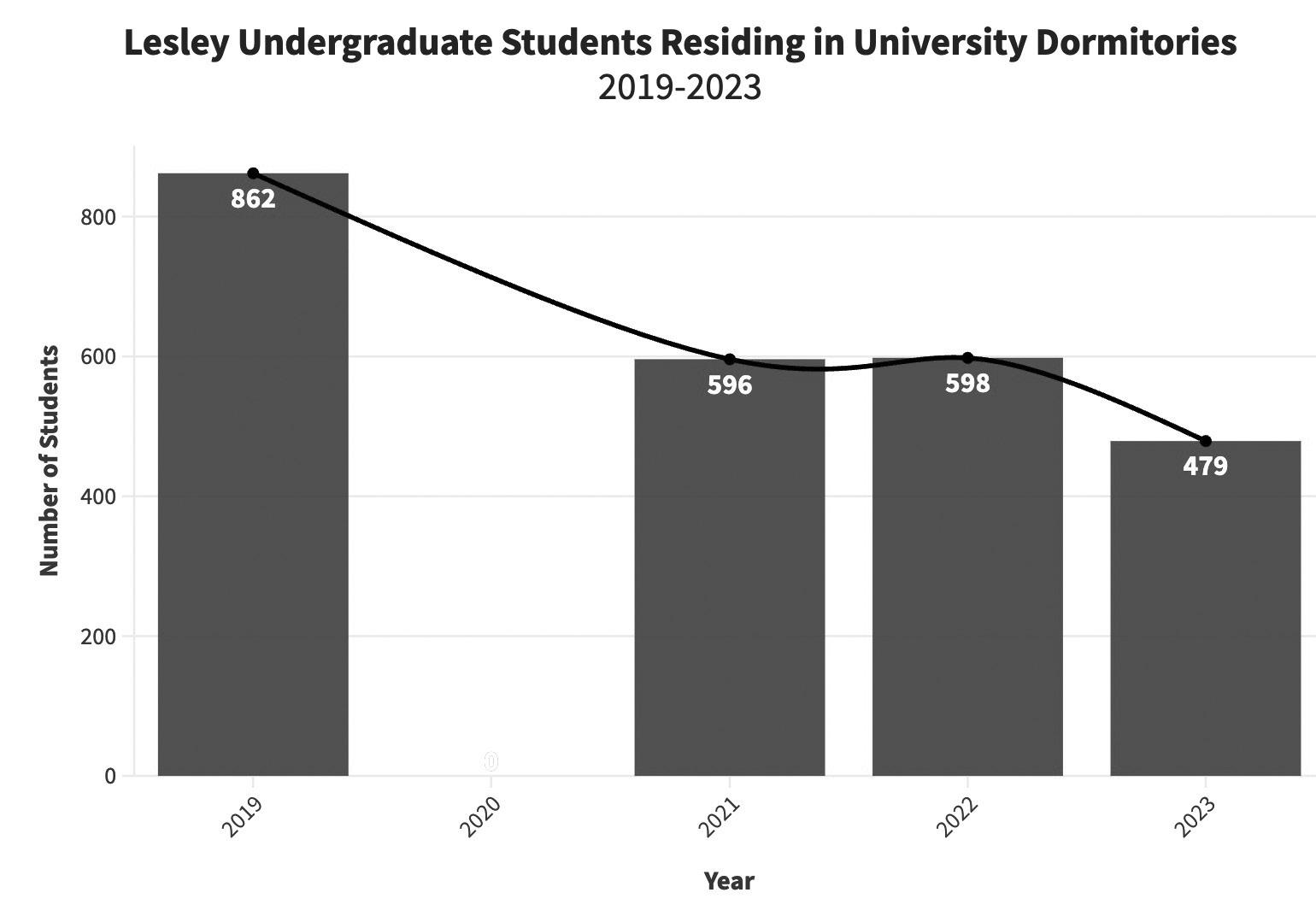
we get stonewalled in trying to talk to Janet or the board, the more it becomes ‘us and them.’” “Can we have coffee with Janet Steinmayer?” she added.
‘A Canary in a Coal Mine’
On Saturday, March 23, half a dozen students and faculty stood under umbrellas and ponchos in the rain at the entrance to Lesley’s University Hall, holding posters and handing out flyers to recently admitted students and their families attending Accepted Students Day. The posters read “Mismanagement is NOT leadership” and “Education is not a commodity! People over profit!” The protesters’ flyers addressed Steinmayer’s
providing increased financial support for those in need,” the email read. Magennis says she is currently planning to transfer out of Lesley, and that many of her classmates are as well.
“I was in a class last semester and the professor asked how many of us are thinking about transferring and over half the class raised our hands,” she said. “I know half those people are already transferred out. And if you’re not thinking about transferring now, you’re thinking about transferring next semester.”
In her January update video, Steinmayer said Lesley’s inquiries from prospective students were up 54 percent and final enrollments up 28 percent. And in
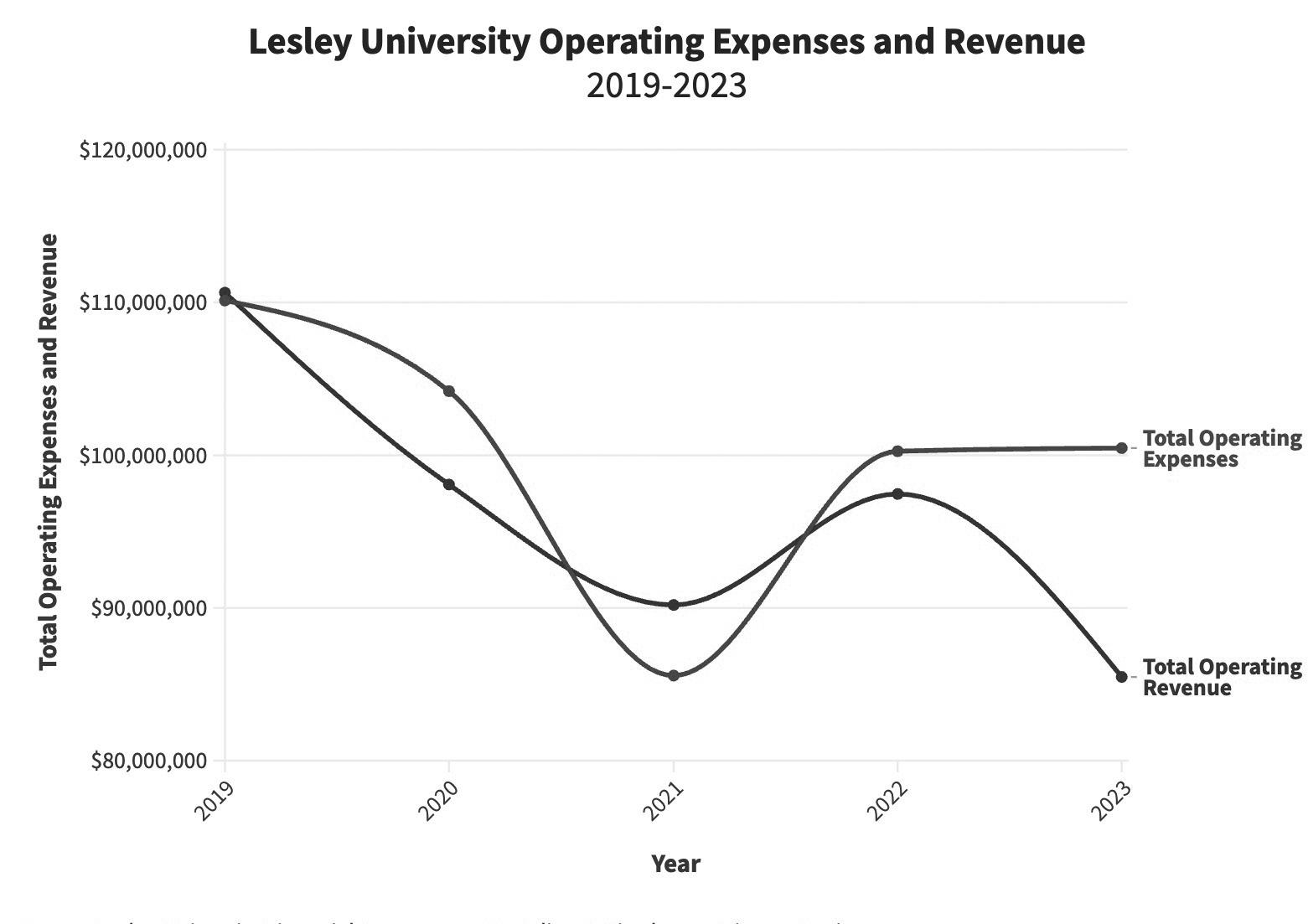
salary, which rose from around $250,000 in the 2020 fiscal year to around $530,000 in the 2022 fiscal year. “Is this how you want your tuition dollars to be spent?” the flyers asked.
The protesters said their goal wasn’t to encourage admitted students not to enroll, but simply to inform them about the changes taking place at Lesley. “We’re not telling anyone not to come here,” said Benson, the professor and union steward. “We’re trying to explain to them what’s happening.”
“Lesley in many cases sold students and faculty members on false promises of being a social justice University, a university that cared about creating well-rounded citizens and all these things that they don’t deliver on,” Frisella added. “We had to disrupt them at the place where they’re doing the false advertising.”
her March update video, she said that registrations for the spring semester have increased for the first time since 2020, by more than five percent.
“Given the trends at colleges nationwide this is something to celebrate,” she said. Faculty and students agreed that the problems facing Lesley were reflective of national trends: declining enrollment, post-pandemic budget deficits, and political backlash against higher education. But they said the school’s response has been an ineffective remedy.
Lesley professor Donna San Antonio said a “perfect storm of factors” have “turned a lot of universities and colleges upside down.”
“I think that we’re a canary in a coal mine,” said Dockray-Miller. “Lesley is part of this trend towards eliminating non-professional, non-technical, non-vocational academic programs at non-elite schools. And I think it’s really, really sad.” Haines, the former student government president, said that while her experience at Lesley was “a very transformative one,” she “cannot in good faith recommend this school” to prospective students.
“When I think of Lesley and I think about the good parts of Lesley, it’s because of its people,” she said. “I think the students are special. I think the faculty and staff are fabulous.”
“But with the leadership and with all of the things that are happening that are really trying to bar and take apart all of the things that make Lesley so beautiful,” Haines said. “I can’t vouch for that.”
Despite the backlash, Steinmayer has continued to insist that things are looking up for Lesley. In her March video, she said the university is making progress on reimagining its academic structure and that construction on the new campus plan is underway.
“We’re well on our way into what we believe will be a new model for small private universities like ours,” Steinmayer said. “One that not only can weather the economic pressures
and the administration are committed to using this opportunity to create a bright future for Lesley that is tailored to the challenges for the next few decades.”
Lesley was dealt another blow in December 2023, when S&P Global Ratings lowered their credit rating from BBB+ to BBB, citing “anticipated negative margins over the next few years, and pressured and weakening undergraduate demand profile” as the university navigated restructuring under “Better Lesley.” “The outlook is negative,” S&P wrote in a report.
On Feb. 27, the faculty assembly passed a third vote of no confidence against Steinmayer. This time, the assembly’s release included an appendix alleging “continued financial mismanagement as evidenced by the increases in management salaries and budgets, while salaries and budgets in instruction have declined.” “They’re focusing more on the structure than the actual problems and needs of the people that are here,” said Benson, the chief
“I felt that I had been trying to advocate for the needs of the department, and that the advocacy hadn’t moved anything anywhere,” he said.
In a statement, a university spokesperson declined to comment on individual criticisms of Steinmayer’s leadership, writing that many of them were “based on misinformation.” “It is inevitable that there will be strong opinions on these changes and the leaders required to make them, particularly where individuals have been personally affected,” wrote the spokesperson.
Sandi C. Hammond, a student in the music therapy program, was one of several students to meet with Lesley’s provost and assistant provost about the lack of core faculty in the program as it nears the accreditation process. She said she emerged feeling like the administrators cared about the situation and “are trying very hard to play catch up and work with us.”
“I don’t want an ‘us and them,’” Hammond added. “But the more
A spokesperson for Lesley wrote in a statement to Cambridge Day that “the university was delighted to welcome over 300 people, students and their families to Accepted Students Day” and that “no questions were asked about Better Lesley” during open conversations with faculty and staff, “although we are very happy to answer those questions.”
Keaveny Magennis, a sophomore studying environmental science at Lesley, said she was telling students at the open house: “Don’t make the same mistake I did.”
“They’re raising tuition,” she added, referencing a 4.5 percent increase to tuition, fees, and room and board announced earlier that week. “They’re gonna make you pay more for a worse quality education, and they’re not gonna care about you.”
In an email announcing the increases, the associate vice president for student financial services wrote that it is “in line with our peers and many universities nationwide.”
“Despite rising costs to maintain our facilities, deliver robust academic offerings and provide quality living experiences, our goal is to keep our rates as manageable as possible for our students and families, while also

the
for the education and experience of our students.” “Spring is
she added. METRO 9 APRIL 5, 2024 THE HARVARD CRIMSON julian.giordano@thecrimson.com Source: Lesley University Financial Statements. JULIAN J. GIORDANO — CRIMSON DESIGNER Source: Lesley University Financial Statements. JULIAN J. GIORDANO — CRIMSON DESIGNER Source: Lesley University Financial Statements. JULIAN J. GIORDANO — CRIMSON DESIGNER Lesley faculty and students protest outside Lesley’s University Hall at an accepted students day event on Saturday, March 23. JULIAN J. GIORDANO — CRIMSON PHOTOGRAPHER THC Read more at THECRIMSON.COM
word I keep hearing over and over is heartbroken. It is hard for our university to undergo the essential changes that the new demographics and changes in higher education in general are demanding that we make. Janet L. Steinmayer Lesley University President “ 45 15 Lesley’s total student enrollment has decreased by more than 45 percent since 2019 and by more than 53% since 2013. The number of students living in university dormitories has declined by more than 40 percent since 2019. Faculty and students agreed that the problems facing Lesley were reflective of national trends: declining enrollment, post-pandemic budget deficits, and general political backlash against higher education. Lesley president Janet L. Steinmayer announced the start of the “Better Lesley” initiative 15 months ago in Jan. 2023. The Board of Trustees charged Steinmayer with three goals: to refocus on Lesley’s strengths and move away from low-enrolled programs, to operate as “One University” by restructuring, and to continue the university’s pre-existing Strategic Framework campus renovation plan. Lesley University has spiraled into a full-blown crisis as it reckons with declining enrollment, a $10 million budget deficit, and faculty and student anger over faculty layoffs and program changes implemented by president Janet L. Steinmayer. STORY AT A GLANCE Lesley laid off 30 core faculty members — nearly 20 percent of its core faculty — on Oct. 4 and Oct. 5, though five will now remain at the university in other positions and one will have a revised contract. More than 20 staff members were also laid off. 30
of today and thrive into
future but one that at every turn has focus on one goal: what is best
in the air,”
Another
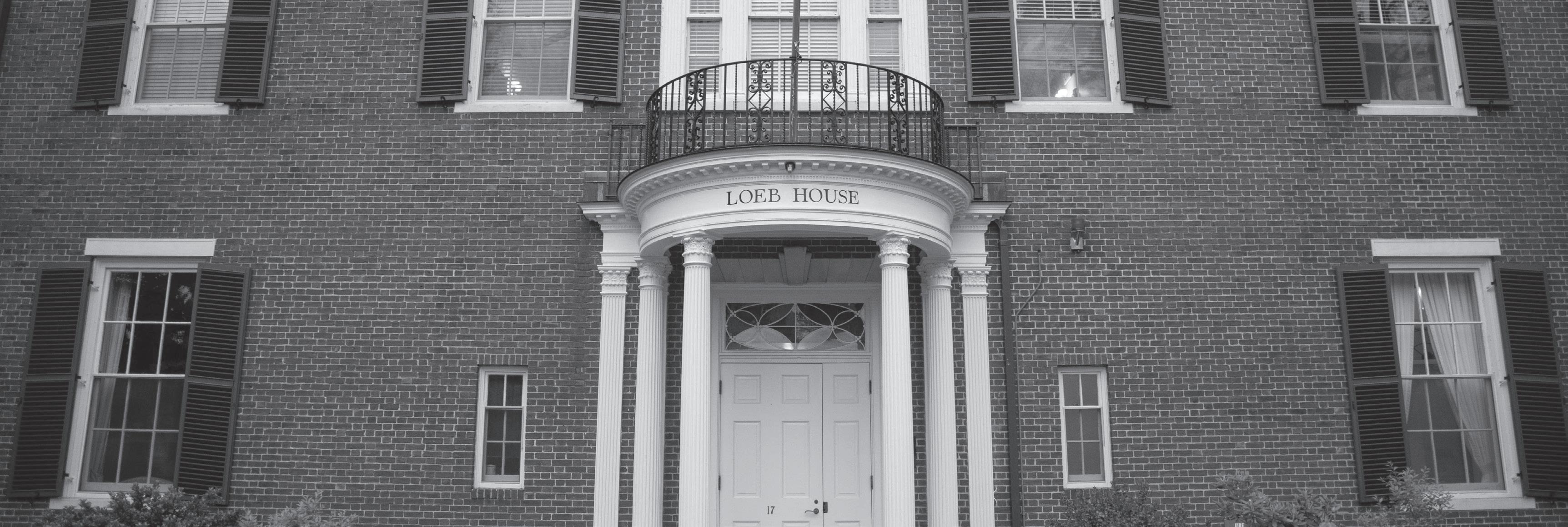
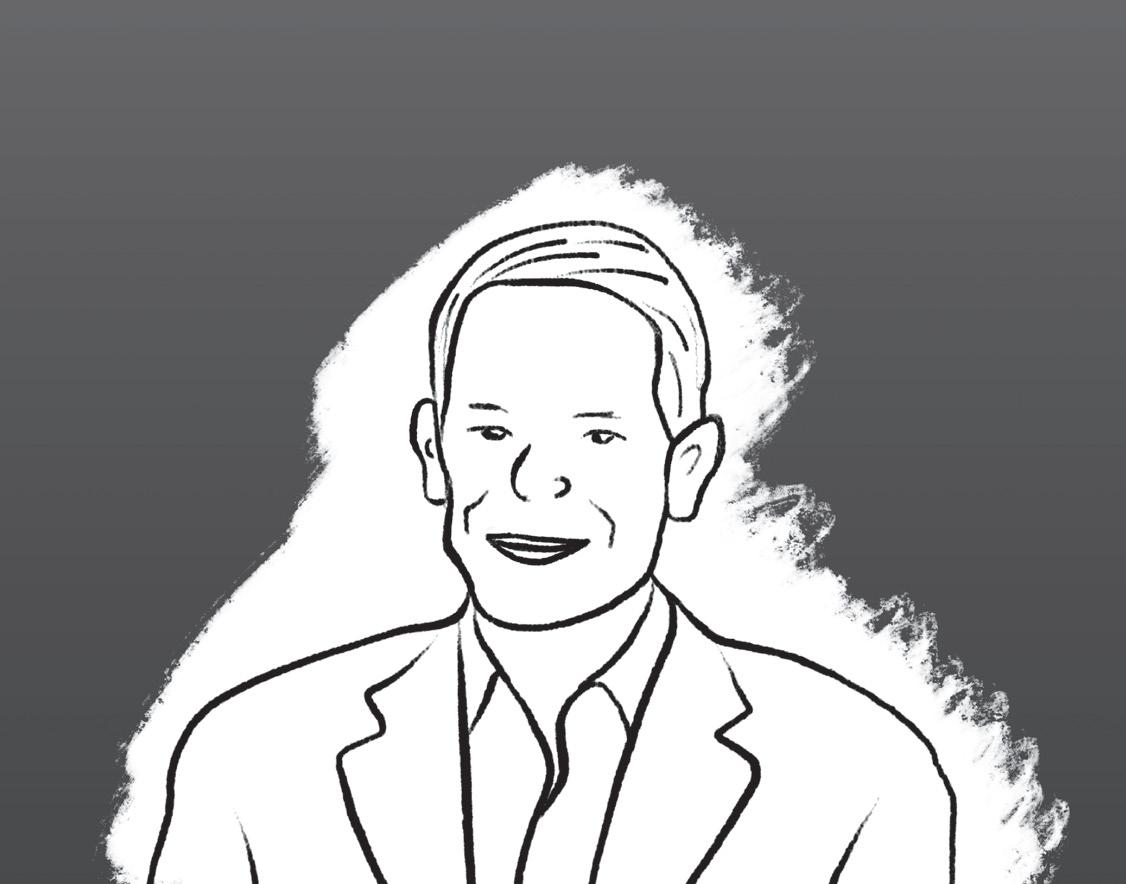
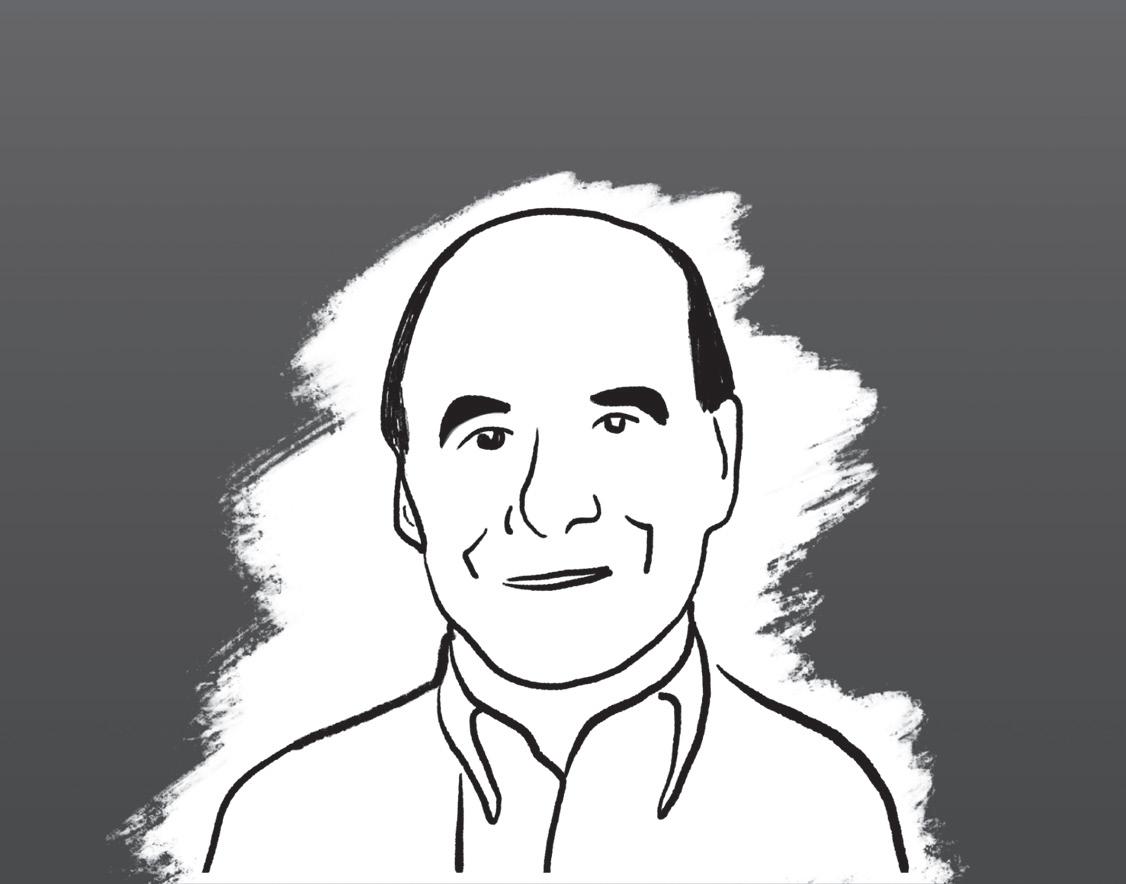
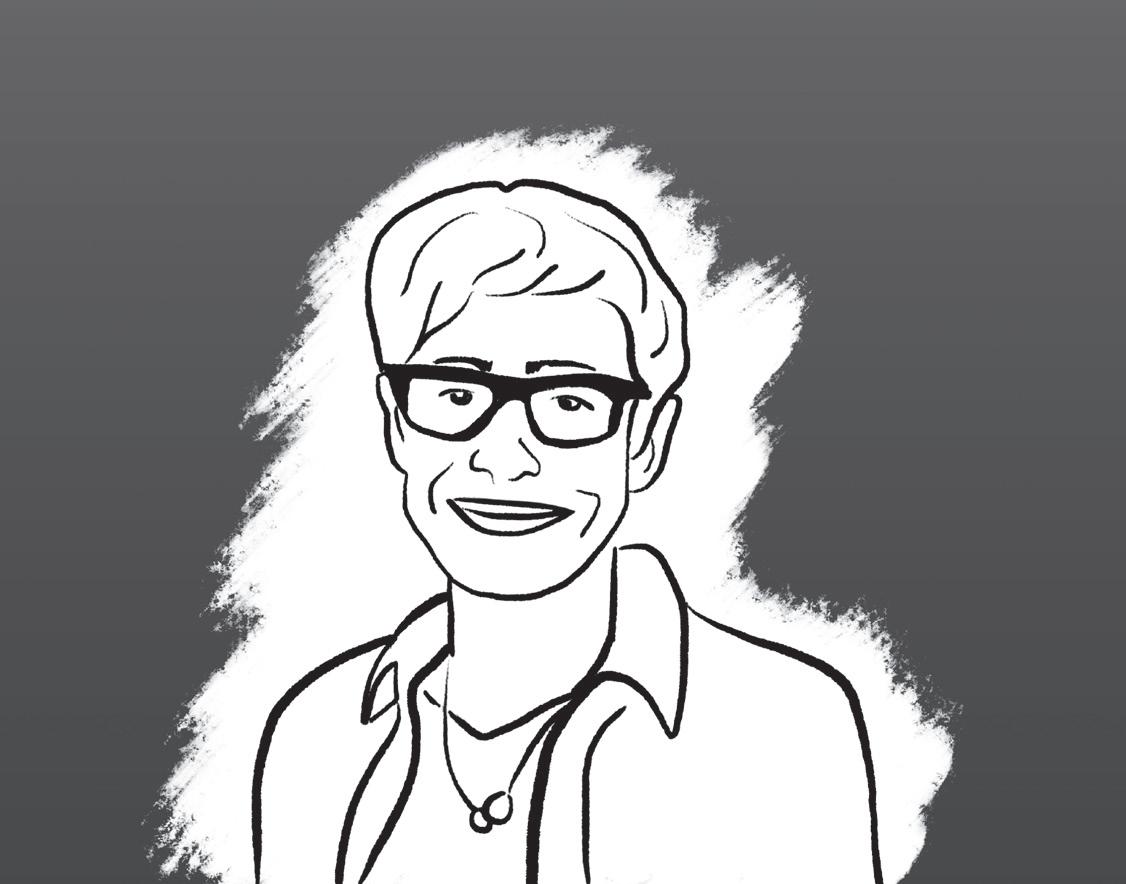
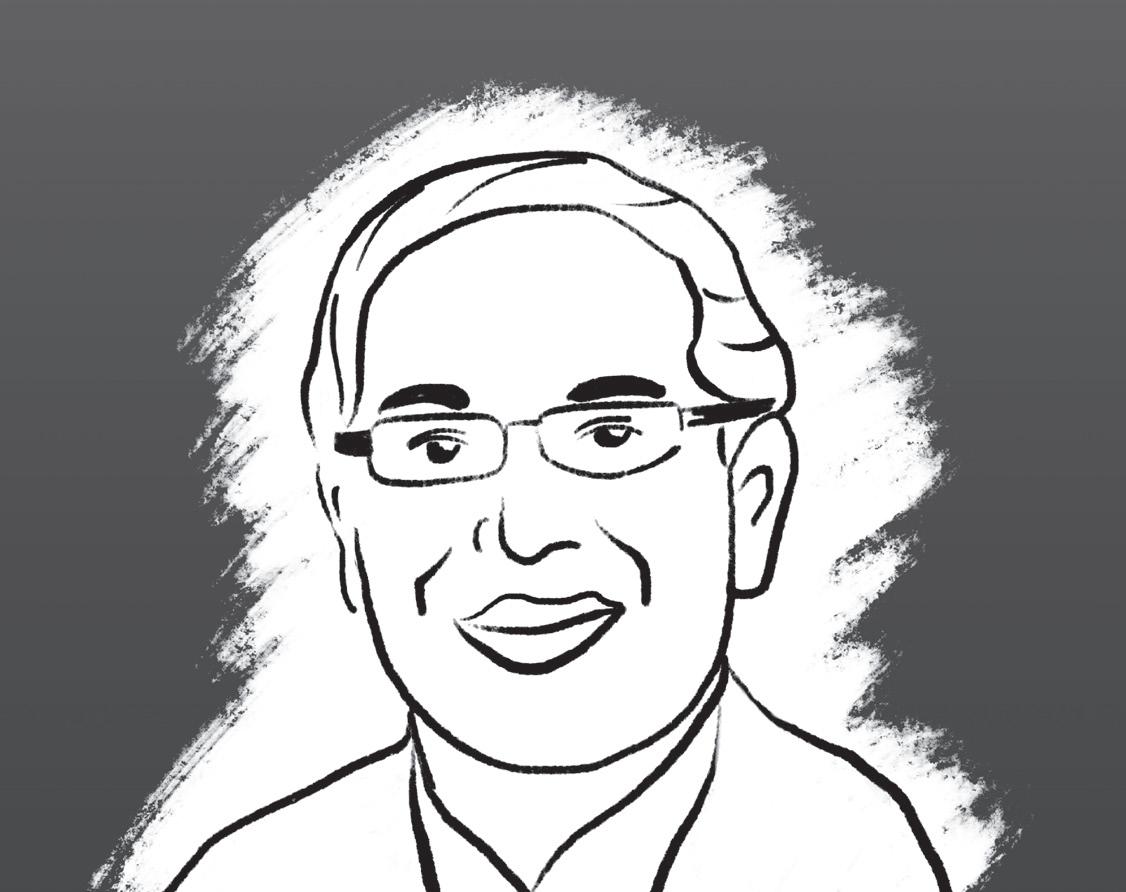
HTim S. Ritchie
We were quite impressed with Ritchie, who came across as direct, honest, thoughtful, and earnestly invested in understanding — and improving — the current state of Harvard. On the Board of Overseers nomination and election process, for example, Ritchie demonstrated notable candor. Regarding institutional neutrality, he outlined a nuanced and thoughtful position. The Board was disappointed by Ritchie’s support of legacy admissions, but it did not overshadow positions that demonstrated nuance, knowledge, and moral decency.
Scott Mead ’77
Mead, a photographer and investor, stood out due to his experience — he currently serves in an interim post on the Board of Overseers — and close familiarity with the most important issues facing Harvard. From his knowledge of the nuances of institutional neutrality to his discussion of the need to preserve world-class regional studies programming while establishing an Ethnic Studies department, Mead’s thoughtfulness was apparent. Also encouraging was his repeated advocacy for Harvard to engage more readily with the public and defend itself against recent attacks.
Danielle A. Feinberg ’96
Feinberg, a Pixar cinematographer, impressed us with her sharp criticism of admissions preferences for legacies and the children of donors and her strong advocacy for revoking tenure from those who betray Harvard’s trust by engaging in misconduct. However, we would have liked to hear deeper discussion of a few key issues facing the University, including in which contexts the University should release public statements on social or political issues. Still, her values, honesty, and unique professional background earned her our support.
Juan A. Sepúlveda ’85
Sepúlveda boasts a strong resumé to support his campaign for the Board of Overseers: The former Rhodes Scholar now works as a political science professor and special advisor for “inclusive excellence” at Trinity University in San Antonio. In our conversation with him, however, we were disappointed by answers that we found noncommittal and vague regarding the issues we see as most pressing in this year’s election, including institutional neutrality, campus culture, and the limits of tenure. In a time of such turmoil, we hope for more decisiveness from those who hope to join the Board of Overseers.
Theodore D. Chuang ’91
The Board felt that Chuang offered succinct, measured responses and exuded a sense of composure befitting his position as a federal judge. From advocating for institutional restraint on social and political issues to emphasizing the role that the Overseers can play in addressing cultural problems of hate and intolerance, his structured responses inspired confidence that he would approach the job with the seriousness it deserves.
Ming Min Hui
The Board was struck by the composed and direct answers from Hui, the executive director of Boston Ballet. We were left duly impressed by her well-reasoned analysis of the complexities of divestment within a framework of institutional neutrality and the need for a culture of trust and empathy in the face of hate on campus. When she didn’t feel familiar enough with issues like the highly-secretive presidential search process to offer a detailed perspective, Hui had the humility to admit the limits of her knowledge, leaving us confident that she would bring the same honesty to the Board of Overseers.
Modupe N. Akinola ’96
Akinola, a Columbia University Business School professor, impressed us with several of her answers — particularly those on admissions preferences for legacies and the children of donors, tenure, and the nuances of institutional neutrality. Her experience in higher education, as well as serving as board president for the Brearley
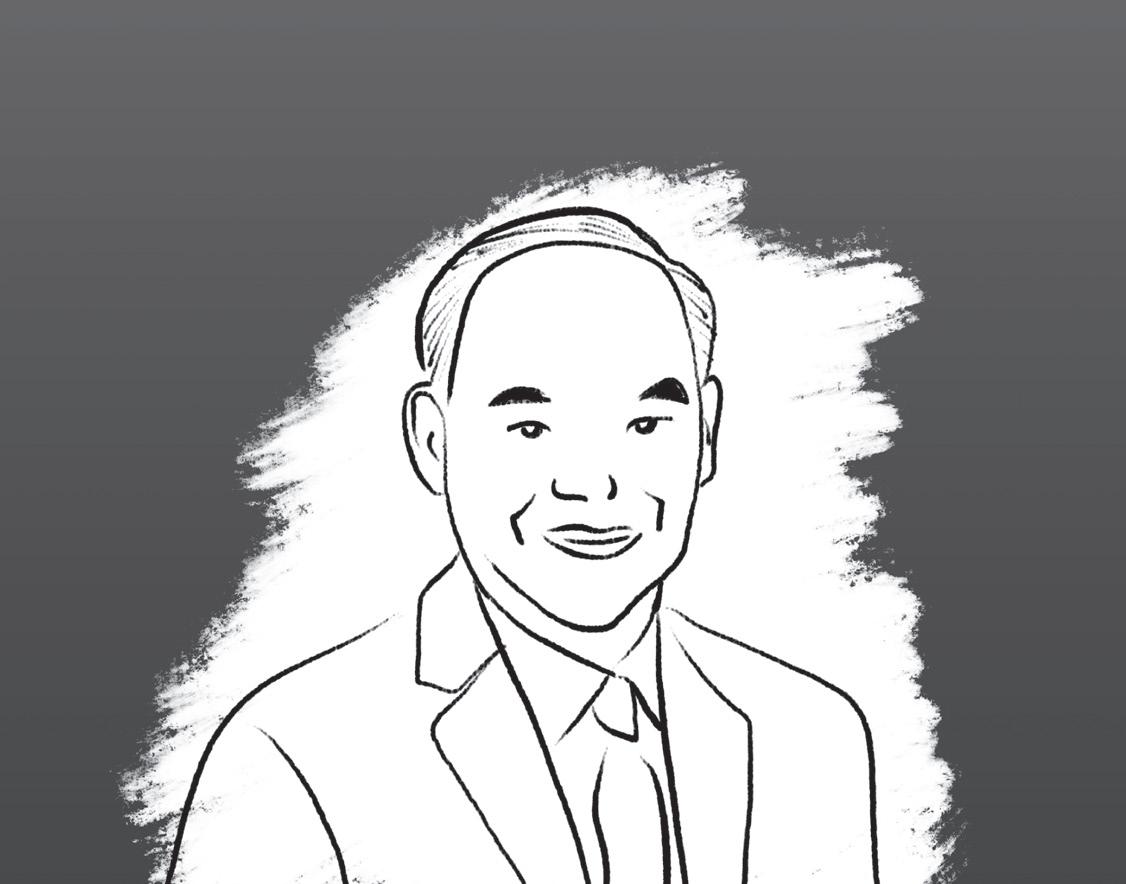
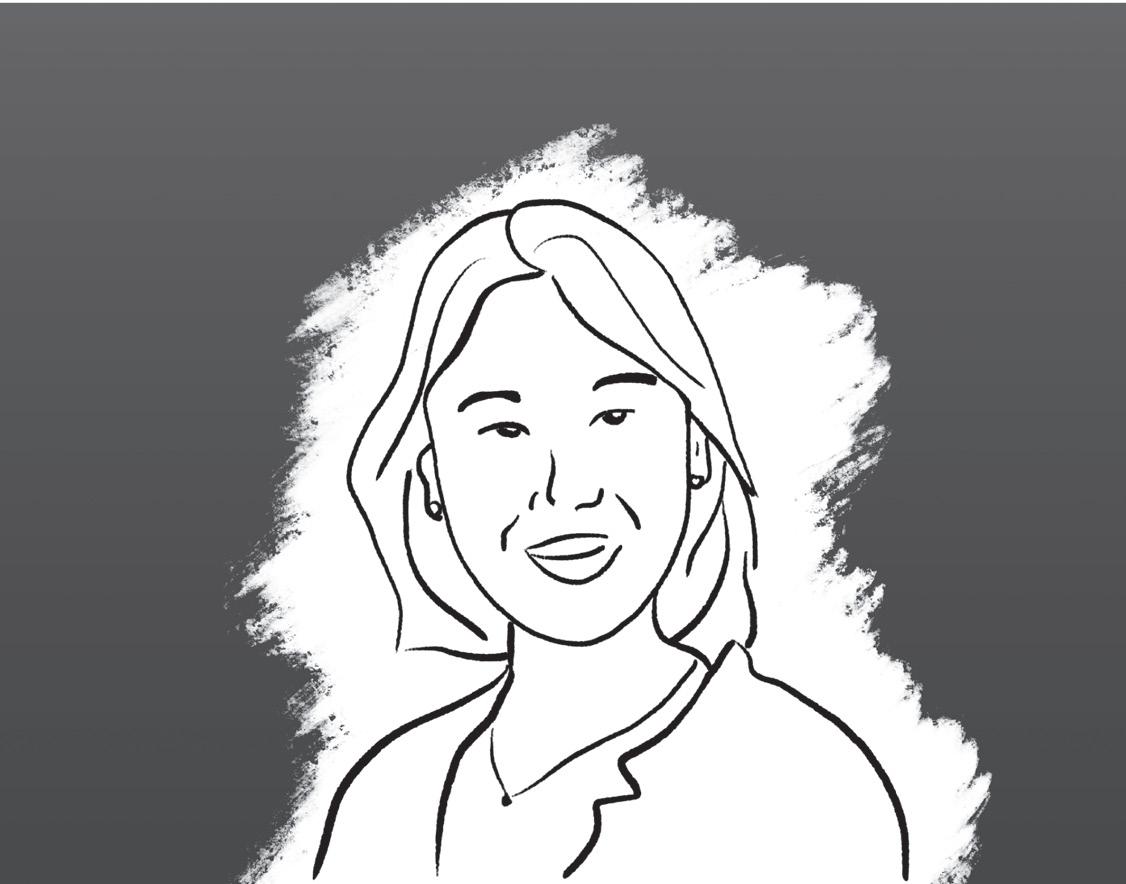

THE HARVARD CRIMSON EDITORIAL 10 APRIL 5, 2024 STAFF EDITORIAL The Editorial Board’s Overseer Endorsements
arvard’s corporate governance has found itself in an unfamiliar place, lately: the spotlight. In recent weeks, the notoriously-opaque Harvard Corporation has come under fire for its failure to better navigate the crises of the past six months. These criticisms have revolved as much around the Corporation’s silence and intransparency as its actions — in no small part because many of those actions remain secret. Against this backdrop, this year’s election for the Board of Overseers, for which voting opened today, takes on a significance unseen in years. As the Corporation continues to be assailed for its secrecy, and as Harvard prepares to chart its course out of this historic crisis, the Board of Overseers — the less powerful but more democratic of Harvard’s two governing boards — provides more direct, accountable, and public-facing representation in University decisions. Among the Harvard Alumni Association’s eight candidates, some stood out as uniquely competent, thoughtful, and well-informed on the issues facing Harvard and higher education. The four candidates who received our strong endorsement were Tim S. Ritchie, Theodore D. Chuang ’91, Scott Mead ’77, and Ming Min Hui. Danielle A. Feinberg ’96 edged out Modupe N. Akinola ’96 for the fifth spot. The following graphic visualizes the rankedchoice votes of the Editorial Board for each of the seven candidates. The width of each bar is determined by points that vary with the rank of each vote. (A first-place rank is worth eight points, a second-place rank is worth seven points, and so on.) The following are
evaluations of each of the seven
we
the Editorial Board’s
candidates
interviewed:
her responses on some issues less substantive
would have liked, Feinberg just edged her out for our endorsement.
UPCOMING ELECTION
the Board of Overseers is the most significant of its kind in recent memory. We interviewed the candidates and offer strong endorsements to four of them. BY THE CRIMSON EDITORIAL BOARD The four candidates who received our strong endorsement were Tim S. Ritchie, Theodore D. Chuang ’91, Scott Mead ’77, and Ming Min Hui. “ Only Editorial Board members who attended all seven candidate interviews were permitted to vote. Voting Editorial editors: Allison P. Farrell ’26, E. Matteo Diaz ’27, Hea Pushpraj 25, Henry P. Moss IV ’26, Ian D. Svetkey ’25, Jacob M. Miller ’25, Jasmine N. Wynn ’27, Julia S. Dan ’26, Julien Berman ’26, Lorenzo Z. Ruiz ’27, M. Aaron Bradford III ’25, Matthew R. Tobin ’27, Max A. Palys ’26, McKenna E. McKrell ’26, Saul I.M. Arnow ’26, Tommy Barone ’25, and Violet T.M. Barron ’26 Photography: Addison Y. Liu ’25 and Frank S. Zhou ’26 Portraits: Sami E. Turner ’25 Web Design: Alexander D. Cai ’25, Dennis E. Eum ’26, Neil H. Shah ’26, and Victoria A. Kauffman ’26. Read more and listen to The Crimson Editorial Board’s interviews with the canidates at THECRIMSON.COM/OPINION
School in New York, would prepare her well to serve on the Board of Overseers. However, because we found
than we
THE
for
Ramadan Mubarak: A Call for Collective Liberation
BY KAWSAR YASIN
My first exposure to a keffiyeh was over a decade ago, when my father brought one home after completing I’tikaf — the practice of living in a mosque for an extended period of time — during the last 10 blessed days of Ramadan. He grew very close with his Gambian, Nigerian, Algerian, Pakistani, and Indian brothers who prayed Tahajjud late at night alongside him.
During his I’tikaf, my father met a Palestinian man and asked what brought him to this remote mosque in Texas. The man explained that this mosque was closest to him during the summer months, when he lived about an hour away. In a tragically ironic twist of fate, the man’s summer home was located in Palestine, Texas — the closest he could get to the homeland from which he had been cruelly expelled.
As an Uyghur, my father too remains exiled from his homeland — for him, the landscapes of East Turkistan exist solely in memory. As an homage to their shared displacement, the Palestinian man gave my father a keffiyeh on one of the final nights of I’tikaf; my family continues to wrap our copies of the Holy Quran in that very keffiyeh to this day.
This is not to say that the struggle for Palestinian liberation is strictly a religious one. The movement must recognize that in addition to Muslims, Jews,
Christians, and other religious minorities live within Palestine.
However, more important than religious identity is the solidarity felt across all oppressed groups, exemplified by the bond forged between my father and the Palestinian man so many years ago in a remote Texas mosque. The two found comfort in their parallel hopes of homecoming, of a return to their lands, freed from occupation.
Despite their natural solidarity, occupying forces have historically driven wedges between men like my father and his Palestinian friend. China, the colonizer of Uyghur lands, supports — hypocritically — the establishment of a Palestinian state and defends the Palestinian people’s right to resist oppression.
Yet in a stunning display of duplicity, the Chinese government also recently detained an estimated 1,000 Tibetans for protesting the development of a dam along the Drichu River in eastern Tibet — a project that would destroy several ancient Tibetan Buddhist monasteries and villages. Evidently, the regime’s endorsement of the Palestinian cause is mere lip service.
Unfortunately, such lip service has led several Uyghur advocacy groups to release statements backing Israel after Oct. 7. Moreover, many Uyghur organizations maintain diplomatic ties or receive support from countries and organizations that also maintain close relations with Israel. These geopolitical barriers to solidarity are a
poignant reminder of the vitriol that swept our campus last semester. Intimidation tactics such as the “doxxing truck” that circled the Square, the purchasing of domains under student names, and the creation of no-hire lists labeling students as “terrorists” ran rampant. Insidiously, students with some of the most marginalized identities — Black, brown, Muslim, undocumented — were targeted.
I was no exception. My face was on the doxxing truck, a domain was purchased under my first and last name, and I was placed on a no-hire list. As one of the few Uyghur students at Harvard, these attacks furthered the language of the oppressor. They echoed rhetoric used by the Chinese government against my people, justifying the concentration camps in East Turkistan and painting Uyghurs as the enemy in the regime’s own war on Terror.
Despite efforts to silence voices like mine — voices that unabashedly advocate for both Uyghur and Palestinian liberation — the inextricably intertwined nature of the Uyghur and Palestinian struggle cannot be denied.
In his 2002 dissertation, Pan Yue, the current commissioner of China’s Ethnic Affairs Commission, called on China to learn from contemporary colonizers such as the United States and Israel to occupy Tibetan and Uyghur lands. Yue describes the westward expansion of the United States together with Israel’s controlled deployment of settlers to the
COLUMN COUNCIL ON ACADEMIC FREEDOM AT HARVARD
Mandatory DEI Statements Are Ideological Pledges of Allegiance. Time to
Abandon Them.
DIVERSITY STATEMENTS inhibit scholars’ ability to freely engage with social issues. Such statements single out DEI as the one issue about which academics are not allowed to disagree, creating a serious threat to academic freedom. They are not an appropriate solution to the real issue of discrimination and lack of diversity in academia.
BY RANDALL L. KENNEDY
On a posting for a position as an assistant professor in international and comparative education at the Harvard Graduate School of Education, applicants are required to submit a CV, a cover letter, a research statement, three letters of reference, three or more writing samples, and a statement of teaching philosophy that includes a description of their “orientation toward diversity, equity, and inclusion practices.”
At Harvard and elsewhere, hiring for academic jobs increasingly requires these so-called diversity statements, which Harvard’s Derek Bok Center for Teaching and Learning describes as being “about your commitment to furthering EDIB within the context of institutions of higher education.”
By requiring academics to profess — and flaunt — faith in DEI, the proliferation of diversity statements poses a profound challenge to academic freedom.
A closer look at the Bok Center’s page on diversity statements illustrates how.
For the purpose of showcasing attentiveness to DEI, the Center suggests answering questions such as: “How does your research engage with and advance the well-being of socially marginalized communities?”; “Do you know how the following operate in the academy: implicit bias, different forms of privilege, (settler-)colonialism, systemic and interpersonal racism, homophobia, heteropatriarchy, and ableism?”; “How do you account for the power dynamics in the classroom, including your own positionality and authori -
ty?”; “How do you design course assessments with EDIB in mind?”; and “How have you engaged in or led EDIB campus initiatives or programming?”
The Bok Center’s how-to page mirrors the expectation that DEI statements will essentially constitute pledges of allegiance that enlist academics into the DEI movement by dint of soft-spoken but real coercion: If you want the job or the promotion, play ball — or else.
“
By requiring academics to profess — and flaunt — faith in DEI, the proliferation of diversity statements poses a profound challenge to academic freedom.
Playing ball entails affirming that the DEI bureaucracy is a good thing and asking no questions that challenge it, all the while making sure to use in one’s attestations the easy-to-parody DEI lingo. It does not take much discernment to see, moreover, that the diversity statement regime leans heavily and tendentiously towards varieties of academic leftism and implicitly discourages candidates who harbor ideologically conservative dispositions.
In addition to exerting pressure towards leftist
conformity, the process of eliciting diversity statements abets cynicism. Detractors reasonably suspect that underneath the uncontroversial aspirations for diversity statements — facilitating a more open and welcoming environment for everyone — are controversial goals including the weeding out of candidates who manifest opposition to or show insufficient enthusiasm for the DEI regime.
Detractors also reasonably object to what they see as a troubling invitation to ritualized dissembling. A cottage industry of diversity statement “counseling” has already emerged to offer candidates prefabricated, boilerplate rhetoric. Candidates for academic positions at Harvard should not be asked to support ideological commitments. Imagine the howl of protest that would (or should) erupt if a school at Harvard asked a candidate for a faculty position to submit a statement of their orientation towards capitalism, or patriotism, or Making America Great Again with a clear expectation of allegiance? Such pressure constitutes an encroachment upon the intellectual freedom that ought to be part of the enjoyment of academic life.
Demands for DEI statements are also counterproductive to efforts to undo the effects of long overlooked invidious social discriminations in academia. It is important to remember that the DEI ethos did not emerge from nowhere — it emerged from a laudable determination to free academia of attitudes and practices that impeded potential contributors for prejudicial reasons, thereby depriving institutions of higher learning of useful
What the Apartheid Wall Doesn’t Show
BY CHARLIE A. COVIT
On Oct. 7, Hamid Abu Ar’ar was driving to work with his wife, Fatma, when a group of terrorists on motorcycles opened fire. A devout Muslim, Fatma was wearing a hijab, but that did not stop Hamas’ fighters, one after the other, from peppering her vehicle with bullets. I met Abu Ar’ar — who lives in the Israeli village of Arara — at a recent gathering at Chabad, where he and a handful of other Israelis with family members who were murdered or kidnapped by Hamas spoke with Harvard faculty and students. Abu Ar’ar told us how his wife, a mother of nine, recited the final prayers Muslims often say in their last moments four times before she died. His infant son was also wounded.
Abu Ar’ar hid in a metal container for hours, lying on top of his baby, before he saw Israeli soldiers approaching. As an Arabic speaker, he could hear Hamas terrorists nearby formulating a plan to shoot them, and in a snap decision, with his baby in hand, Abu Ar’ar ran to alert the soldiers to the impending ambush. He described the emotional moment in which, after a shootout, an Israeli soldier recognized him and ordered his subordinates to halt their fire.
He believes it is a miracle that he, his baby, and the soldiers survived: “If [the soldiers] had advanced five more meters, they would all have been shot dead.” Abu Ar’ar risked his life to save theirs. “Our Islam is the opposite of what the terrorists have done,” he wrote. This week, the “Wall of Resistance” is once again up at Harvard, now with the backdrop of the Israel-Hamas war and everything that’s happened on campus since Oct. 7. While this year’s wall “only” accuses Israel of apartheid and genocide, past iterations have referred to it as premised on settler colonialism and white supremacy, and the Harvard Undergraduate Palestine Solidarity Committee, which sponsors the wall, continues to use such reductive and inflammatory rhetoric.
Pro-Palestinian activists use these buzzwords because they are familiar to the American left, but the truth is that regardless of one’s view on the Israeli-Palestinian conflict, it is simply inaccurate to characterize Israel as an apartheid state or occupier. At the very least, these terms don’t tell a complete story.
For one thing, most Israeli Jews are not white
— a plurality descend from those who fled from the Middle East and North Africa, many amid violent persecution that long predated 1948. Yemen, for example, was once home to 55,000 Jews, but the United Nations has reported that just one
single Jew remains. The Houthis now rule most of Yemen, and their slogan declares “Curse the Jews.”
Furthermore, the refugees who founded Israel were not “colonists” — many were repatriates to a land that Jews, as a diaspora people, are native to and had no other country to call their own. My own great-great-grandmother, arrested while fleeing to the land of Israel, was held in a British internment camp in Cyprus. She is certainly not what you imagine when you think of a mighty colonist, beholden to a European power.
Palestinian citizens of Israel — some of whom call themselves Arab-Israelis — serve in the Knesset, sit on its Supreme Court, and even reach the highest ranks of Israel’s military, including the officer leading the agency responsible for coordination with the Palestinians.
Arabs have reached the pinnacles of Israeli society in other sectors too. A leading Israeli virologist during the Covid pandemic was professor Jihad Bishara, which is perhaps unsurprising, considering 43 percent of new physicians’ licenses awarded in 2021 went to Arabs, who compose 21 percent of Israel’s population.
One of those medical professionals was Awad Darawshe, a paramedic who was working at the Nova music festival on Oct 7. When his colleagues heard gunshots, they begged him to flee, but Darawshe would not budge. “I speak Arabic, I think
occupied West Bank, demonstrating how structures of colonization and occupation have always been interconnected.
This Ramadan, I can’t help but think of Muslims across the world experiencing some of the most difficult days of their lives.
Uyghurs in occupied East Turkistan can’t fast for risk of being detained for religious extremism — some have even been forced to eat pork in direct violation of their faith. Amid a landscape of starvation, sickness, and death, Palestinians in Gaza have no choice but to break their fast with blades of grass picked from the rubble of their homes.
For these reasons, I will always shout “free East Turkistan” and “free Palestine” in the same breath.
From the mountains of Kurdistan and Afghanistan to the rolling plains of Sudan and Senegal to the vast Tarim and Congo basins, oppressed people across the world are engaged in a universal struggle for liberation, reciting the same prayers and having the same dreams.
As I think about all oppressed people struggling to observe Ramadan this year, I am continuously drawn to the timeless words from the Hadith of the Prophet Muhammad PBUH, Sahih al-Bukhari. “Beware of the supplication of the oppressed, for there is no veil between it and Allah.”
– Kawsar Yasin ’26 is a joint History and Anthropology concentrator in Eliot House.
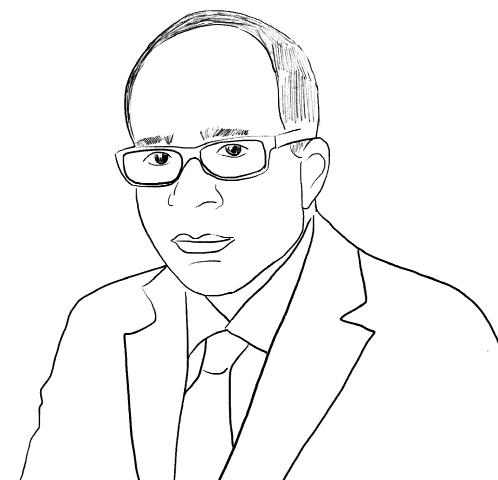
talents.
Universities are under a legal, moral, and pedagogical duty to take action against wrongful discriminatory conduct. But demands for mandatory DEI statements venture far beyond that obligation into territory that is full of booby-traps inimical to an intellectually healthy university environment.
By overreaching, by resorting to compulsion, by forcing people to toe a political line, by imposing ideological litmus tests, by incentivizing insincerity, and by creating a circular mode of discourse that is seemingly impervious to self-questioning, the current DEI regime is discrediting itself.
It would be hard to overstate the degree to which many academics at Harvard and beyond feel intense and growing resentment against the DEI enterprise because of features that are perhaps most evident in the demand for DEI statements. I am a scholar on the left committed to struggles for social justice. The realities surrounding mandatory DEI statements, however, make me wince. The practice of demanding them ought to be abandoned, both at Harvard and beyond.
–Randall L. Kennedy is the Michael R. Klein Professor at Harvard Law School.
His piece is part of the Council on Academic Freedom at Harvard’s column, which runs bi-weekly on Mondays and pairs faculty members to write contrasting perspectives on a single theme
I can manage.” He was shot and killed by Hamas while bandaging a wounded partier.
Given Abu Ar’ar and Darawshe’s experiences, it is perhaps unsurprising that many Palestinian citizens of Israel feel a newfound sense of belonging to the state. A poll one month into the ongoing war found that 66 percent of Palestinian citizens of Israel support Israel defending itself against Hamas, and that their sense of solidarity and belonging to Israel is the highest it has been in 20 years.
It is an odd position, for campus activists to deny Israel’s very legitimacy while most Palestinian citizens of Israel have never embraced it so decisively.
When you are confronted with the plain-andsimple narrative of Israel favored by campus activists, I ask that you think of Abu Ar’ar. “Everyone who lives in this country must be one. Arabs, Jews. We must be one unit. We cannot let anyone infect us with hate,” he says. Peace in the Middle East will come thanks to people like him, not the Harvard students chanting, “From water to water, Palestine is Arab.” The tragic story of Israel and Palestine is not simple, and it serves nobody to pretend that it is. Only so many words can fit on a wall.
– Charlie A. Covit ’27, a Crimson Editorial editor, lives in Holworthy Hall.
OP-ED THE HARVARD CRIMSON EDITORIAL 11
APRIL 5, 2024
OP-ED
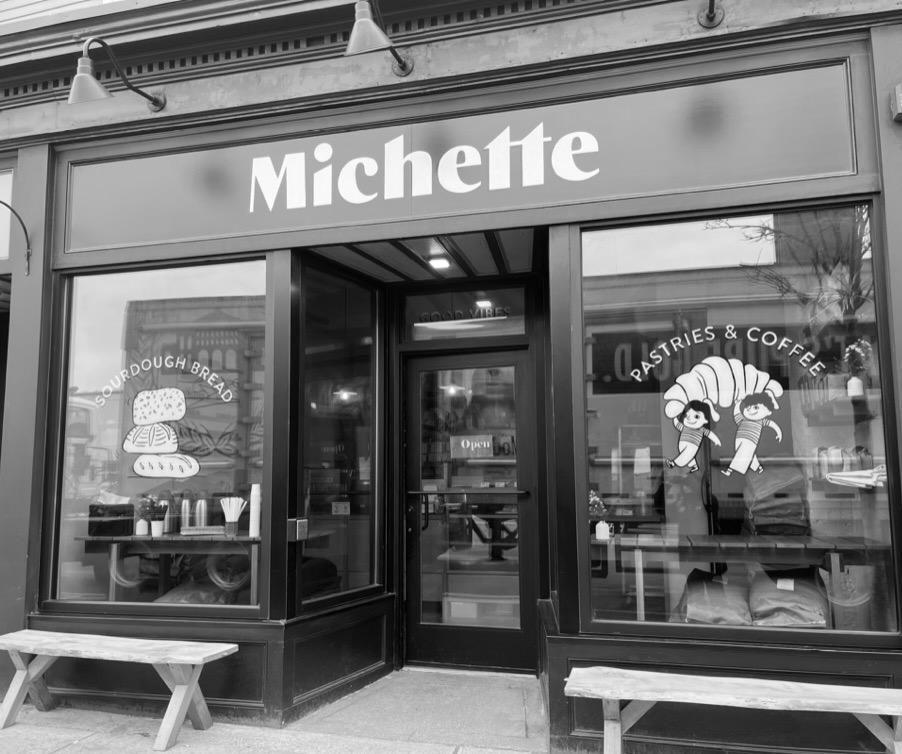
Michette Review: A Work in Progress
Michette, an upand-coming bakery on Broadway Street in East Somerville, boasts artisanal French goods that maintain a strong commitment to quality. Before the bakery opened a little less than one year ago, Michette was already “soft-launching” their products in the Somerville and broader Boston communities.
Run by Thomas Ferté — a former lawyer turned baker — Michette was born out of Ferté’s desire to leave corporate New York City behind and rediscover his roots from his “hometown boulangerie in France.”
From the walk to the bakery, it was apparent that Michette appears out of place in comparison to the many other establishments that better reflect the demographics of East Somerville — a neighborhood known for first welcoming Irish and Italian immigrants in the early 20th century, and Brazilian and Salvadoran immigrants from the 1970s onward. In the past
Ever since sailing on her first Disney Cruise at 16, Caitlin A. Beirne ’25 wanted nothing more than to be one of the performers aboard. Little did she know that right after her sophomore year of college, she would get the chance to do just that — and the story is nothing short of spectacular. Beirne’s love of music started early and was influenced heavily by her father, a member of the military who was deployed for the first five years of her life. Even so, he found the time to share his passion for music with Beirne. “Whenever he would come back from his trips, we would sing together and watch ‘American Idol’ together,” Beirne said. “The two of us in our family — we have a family of five — loved music and loved performing. Apparently, my parents say I was too shy to actually sing for other people.” As she continued to sing,
20 years, East Somerville — and Somerville in general — has begun experiencing gentrification, which many in the community blame on rising housing costs in Boston and MBTA expansions.
While Michette is certainly not the only — or even the largest — manifestation of gentrification in East Somerville, it was a detail that stood out. The storefront itself looks like it belongs in Brooklyn or Back Bay — with the name “Michette” in bold, white letters across a matte black background. Designs of stacked bread and cartoon people carrying a croissant decorate the windows. The well-designed exterior includes benches to accommodate the lack of indoor seating. Michette’s online menu currently only displays their drink options, and their Instagram account does not provide any additional information. It seems they only occasionally update followers on their special items; a daily pastry menu is unavailable.
Offerings included almond croissants, baguettes, canelés, focaccia with two different topping choices, jambon-beurre sandwiches, chocolate chip cookies, and banana bread. Al-
Beirne grew out of her shell, and eventually her love of theater fell right into place. Beirne joined her elementary school drama club, and there was no turning back from there as she fully immersed herself in the performing arts. “Sixth grade was when I really started being in a rehearsal every day, [being] in theater classes, and singing,” Beirne said. How Beirne ended up as part of the cast aboard Disney’s ship the Disney Wish, however, sounds like something straight out of a movie: She was scouted while singing karaoke. “I was singing in karaoke — probably singing ‘Part of Your World’ to be quite honest — and a music director for Disney just happened to be walking by,” Beirne said. The director heard her singing and proceeded to have a “mini voice lesson” with Beirne. “We sang together for an hour, through Disney stuff [and some] technique,” Beirne said. “We talked about possibly auditioning in
though Michette advertises their sourdough bread on their store window, website, and Instagram account, the bakery did not have any that day. It is clear that Michette is still a new establishment, and there are several logistical and operational obstacles to work out in order to standardize their production and advertisement of products. Right now, it appears that they are focused on having a small menu that they can execute well, demonstrating their commitment to quality with their baked goods.
The canelé — a small French pastry made with rum and vanilla — was their best pastry of the day. Canelés are notoriously difficult to make, consisting of a multi-day process that allows little to no room for error. Michette’s canelés are perfection — the outside is crunchy and caramelized, while the inside is custard-like and creamy.
One of two focaccias they offered, the focaccia with potatoes, rosemary, and gruyère is enjoyably salty and fluffy, and the rosemary adds a brightness and distinction on top of the heavy base of gruyère. It did seem that the gruyère pooled in certain cavities of the focaccia, indicat-
the future, and he was optimistic that things might go well. And I said, okay, well, let me try.”
Beirne’s career as a Disney Cruise Line performer seems meant to be, as Beirne just so happened to be in New York the same weekend of the professional audition — her Theater, Dance & Media class was on a trip in the city then. All she had to do was figure out how to stay in the area for one more night and get to the audition the next morning. After a six-week-long audition process, Beirne made it to callbacks and was offered the job in May 2022.
All the pieces were falling into place, and Beirne was about to live her dream. However, the process to prepare for the upcoming performances were grueling. To get ship-ready, Beirne spent ten weeks in Toronto rehearsing before finally moving aboard the Disney Wish.
“I lived on a ship for eight and a half months,” Beirne said. “I was performing around 13 to 14
ing that the cheese was cubed instead of grated on top — a detail that would have ensured a more equal distribution of cheese in every bite. Additionally, it would have been better served toasted, as the potatoes were soft and didn’t add much in terms of flavor or texture.
An unfortunate detail of the focaccia was that a small amount of egg, seemingly from the adjacent baking of the other focaccia, the breakfast-style focaccia, had made its way into the slice. The egg contained ham, which poses issues to those who don’t eat meat for dietary or religious reasons. This does highlight a broader concern of crosscontamination, raising the question of whether Michette is safe for people with allergies — which, at the moment and for non-severe allergies, the answer seems to be a cautious yes. Michette’s baguette was fresh and standard — on par with other boutique bakery baguettes but better than an average grocery store baguette. Crunchy on the outside and well-structured on the inside, it is durable enough to last for a few days. The almond croissant was very sweet and a little dry, although the filling
shows a week — and I absolutely loved it. If I could go back tomorrow, I would.”
One of Beirne’s favorite shows to perform was “The Little Mermaid,” in which she played Flounder. This was a full-circle moment for Beirne, whose favorite Disney song is “Part Of Your World.” She had even played Flounder in a production put on by her regional theater when she was in the eighth grade. Not only that, but for her performance on the cruise, she learned an entirely new skill — puppeteering. “I never in my life thought I would get to puppeteer,” Beirne said.
Beyond expanding her repertoire on stage, the time that Beirne spent on the Disney Wish helped develop her leadership skills. While on the ship, Beirne served as the vocal captain for her team, graduated from the Disney Emerging Leaders Program, and was a Disney trainer. Each of these opportunities provided Beirne with room to grow
alleviated the dryness and introduced some moisture. The croissant was crispy but not necessarily flaky, suggesting an improper lamination of the dough. Lastly, Michette’s matcha was nothing to write home about, but it does provide something warm on a cold day. Although the lid was secure, the to-go cup still leaked multiple times — causing a bit of a mess. Michette is a promising upand-coming bakery with the potential to be great. There are some clear logistical kinks to work out, such as the website, Instagram, in-house issues, and standardization of baked goods. There is also the question of how Michette will interact with the East Somerville community. Will they become a local favorite, or will they only attract customers traveling in from surrounding areas? While the bakery still needs some time to come into itself as a company and brand, Michette is a solid option for those willing to go the distance.
as an individual and develop lifelong skills.
Beyond her commitment to musical theater, however, Beirne also participates in the Air Force ROTC and is enrolled in the Harvard-Berklee Dual Degree Program.
“I loved having the experience. And also, taking things that you learned in theater class and things you learn at Berklee — not just textbooks, but music classes — and then putting it into real life was really exciting to see,” Beirne said. Beirne’s enthusiasm for new experiences has not waned. At Harvard, she’s just finished a run as Rona Lisa Peretti in the “The 25th Annual Putnam County Spelling Bee.” Despite her vast experience as a performer, she continues to find new ways to push herself and explore new arenas. “I hadn’t really played a role like Rona before with as much improv, [and the] type of singing was a little bit new to me — not
entirely, but not my most favorite. So it was a challenge, but I really loved the challenge. I felt like I grew so much from that part,” Beirne said.
In a way, Beirne’s
APRIL 5, 2024 THE HARVARD CRIMSON ARTS 12 CULTURE
character in “Spelling Bee” — a nurturing and encouraging host who sees the potential in kids, even as they flounder — is a particularly apt casting that reflects Beirne in real life. One of her favorite parts of the Disney Cruise was interacting with kids. “I love working with children,” Beirne said. “[I am] hoping to inspire younger generations into getting into theater and storytelling. That was one of my favorite parts overall. Seeing the faces of little children light up was incredible.” Beirne has proved that you can do anything you set your mind to and that “dreams really do come true.” Hearing about everything she’s done and the way she sees the world, one cannot help but be infected by her optimism. Artist Profile: Caitlin A. Beirne ’25 is Living the Dream BY GILLIAN H. SELIG CONTRIBUTING WRITER BY GABRIELLE A. DAVID CONTRIBUTING WRITER 3.5 STARS The storefront of Michette Bakery in Somerville. COURTESY OF GILLIAN H. SELIG


Bite Try Prime Student for 6 months at $0 New members only. Terms apply. Amazon Music and Grubhub+ included with Prime. Sound
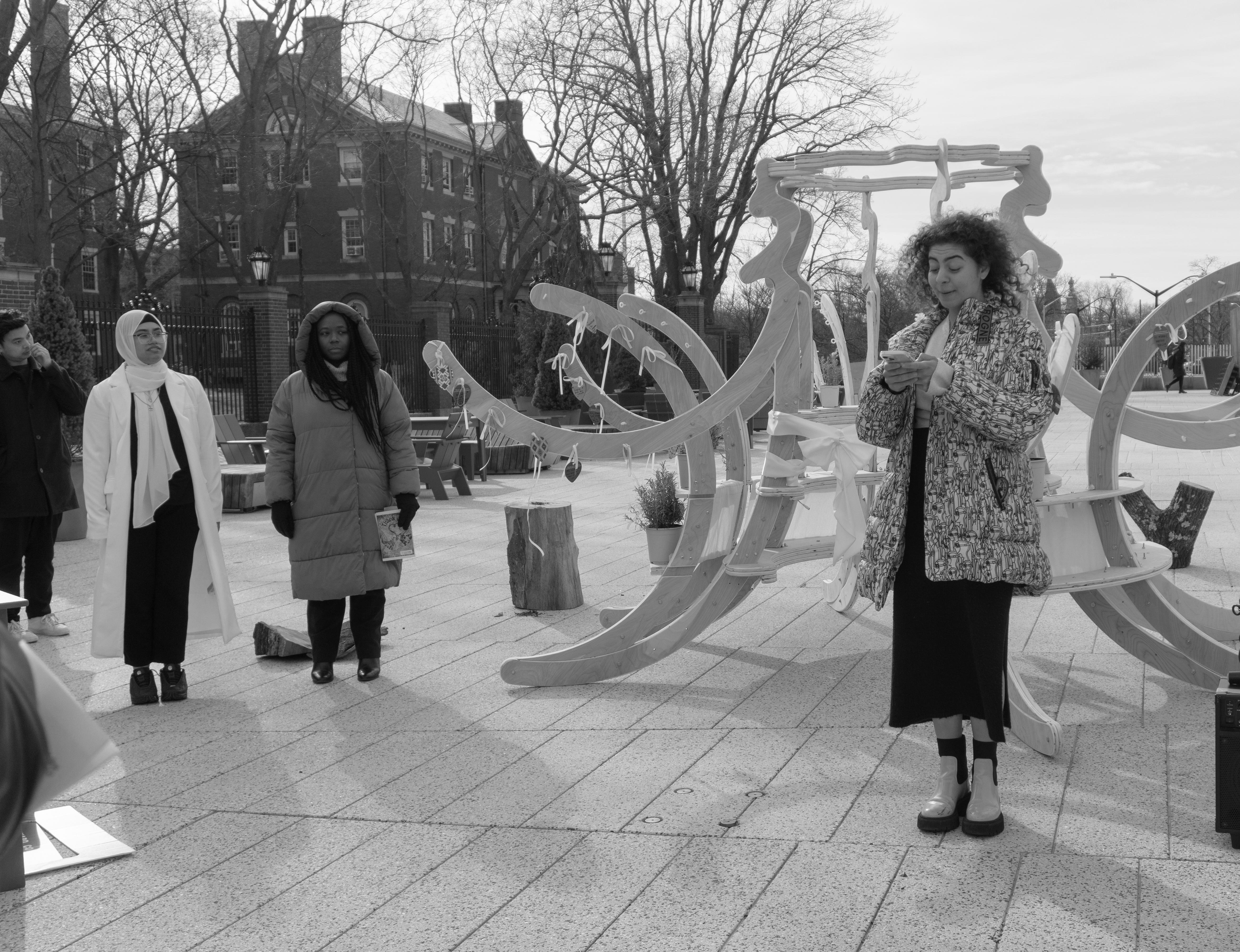
Acold Monday afternoon, a 3-D printed work of art, and the Science Center Plaza: a wonderful way to kick off Women’s Week. The 18th annual Women’s Week, organized by the Harvard College Women’s Center, commenced on March 25, filled with events dedicated to amplifying gender-expansive voices and presence on Harvard’s campus. This year’s theme was “Rooted/Roots,” after which a sculpture was unveiled in conjunction with the week’s title.
The Harvard College Women’s Center is dedicated to creating a welcoming community that encourages “an intersectional approach to equity work.” This year, thanks to collaboration between students at the Graduate School of Design and Harvard College, “Rooted” was unveiled — the first time the Harvard College Women’s Center has had a sculpture on display in honor of Women’s Week. “Rooted” is a simple masterpiece. Taking the form of a tree, the 3-D printed body is adorned with reclaimed wood and cardstock taking the shape of leaves.
The tree’s leaves, containing colors and patterns from cultures around the world, are reserved for responses to questions such as, “Who are some women in your life that keep you rooted?” Event attendees were encouraged to hang a leaf, but the sculpture is open for additions as the Harvard community continues to grow the tree.
The tree’s supports also act as shelving for potted plants, bringing life into a (wo)man-made tree. Moreover, the tree mimics the logo of the Harvard College Women’s Center, reinforcing the theme of the week and the people who made it possible. A tree certainly symbolizes the hope for the growth of the Women’s Center and their mission, but the inclusion of leaves that must be written on and attached by individuals puts this sense of collectivity and community into practice. With its rebranding in 2006, the Harvard College Women’s Center has fought to create not only a safe space, but also a celebratory space for women and gender-expansive people. “Rooted” was a tangible manifestation of these efforts.
Women’s Week co-chair Jana Amin ’25 said that the sculpture has been in the works for nearly five months, but she noted that
she was most excited for the attention the sculpture would garner beyond its unveiling.
“Today we’re just going to get as much traffic as possible and introduce people to the Women’s Center’s mission and vision,” Amin said.
Women’s Center undergraduate intern and artist Olivia F. Data ’26 shared Amin’s sentiment, noting that while Harvard students are “notorious” for their tight schedules, many were present for the unveiling.
“To come at 4 p.m. for the first event and see people already there was kind of surprising to me,” Data said. “There are a lot of faces here that I don’t recognize, and it’s really cool to know that we’re expanding our community.”
However, as someone interested in the “intersection between art and activism,” Data noted that there is more work to be done — both in terms of Women’s Week programming and on a larger scale.
Dulce M. Gonzalez Arias ’26, another Women’s Center undergraduate intern, created a zine overflowing with poetry and paintings from women across campus. This “labor of love” was a project Gonzalez Arias had in mind well before preparing this week, and she noted her excite -
ment and amazement at the myriad of works submitted.
“There are so many creatives here that I feel like are not getting enough attention,” Gonzalez Arias said. “I was really proud to be able to feature them in the zine, especially during Women’s History Month and for Women’s Week.”
Pin Sangkaeo, a student at the Harvard Graduate School of Design, noted the importance of uplifting women of all identities, pointing out that Harvard “owes minority communities.” Having moved across the country to study at Harvard, she further discussed how tricky it can be to navigate new spaces like Harvard while so far removed from one’s prior roots.
While just one work of art, the sculpture brought together countless creatives finding their roots amongst each other despite being so far from the original places they call home.
For Gonzalez Arias, “Rooted” has a flexible meaning that “changes everyday,” but for now, the strength of community roots her. “Being grounded in each other’s presence is a very healing and a very euphoric thing,” she said.
Data said it’s the “constants you have” that become one’s
roots in discouraging times. For Data, art is such a constant. Sangkaeo played an integral part in seeing the sculpture through to fruition. To her, this experience embodied the theme of “Rooted.” “Especially at Harvard, I feel like people are so passionate about what they do,” Sangkaeo said. “Then you can keep pushing each other to go forward.” Interim Harvard College Women’s Center director Bonnie Talbert described the process of the sculpture unveiling as “collective and participatory art.” “A lot of people think of art as this great pinnacle of individual creativity,” Talbert said. “But it’s something that, in addition to being very unique, people can also share.”
Beyond the fact that the sculpture took many people to design and produce, the unveiling and programming were made possible by the partnership and dedication of women from around the world who have been brought together by Harvard’s campus. The women of the Harvard College Women’s Center and the Harvard community will remain rooted in the journey they embarked on together through the sculpture and programming of “Rooted.”
The graphic novel “So Long, Sad Love” masterfully captures themes of personal evolution, the intricacies of relationships, and confronting past traumas to deeply resonate with the lived experiences of many. Mirion Malle, the author, doesn’t just tell a story — she holds up a mirror to the complexities of life as we know it. The book delves into the journey of self-discovery, particularly in the aftermath of toxic relationships. The characters’ grappling with the nuances of their
The narrative of “So Long, Sad Love” unfolds in a manner that mirrors the unpredictability and complexity of real life. Malle doesn’t present a straightforward, linear story — instead, she offers a narrative that ebbs and flows with the randomness and chaos that often characterize human relationships. This approach, while deeply engaging, might leave readers feeling somewhat adrift as new characters and plot twists appear without much preamble. However, this slightly disorienting storytelling method also effectively reflects the main
paramount. At the heart of the story is Cléo, a character whose journey showcases the tumultuous path of self-discovery and personal growth. Malle meticulously crafts a relatable and multidimensional character through Cléo. As the narrative progresses, Cléo’s evolution is evident as she transforms from a woman entangled in a toxic relationship to someone who takes bold steps toward self-liberation and finding her true self. Her character embodies the struggles that many face in finding their voice and place in a complex world.
character’s journey through a tumultuous period of her life. The pacing of the story sometimes feels erratic, mirroring the ups and downs of Cléo’s emotional state. In one moment, readers are catching up with old friends in a comfortable setting, and in the next, readers are thrust into the midst of deep-seated drama and revelation. The way the book introduces new characters like Farrah, whose past reveals the enduring impact of former relationships on the present, also contributes to the overall pacing of the story. The characters’ sudden appearances and the slow reveal of their backstories add layers of intrigue and complexity. Other side characters who add to the story include Syham and Marisol. Syham, as Cléo’s best friend, brings a feminist perspective to the story and represents the strength found in the supportive friendships that are crucial for navigating life’s challenges. Marisol, symbolizing new beginnings and hope, enters Cléo’s life as a symbol of her potential for happiness and
fulfillment post-heartbreak, offering a chance at a deeper connection built on respect and understanding. However, these sudden appearances can also lead to moments of confusion as readers may become lost in a maze of narratives. Despite these challenges, the narrative structure serves a purpose: It encourages readers to focus on the journey itself, rather than just the destination. Experiencing the myriad of emotions and encounters that shape Cléo’s path resonates with anyone who has had to navigate the often non-linear path of personal growth and relationship dynamics. The emotional landscape of “So Long, Sad Love” is as varied and intense as the narrative itself. From the onset, Charles’s character evokes strong discomfort and disdain. The moments where Charles’s true nature surfaces — his manipulative tendencies, disparaging remarks, and stalker-like behavior — trigger a palpable sense of frustration as readers watch Cléo navigate their relationship.
Malle’s ability to evoke such raw emotion in the reader speaks to the power of her storytelling. On the flip side, the sense of relief and triumph when Cléo finally breaks free from Charles is almost cathartic — a testament to the resilience and strength that characters and people can find within themselves in the face of adversity. This narrative turn feels more than just plot development — it feels like a personal victory for readers, especially those who have had similar experiences. The novel’s graphic style is distinctive, marked by its expressive line work and thoughtful use of color. Malle’s illustrations capture the nuances of the characters’ emotions, making moments of joy, tension, and sorrow palpable.
14 BY MADELYN E. MCKENZIE CONTRIBUTING WRITER BY RACHEL A. BEARD CRIMSON STAFF WRITER
Long, Sad
relationships reflects a powerful theme: the struggle to find one’s identity and voice in the face of manipulation and control. This narrative speaks volumes about the importance of self-awareness and the courage to seek change, themes particularly relevant in an age when personal autonomy and selfrespect are
‘Rooted’: The Women’s Center’s Masterpiece ARTS
‘So
Love’ Review: Heartbreak and Healing
The way she portrays characters like Cléo and Charles offers visual insights into their personalities and states of mind. For instance, the stark contrasts in the artistic shading when depicting Charles emphasize his ominous presence in Cléo’s life, while the brighter, softer panels centered around Cléo reflect her journey towards self-realization and liberation. The interplay between text and imagery in “So Long, Sad Love” is seamlessly executed. Malle’s ability to convey complex ideas and emotions through a combination of visual and textual storytelling is exemplary. Scenes where dialogue is minimal yet the imagery is rich and detailed invite readers to linger and interpret the silent but powerful communication between characters. This graphic novel is highly recommended for anyone interested in a story that does more than entertain, but challenges and resonates. The work is particularly suitable for readers who appreciate narratives that delve into the nuances of human relationships and personal growth. Whether you are well-versed in graphic novels or new to the genre, “So Long, Sad Love” offers a profound experience that lingers long after the last page is turned. ON CAMPUS rachel.beard@thecrimson.com LUCY H. VUONG — CRIMSON PHOTOGRAPHER THE HARVARD CRIMSON APRIL 5, 2024
WOMEN’S TENNIS
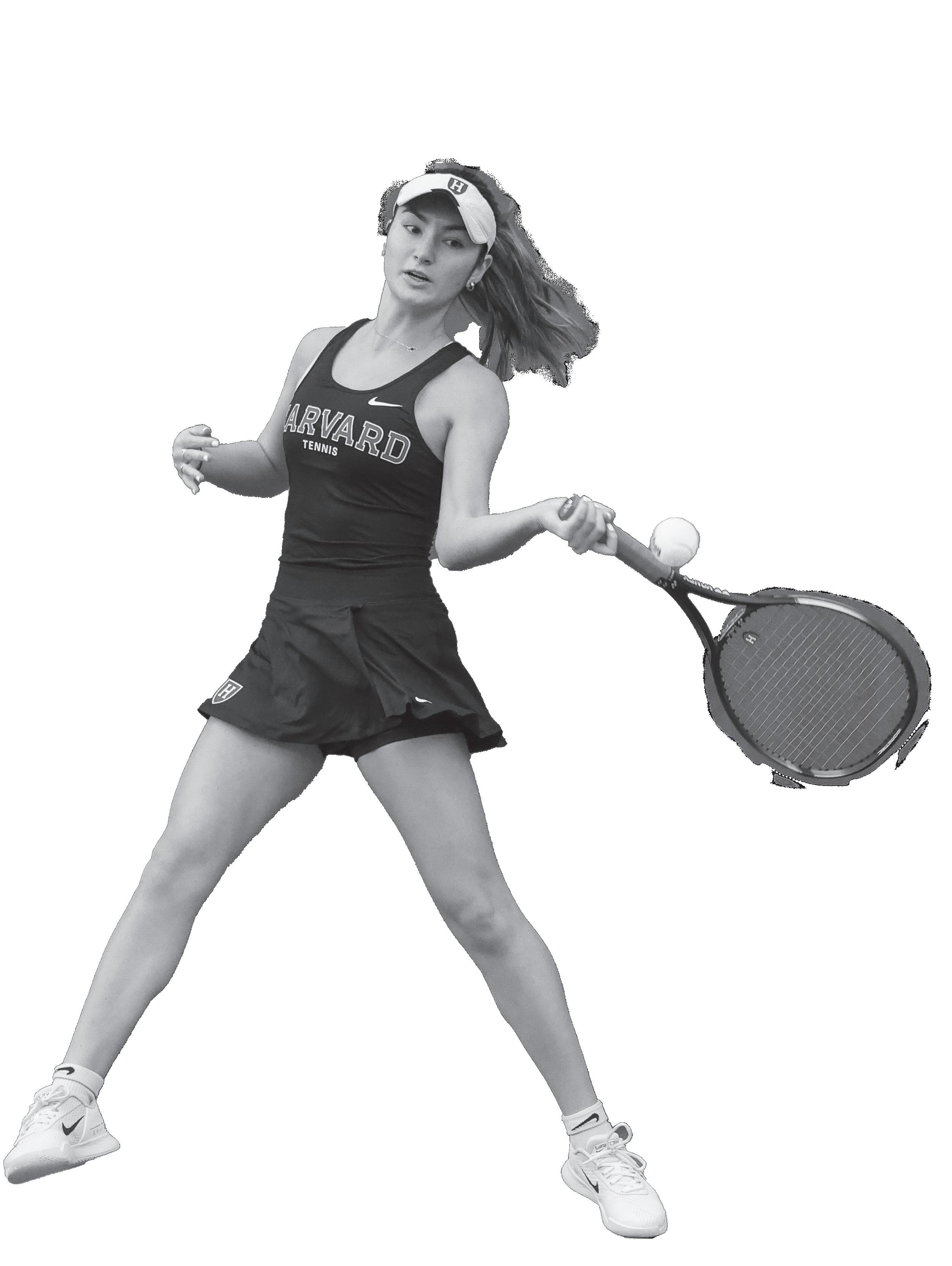
vard throughout the rest of the match. You cited the coaching staff, Green and assistant coach Khary Pryce as integral to the team’s phenomenal season showing. “Coach Green and Coach Khary have really been the glue to our team and making sure that we stay on task during practice. They really help us work on the little things and get us motivated and excited about the season ahead. So, a huge shout
out to them,” the junior said. “We just gotta keep going, keep the train running.” Freshman Elsie Ragatz echoed You’s sentiment about the influence of the coaching staff.“We also have such great captains this year in Angel and Rachel,” Ragatz said. “We have gotten so close as a team, and I think that energy that
you see on the court really transfers off the court. We have a great support network, and we really hold each other accountable, both and off the court.” Harvard carried its winning momentum into its singles matches, securing all three singles points in straight-set victories. Freshman Kate Kim swiftly
sealed the Crimson’s second win of the day, clinching the first singles point with her straight
set defeat of her Minutewoman opponent, 6-2, 6-3. Kim improved to 11-1 in dual action with her victory, earning her 21st win of the season and solidifying her lead in singles victories on the team. “Kate has been progressing very nicely here in her first year at Harvard,” Green noted. “She competes really well, and has been finding ways to problem-solve on court.” “Even on the days when things aren’t going her best, that’s what I’m most proud of when I watch her play,” Coach Green added. “It’s not so much the victories on Friday in New Haven. Also on the team’s agenda, from April 12 to 14, Harvard Women’s Tennis will host its 50th anniversary celebration, featuring a panel discussion, facilities tour, and Ivy matches against Cornell and Columbia. More information regarding the celebrations can be found on the Harvard Varsity Club website. A Dominating Performance Freshman Natalie Block hits a forehand in a match earlier this season. COURTESY OF HARVARD ATHLETICS emmadejong@thecrimson.com SPORTS 15 APRIL 5, 2024 THE HARVARD CRIMSON


Why us?
Develop into a company leader through hands-on learning and senior leader support
Learn to lead teams of people and own impactful work
Gain exposure to all areas of our business
Be rewarded with a total compensation that can range from $114,000 to $140,000
About Us
McMaster-Carr is a leading e-commerce company in the industrial supply space. We do everything in-house: Technology, Merchandising, Publishing, Customer Service, Distribution We hire curious, smart people who can learn, grow, and impact each area of our business. Learn more at mcmaster.com/careers.
APPLY NOW!
mcmaster.com/apply Only takes 5 minutes
Denote “On-Campus Recruiting” in the “How did you hear about us section”

Be curious. Be exceptional. Be rewarded. JOIN OUR LEADERSHIP TEAM! Undergraduate Management Development Program for Class of ‘24 We hire for capability and welcome all majors! Princeton, NJ Cleveland, OH Atlanta, GA Chicago, IL Los Angeles, CA
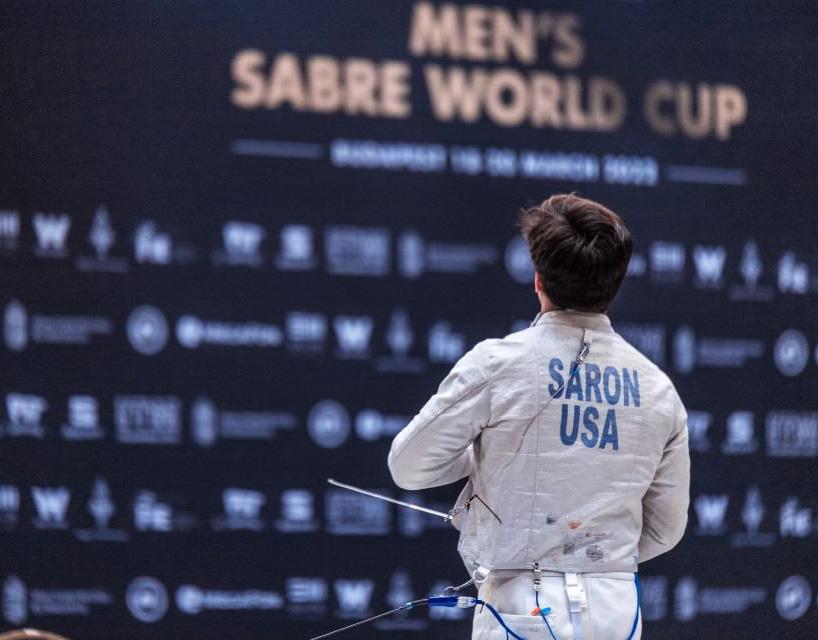
Dominant Harvard fencer Mitchell Saron ’23, who was a three-season standout for the men’s fencing team, is set to compete for the U.S. at the 2024 Summer Olympics in Paris.
Despite having taken a year off to train for his qualification, Saron’s immediate emotion was still shock. “It hasn’t really sunk in yet. It’s the Paris 2024 Olympic Games!” Saron said. “This achievement is a dream come true, one I’ve had since I was nine years old and first picked up a saber. I was lucky enough to attend the 2012 and 2016 Olympics to see the top saber fencers in action in real life. And now, it feels so surreal to have chased this dream and see it coming to fruition. Even after the official announcement, I think it’ll take about a week for the magnitude of this accomplishment to really register with me,” the soonto-be Olympian added. Saron’s tenure with the Crimson’s program was cut short due to the cancellation of the 20202021 season as a result of the
Covid-19 pandemic, but despite this setback, the fencer made the most of his time in Cambridge. Saron earned first-team All-Ivy honors three times, one firstteam All-American designation and one second-team All-American honor, as well as an individual NCAA title.
Since graduating, Saron has continued to dominate. He has proved successful on both the team and individual stages, with his most recent title coming last weekend after a victory at the Men’s Sabre World Cup in Budapest. “Most of my qualifying points were earned in the first half of the season, when I wasn’t battling injuries,” Saron explained. “The final qualifying tournament of the season in Budapest at the end of March was a big one since it’s an Olympic year. Every fencer there understood the stakes, and you could see the hope and anxiety in the air. When I mathematically qualified for Team USA — as in, I had enough points for no other USA fencers to pass me in the rankings — it was a mixture of relief and excitement. Those feelings really drove me in the final team event the next day, when Eli, Colin , Filip , and I were able to win gold for Team USA together. It was incredible,” Saron added, referring to past and future Crimson fencers Eli Dershwitz ’19, Colin Heathcock ’28, and Filip Dolegiewicz ’23.
But, that success came from huge dedication. Saron had
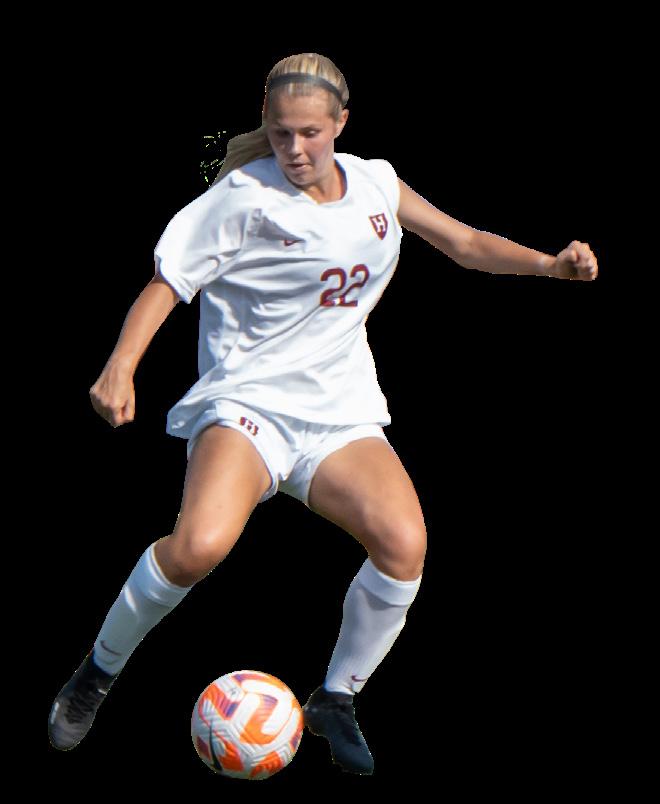
to completely change his attitude, diet and lifestyle. After his senior year, Saron stopped drinking alcohol and switched to a diet that emphasizes grassfed and wild-caught animals as well as fermented vegetables. Since Saron was also fencing and working out every day, he also emphasized recovery strategies such as breath work, ice baths, the sauna, and focusing on his mental health.
“Each of these changes required discipline, research, and a willingness to listen to my body’s responses,” Saron said of this lifestyle overhaul. “The improvements in my performance, mental clarity, and overall health have been huge. All of these changes took sacrifice, but it’s been more than worth it. This holistic approach to training and recovery not only prepared me for competition but has also fundamentally transformed my approach to health and wellness. I’m literally changed forever thanks to this Olympic journey,” he added.
Even with all the sacrifice, there was a point where Olympic qualification looked unattainable. Plagued by injury, Saron was unable to compete for the US team in the international tournament last November in Algeria.
“The thumb injury on my fencing hand was the most significant setback, especially because as it turns out, you really need your thumb to handle a saber,” Saron said, explaining how significant of a setback he faced.
“After consulting with doctors and reviewing the MRIs of my thumb, I was advised against fencing not only because I was debilitated, but there was a serious risk of permanent damage. I was so frustrated. Given the stakes and potential of an Olympic qualifying year, my orthopedic surgeon offered me a challenge: to continue fencing without using my thumb at all,”
the end of 2023, I had managed to lead in the USA points-wise.” But, despite leading the USA in points, Saron still was not feeling 100%.
“It wasn’t until the Team Event in Budapest – where I mathematically qualified for the Olympics – that I truly began to feel like myself again when fencing. Winning the gold medal with the team was a great testament to finally being in fencing shape after so many months. I was finally back,” Saron said, looking back on his triumph at last week’s team event in Hungary. In the immediate future, Saron continues to focus on his recovery, training and mental health. He has three tournaments until his Olympic qualification: Salt Lake City in April, and the Seoul Grand

Saron added.
Instead of giving up, the New Jersey native continued to fence, adapting to his injury. “My coach and I developed a technique that involved holding my saber like a tennis racket—that’s not how you’re supposed to hold a saber, but this is what we had to work with. The adjustment meant I had to strengthen other aspects of my performance, like my footwork and speed, which was a blessing in disguise. I secured a 3rd place finish at the National Tournament in December and a 20th place at the Grand Prix in Orleans. I was really proud of this, given my compromised state. Despite the challenges, by
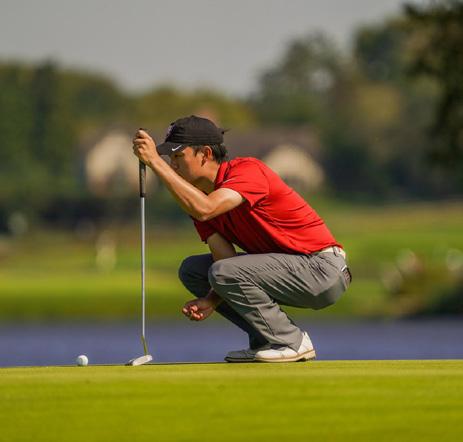
Prix and Madrid World Cup in May. “This period leading up to the Olympics is about fine-tuning every aspect of my preparation — physical, mental, and technical — to ensure I arrive in Paris in the best shape possible, ready to compete at the highest level with my team and
every
re
the Olympic dream.” Catch Saron and the rest of the Olympic fencers square off between July 27
August 4 in Paris, France. Saron representing Team USA at Olympics WEEKLY RECAP SCORES WOMEN’S TENNIS VS. UMASS W, 4-1 LACROSSE VS. MERRIMACK W, 18-4 SOFTBALL VS.BROWN W, 3-0 RUGBY TROPICAL 7 S CHAMPIONSHIP 1ST MEN’S BASEBALL VS. BOSTON COLLEGE L, 9-17 VOLLEYBALL VS. PENN STATE L, 1-3 TENNIS VS. TUFTS W, 6-0 LACROSSE VS. VIRGINIA L, 10-13 Mitchell Saron ‘23 Former Crimson fencer This achievement is a dream come true, one I’ve had since I was nine years old and first picked up a saber. “ Mitchell Saron reached the highest heights in fencing for the Crimson. Now, he’ll represent the U.S. in Paris this summer. GÁBOR CSAPÓ — CRIMSON PHOTOGRAPHER OLYMPICS. Mitchell Saron, a Crimson standout during the past three years, is heading to Paris this summer with Team USA after a grueling journey. BY KATHARINE A. FORST AND THOMAS HARRIS CRIMSON STAFF WRITERS katharine.forst@thecrimson.com thomas.harris@thecrimson.com GAMES TO WATCH THIS WEEK FRIDAY 4/5 Men’s Tennis VS. Yale 3 p.m., Beren Tennis Center SATURDAY 4/6 Men’s Heavyweight Rowing VS. Cornell 7:10 a.m., Charles Rivder SATURDAY 4/6 Men’s Volleyball at No.16 George Mason University 4 p.m., Fairfax, VA SATURDAY 4/6 Women’s Lacrosse VS. Cornell 12 p.m., Jordan Field Men’s Lacrosse VS. Dartmouth 3:30 p.m., Jordan Field SUNDAY 4/7 Women’s Softball VS. Princeton 12:30 p.m., Soldiers Field Women’s Tennis VS. Brown 1 p.m., Beren Tennis Center APRIL 5, 2024 THE HARVARD CRIMSON SPORTS 17 FENCING READ IT IN FIVE MINUTES The Harvard wrestling team (4-6) wrapped up its competitive 2023-24 campaign with a strong showing at the NCAA Wrestling Championships in Kansas City, Mo. Junior Diego Sotelo scored an upset win in the first round, but fell to his second-round opponent. Senior Ivy League Wrestler of the Year Phillip Conigliaro and sophomore Jack Crook put up good perfomances but did not manage to overcome their first-round opponent. WRESTLING AT NCAA CHAMPIONSHIPS The Harvard men’s golf team competed in the Cutter Creek Intercollegiate in Snow Hill, North Carolina, placing sixth in a competitive field of 15 teams. With a combined score of 866, shooting two-over-par, the Crimson demonstrated resilience and skill in its penultimate regular season tournament. Senior captain Brian Ma, junior Jeff Fang, and freshman Jonathan Hartono led the Crimson team with stellar performances. The team takes on the other Ivy League teams at Princeton this weekend. MEN’S GOLF SHINES AT CUTTER CREEK The Harvard baseball team (4-16, 2-4 Ivy) returned to Massachusetts to face off against Brown (7-14, 2-4 Ivy) in the Crimson’s home opener last weekend. On Saturday, the Crimson took one-of-two games in their doubleheader at Boston College’s Eddie Pellagrini Diamond. The Crimson returned to its home O’Donnell Field on Sunday for its official home opener and lost the rubber match to drop the series. BASEBALL LOSES SERIES TO BROWN
to honor this oncein-a-lifetime opportunity. Every training session, every meal, every recovery protocol, and
tournament is a step towards
alizing
and


$10 off your next 10 meals Disclaimer: Terms apply. Offer expires 05/31/24. Taxes and fees still apply. Limited to $10 off next 10 orders, no minimum basket. Exclusions may apply. See app for details. ORDER NOW Use promo code: EATSCOLLEGE24






























































